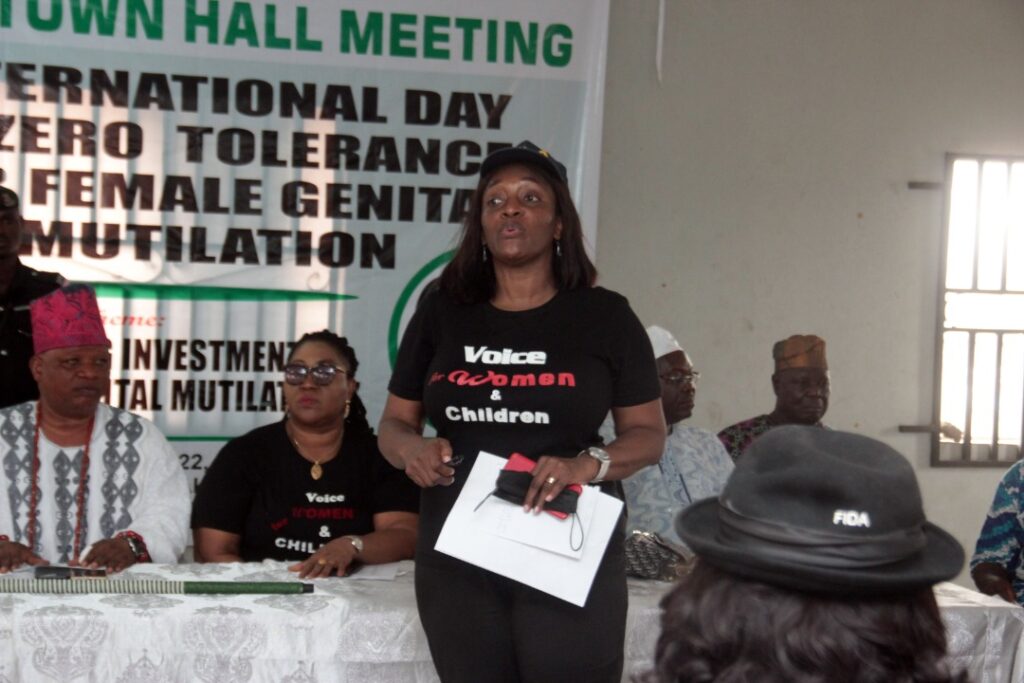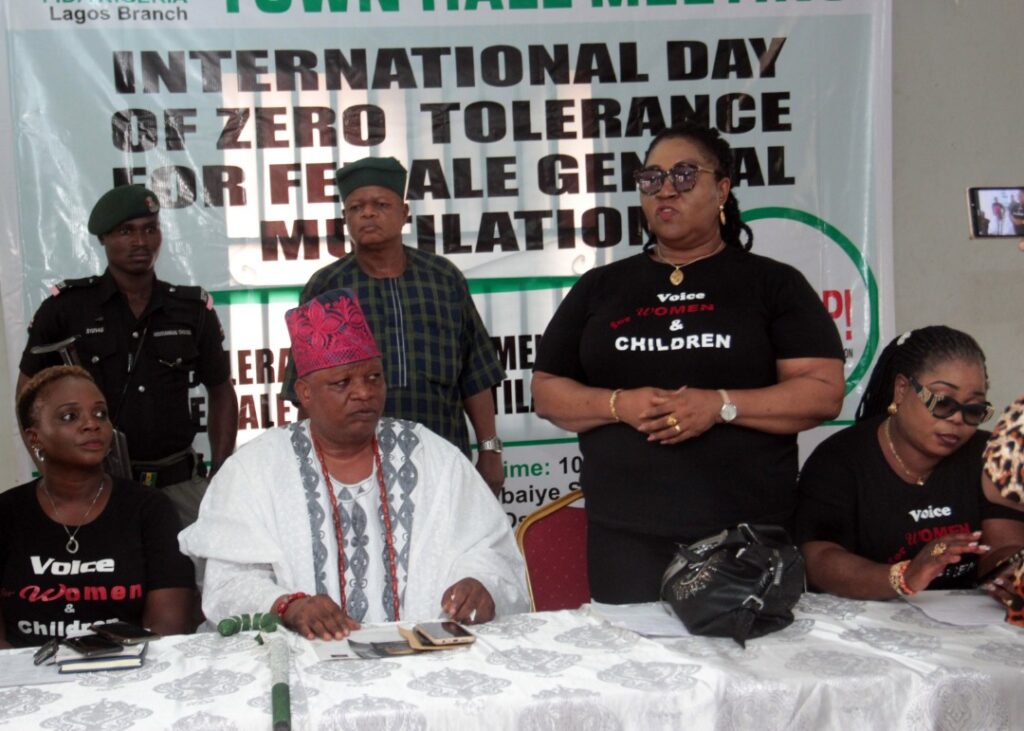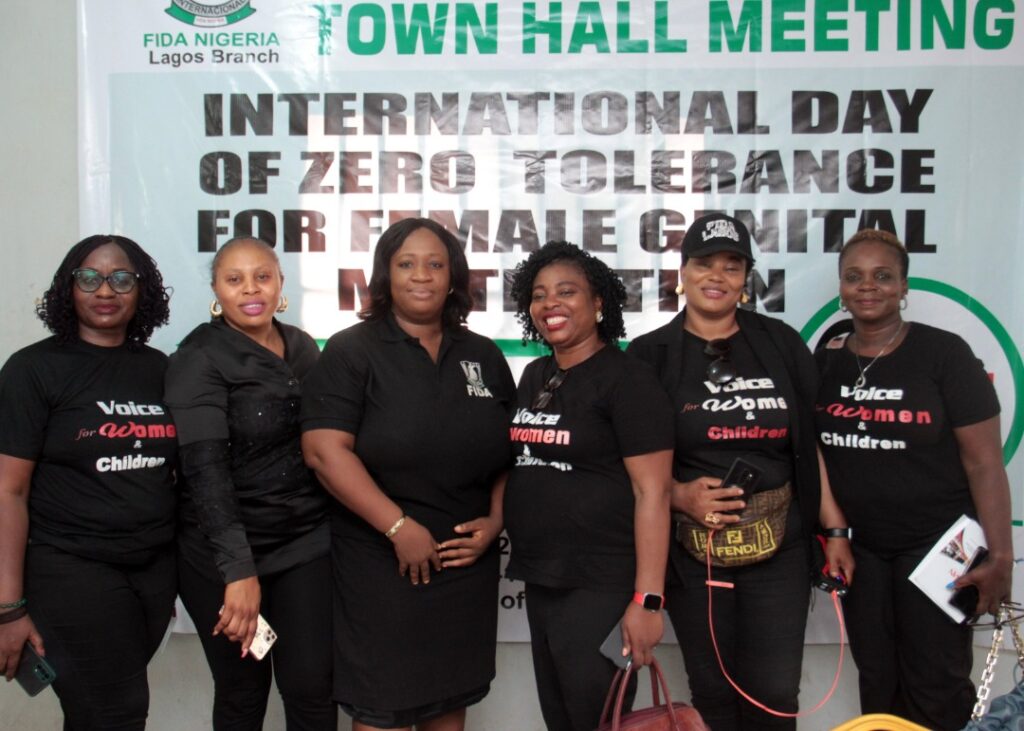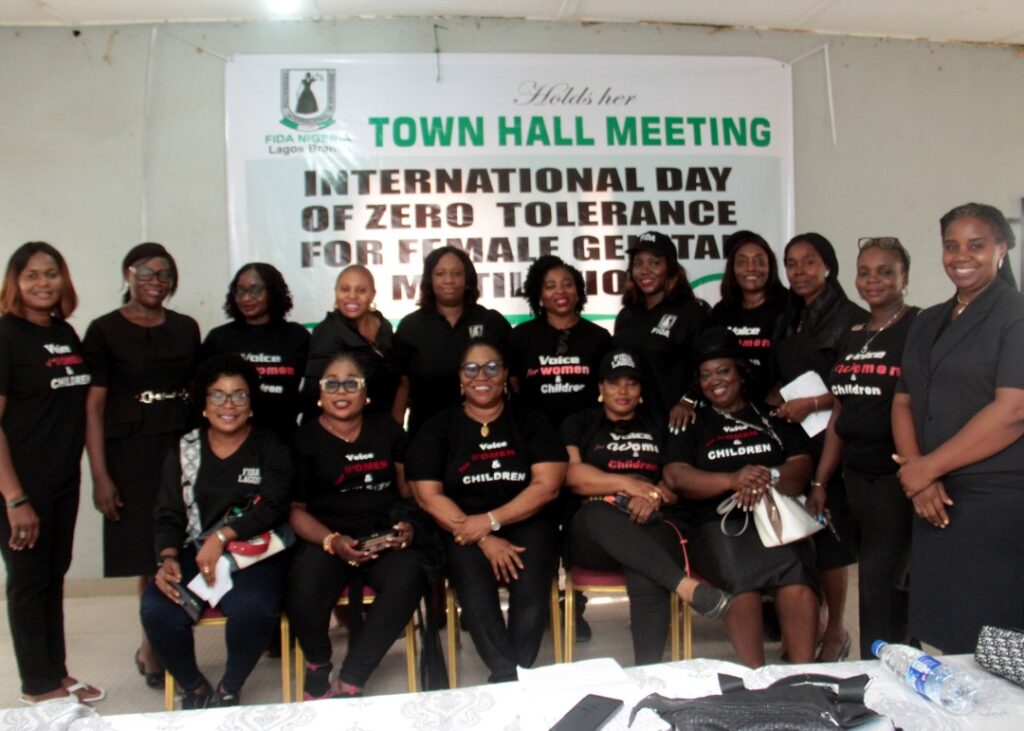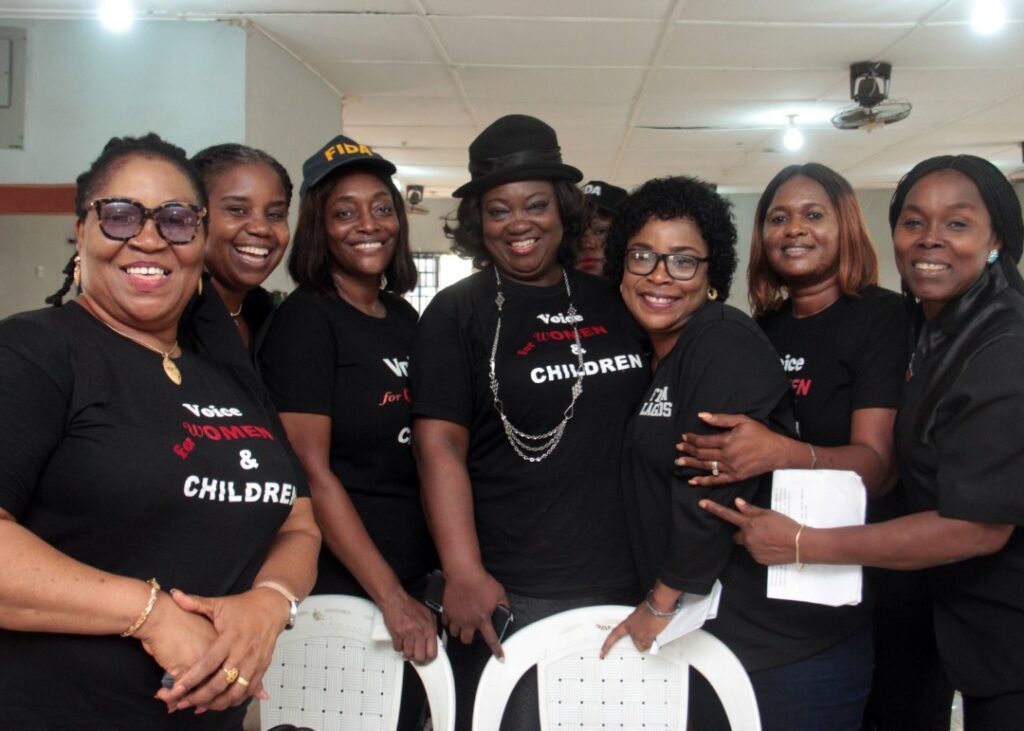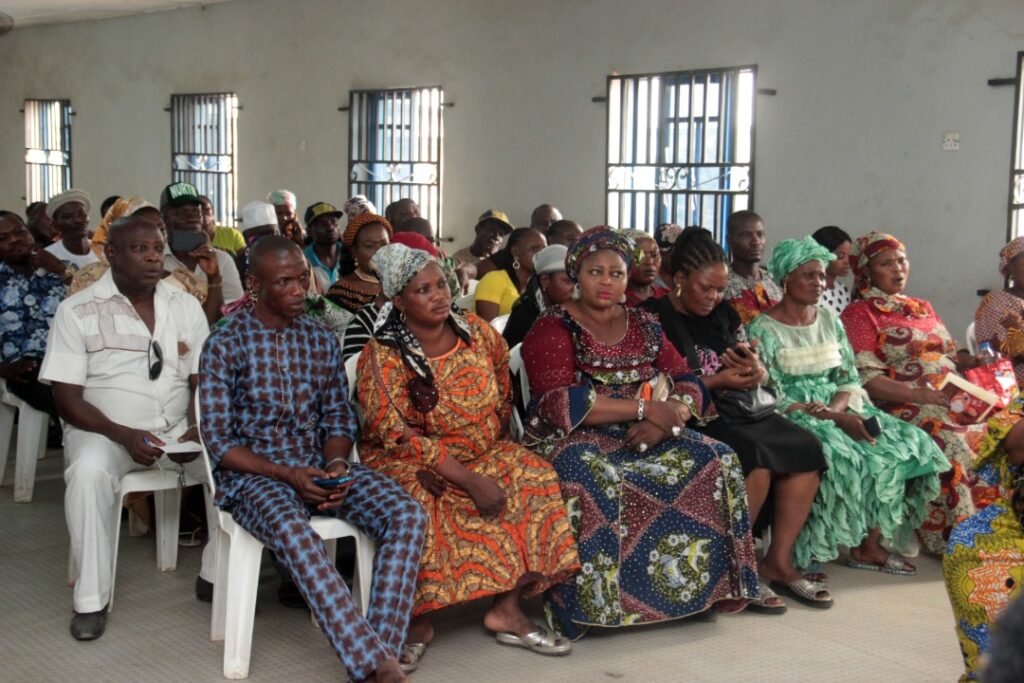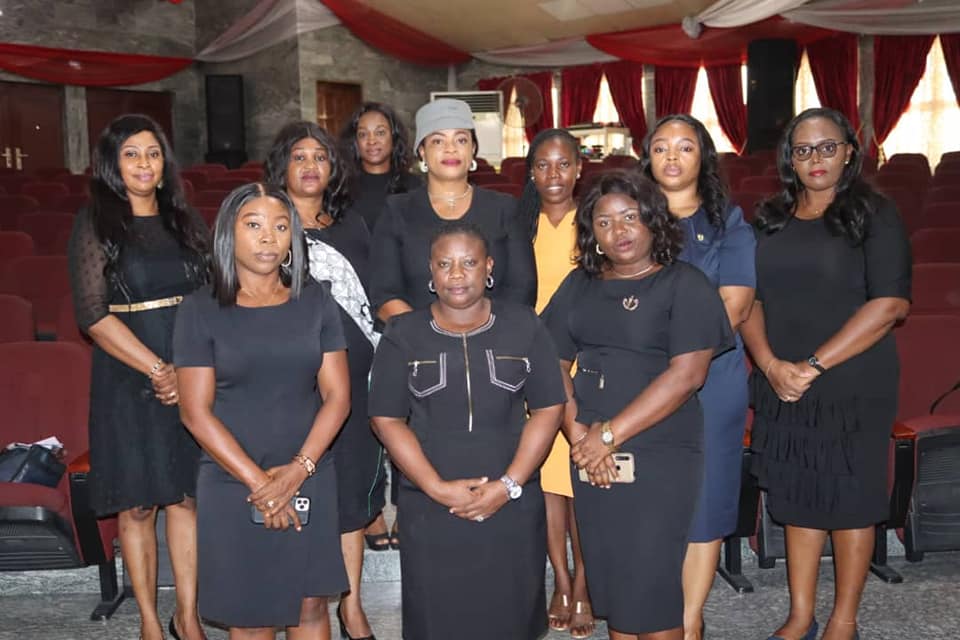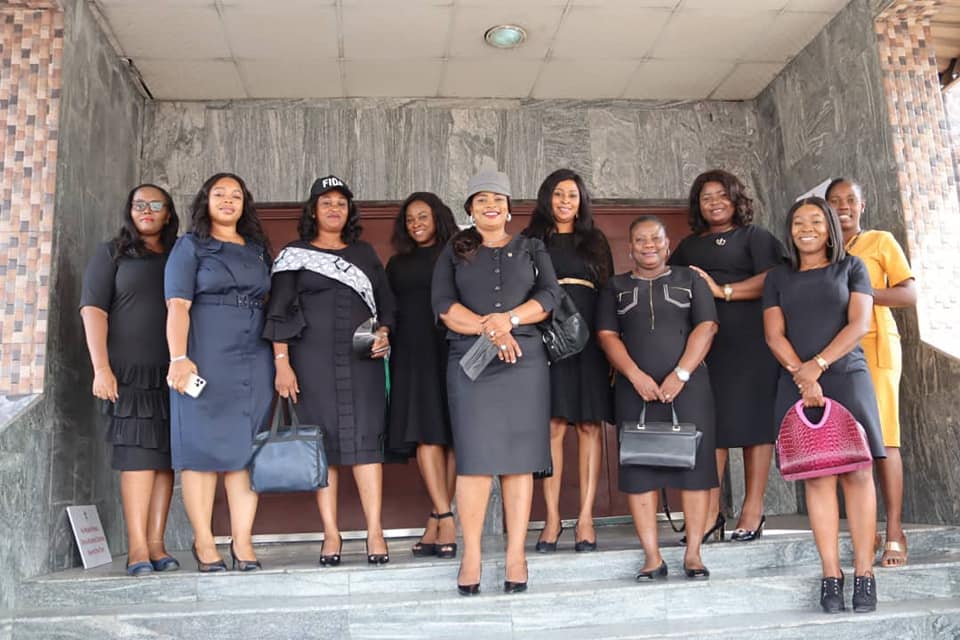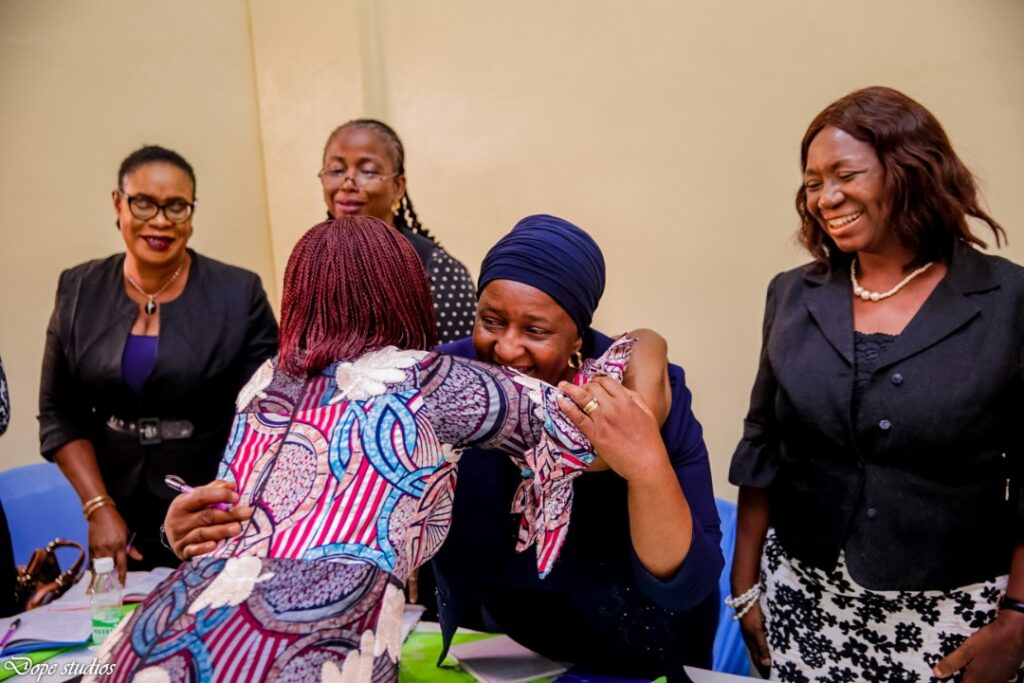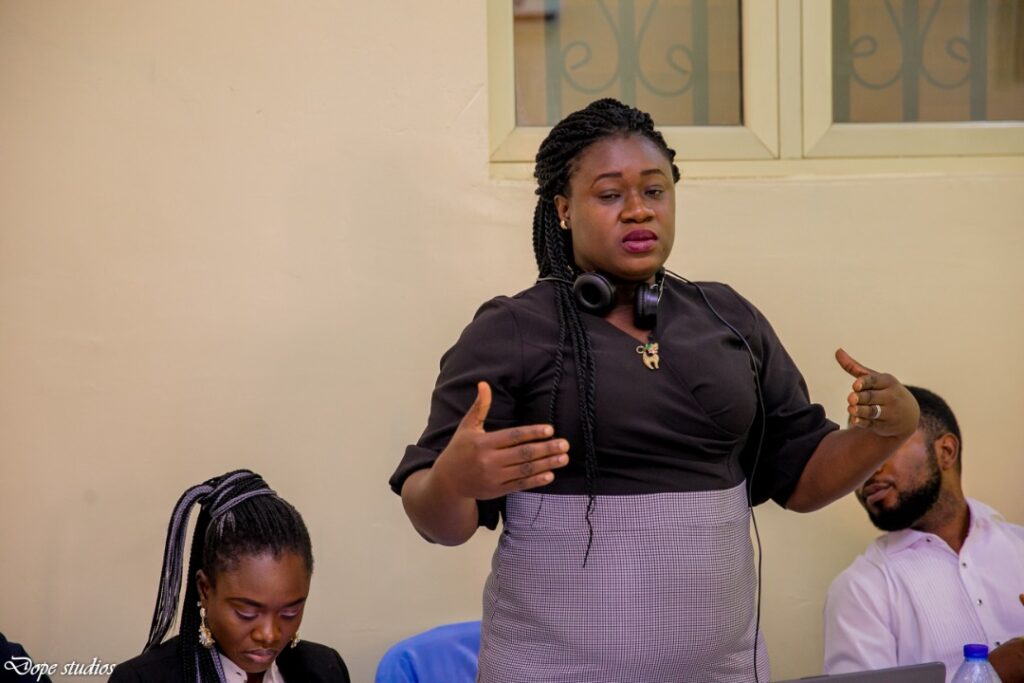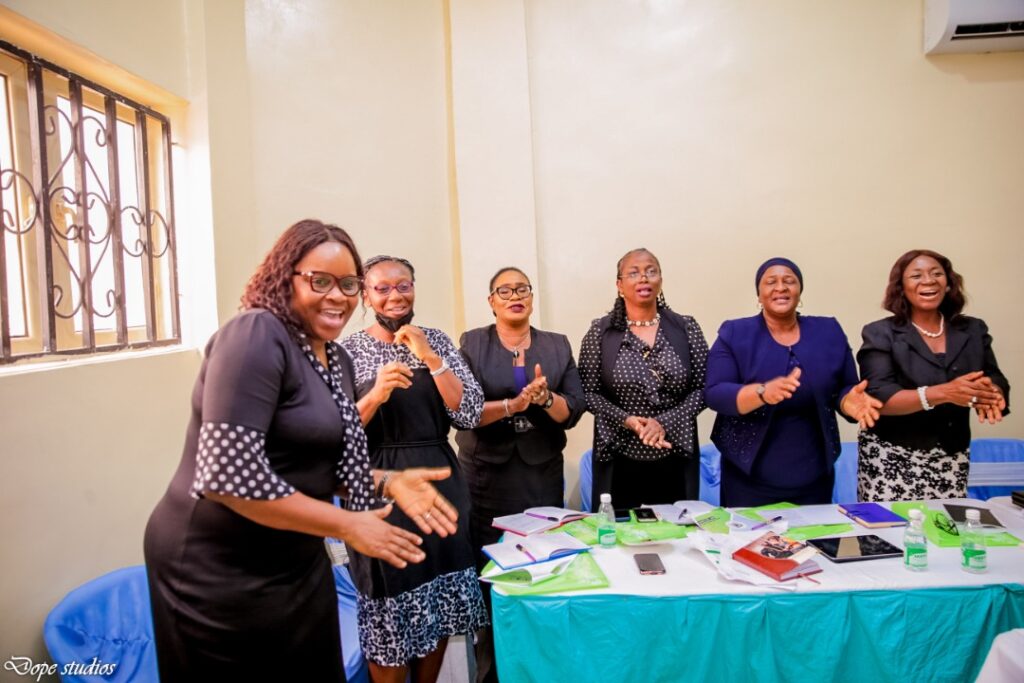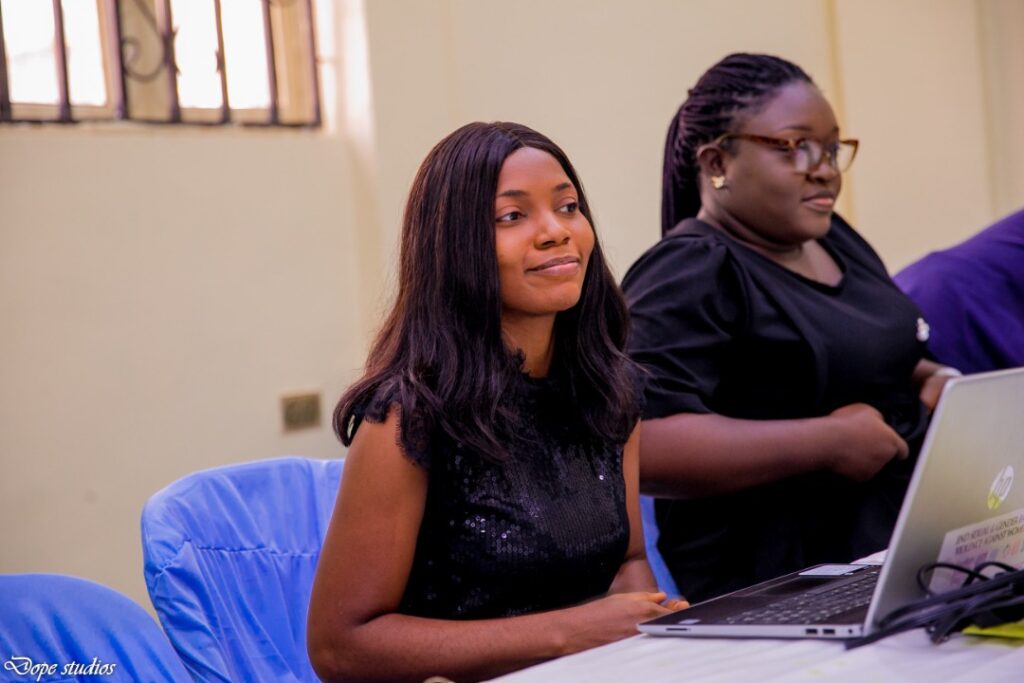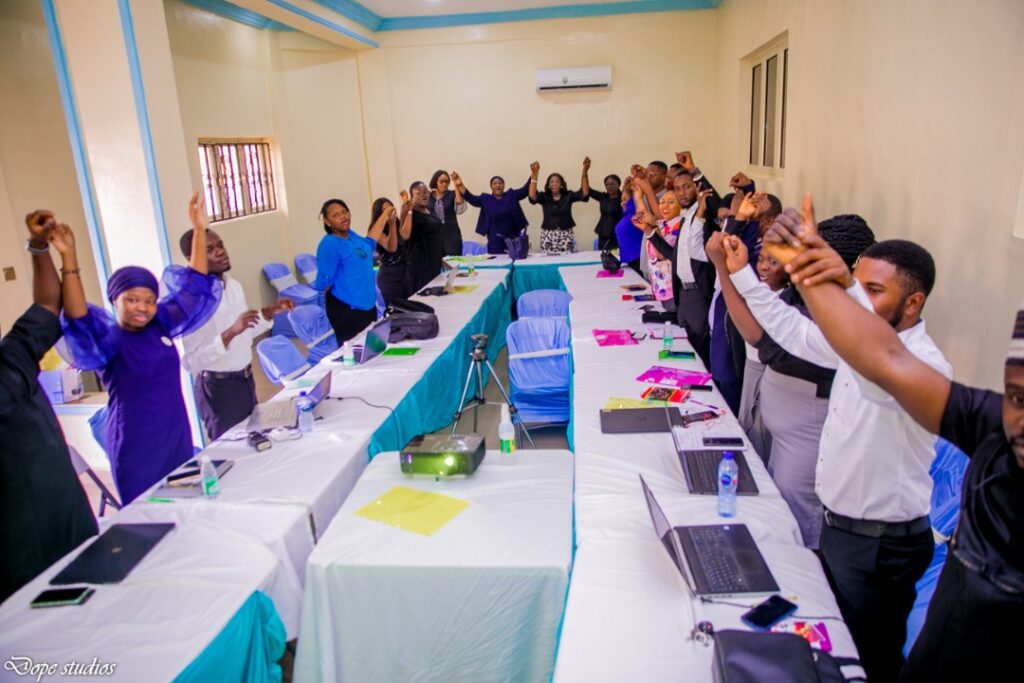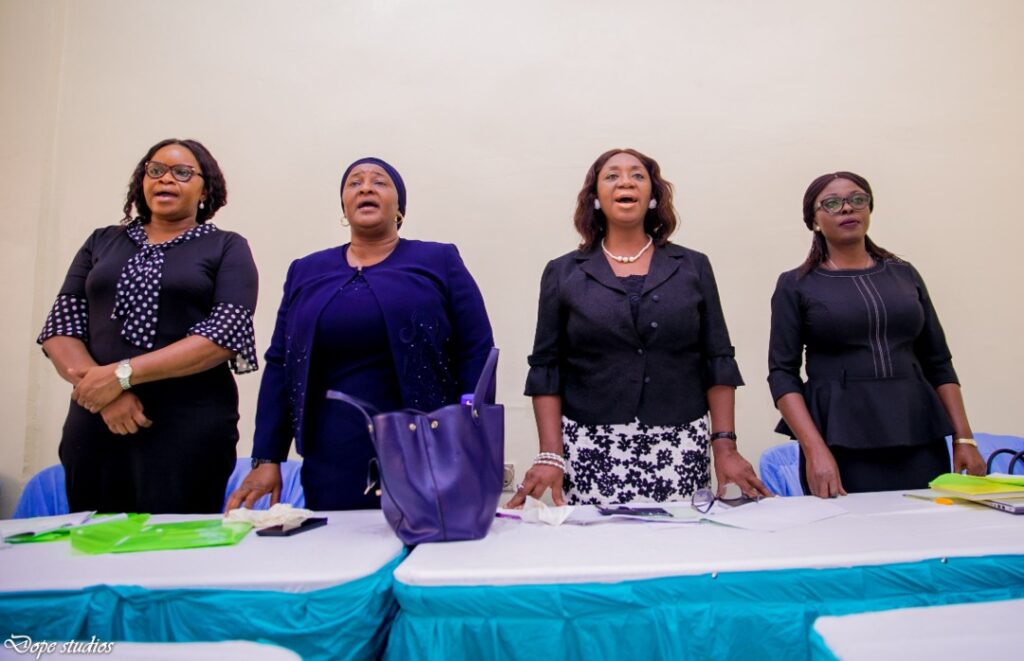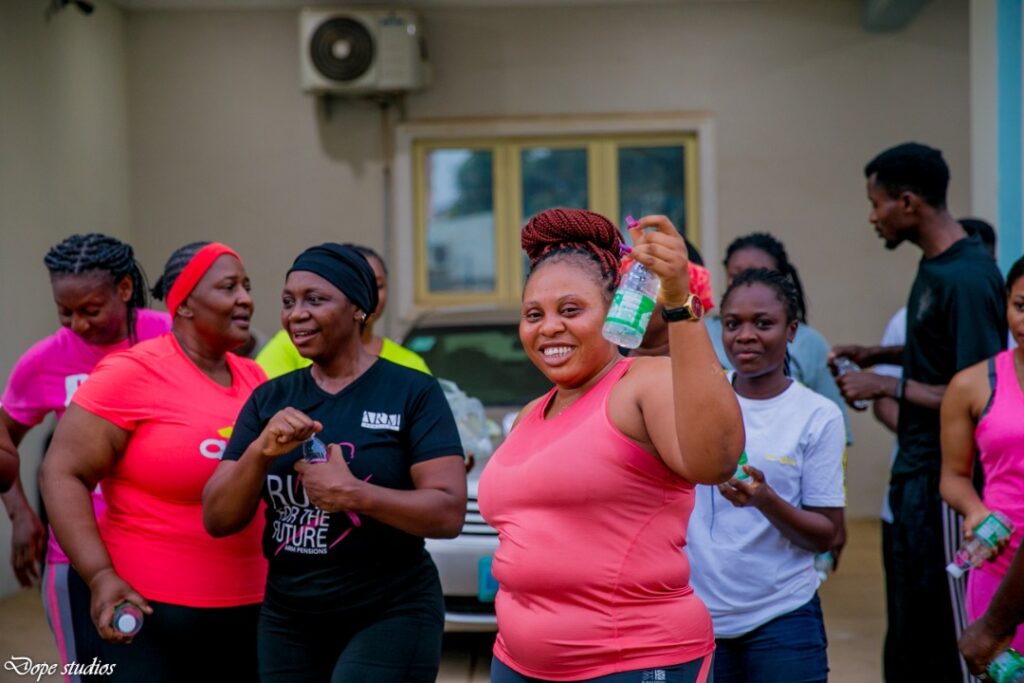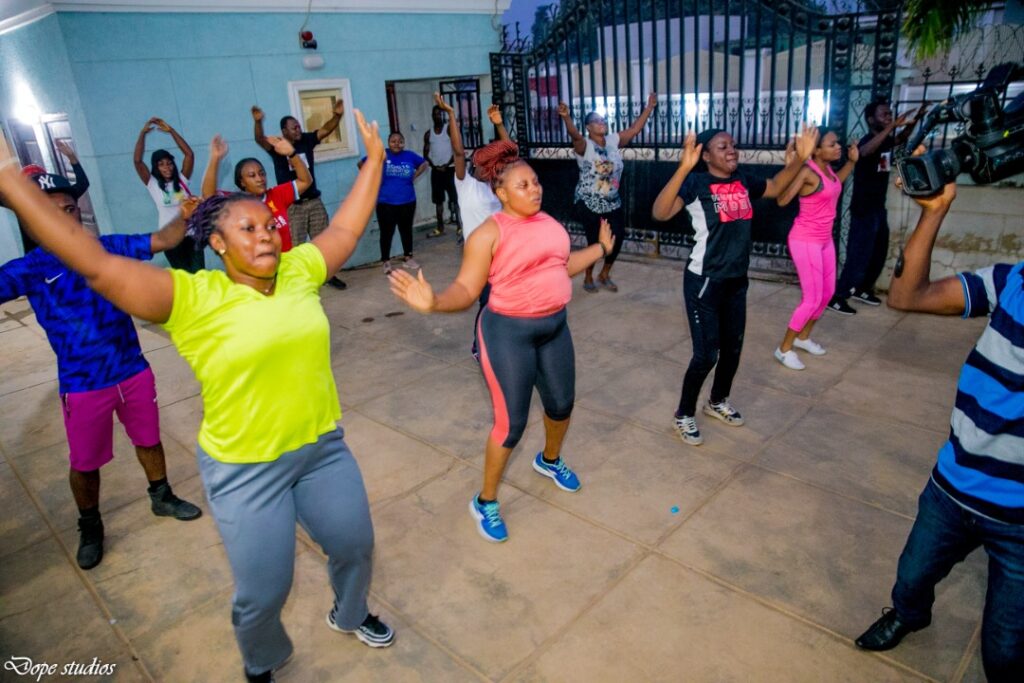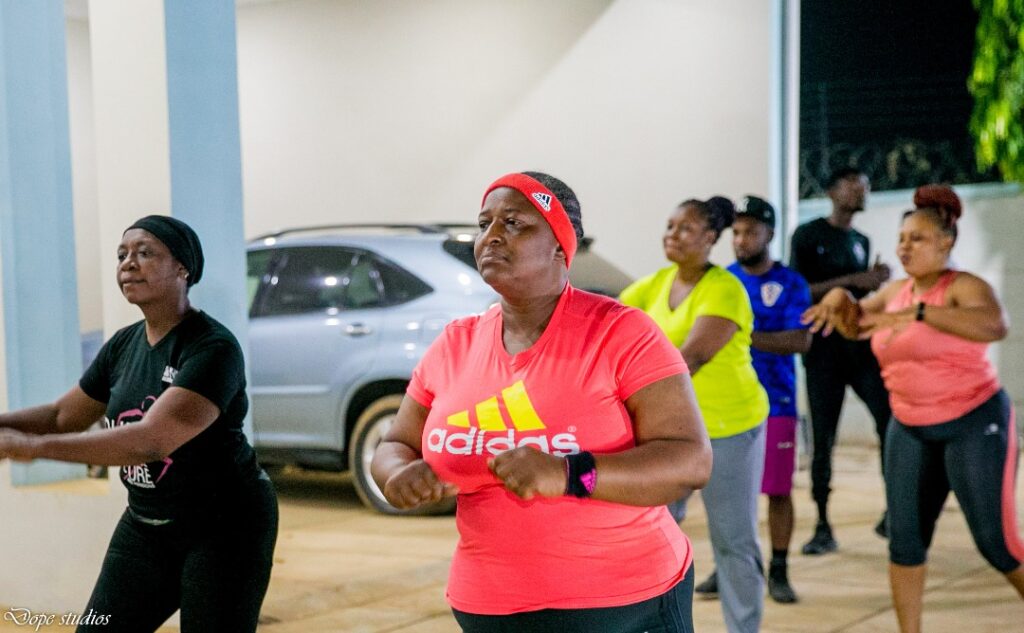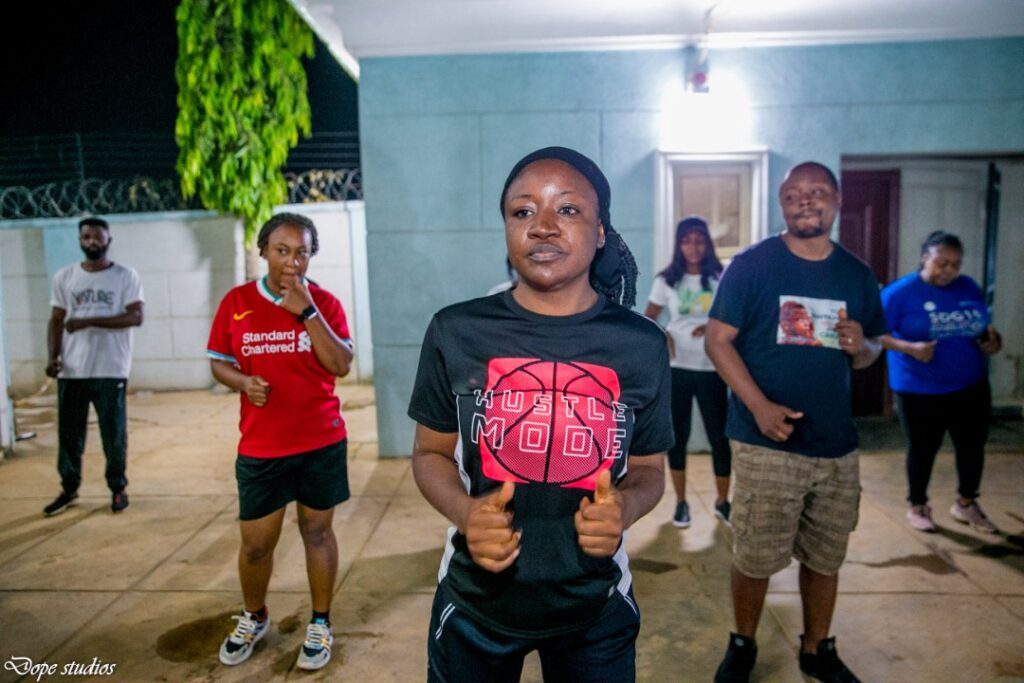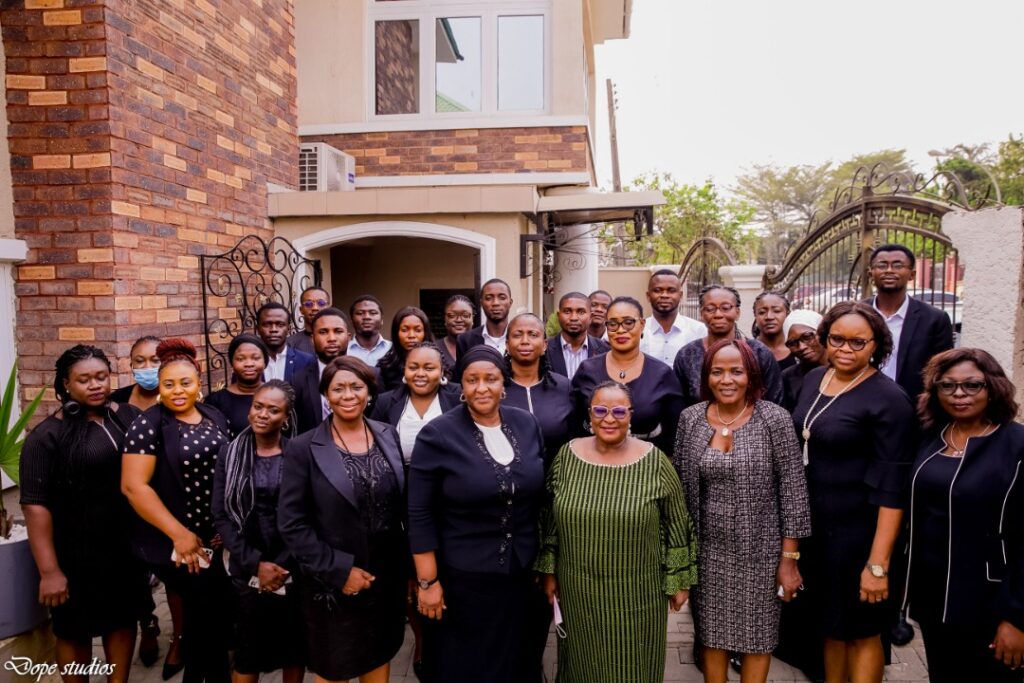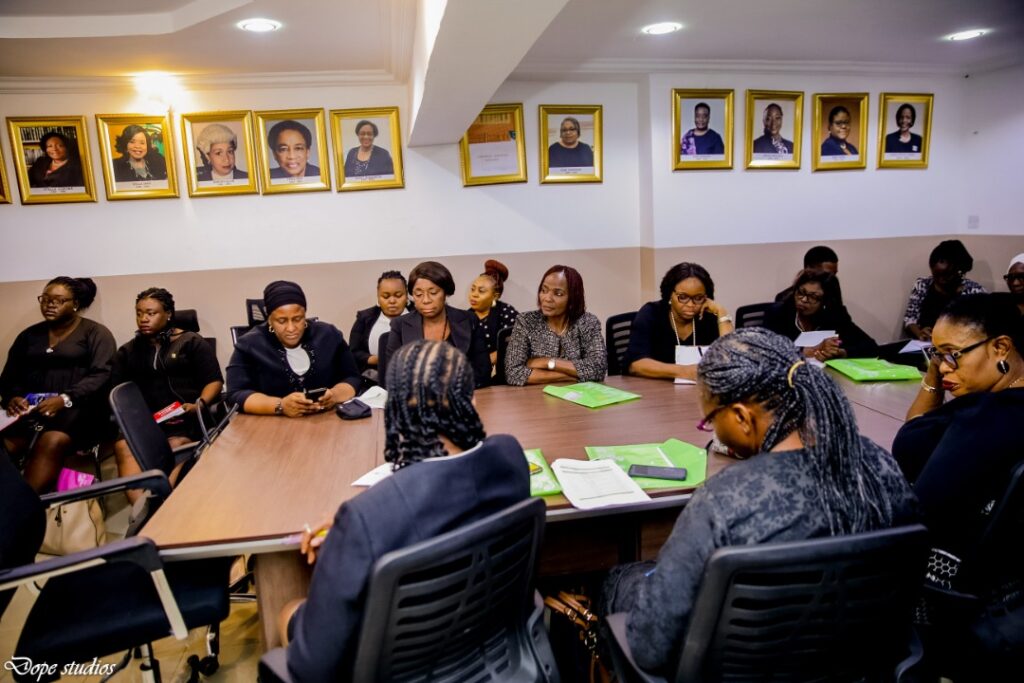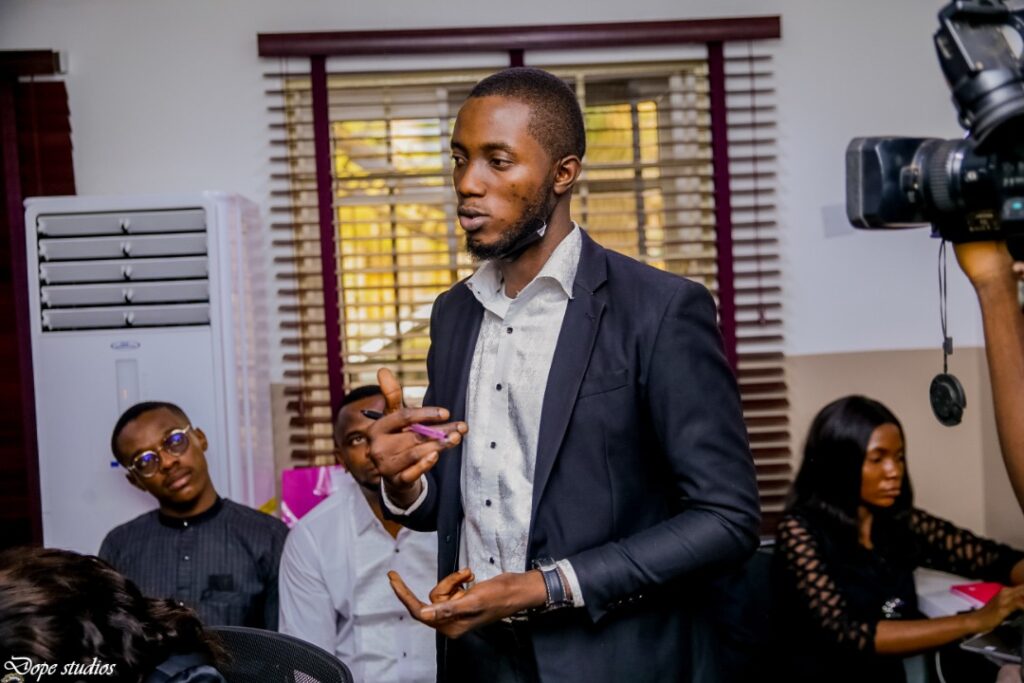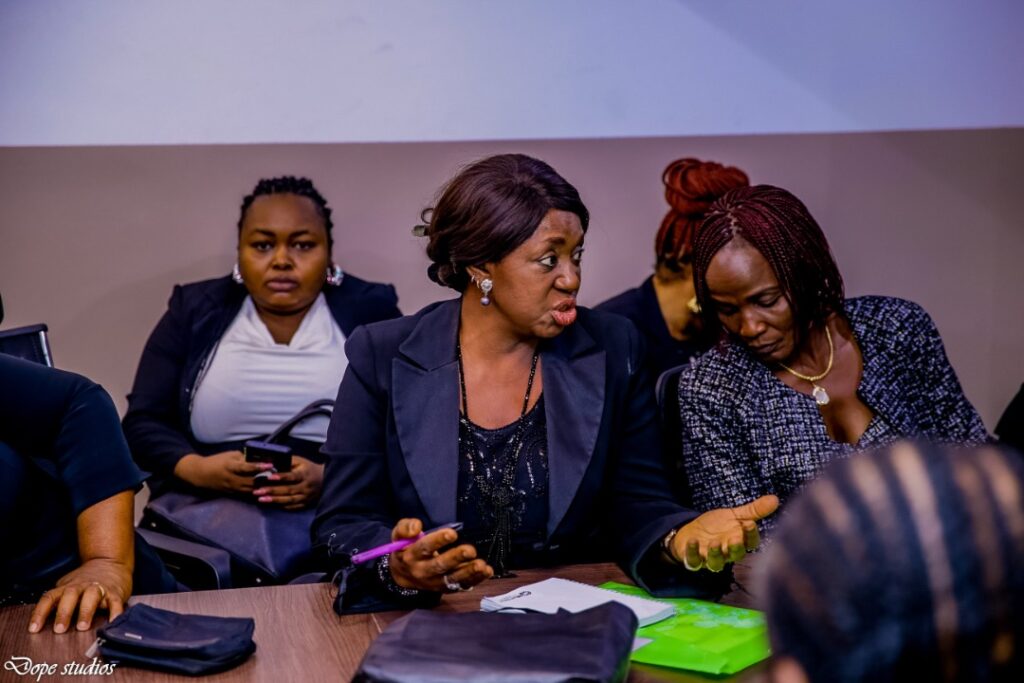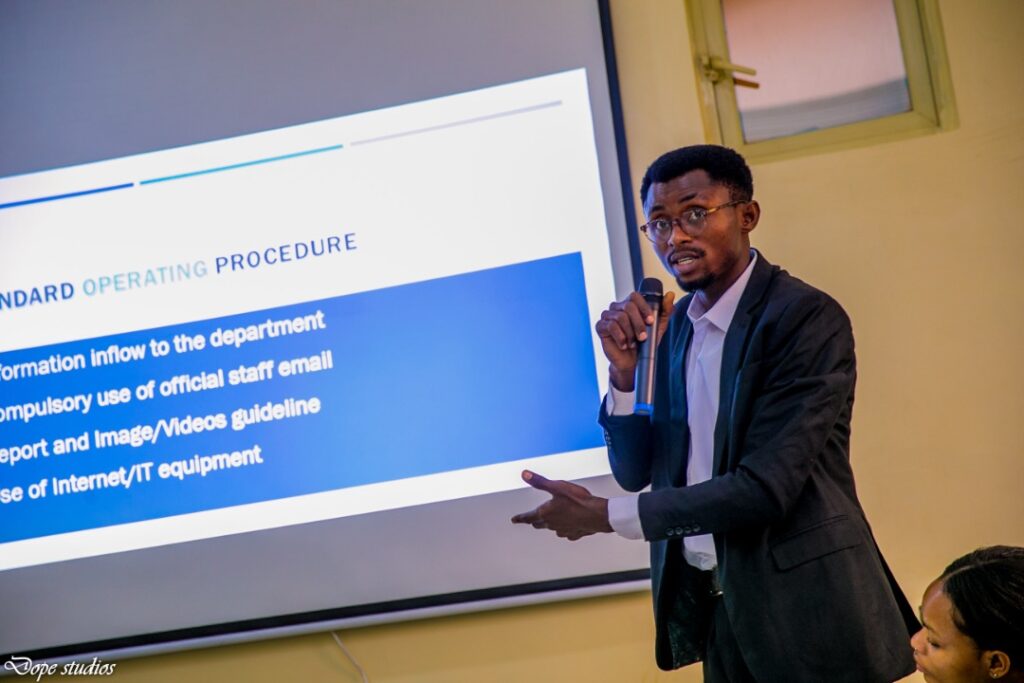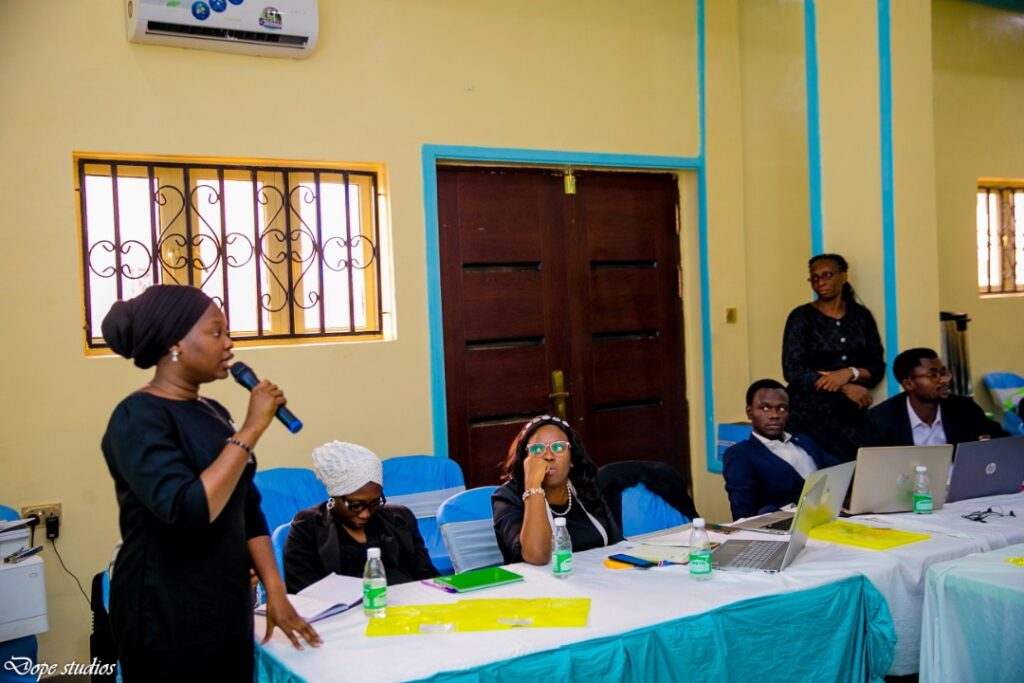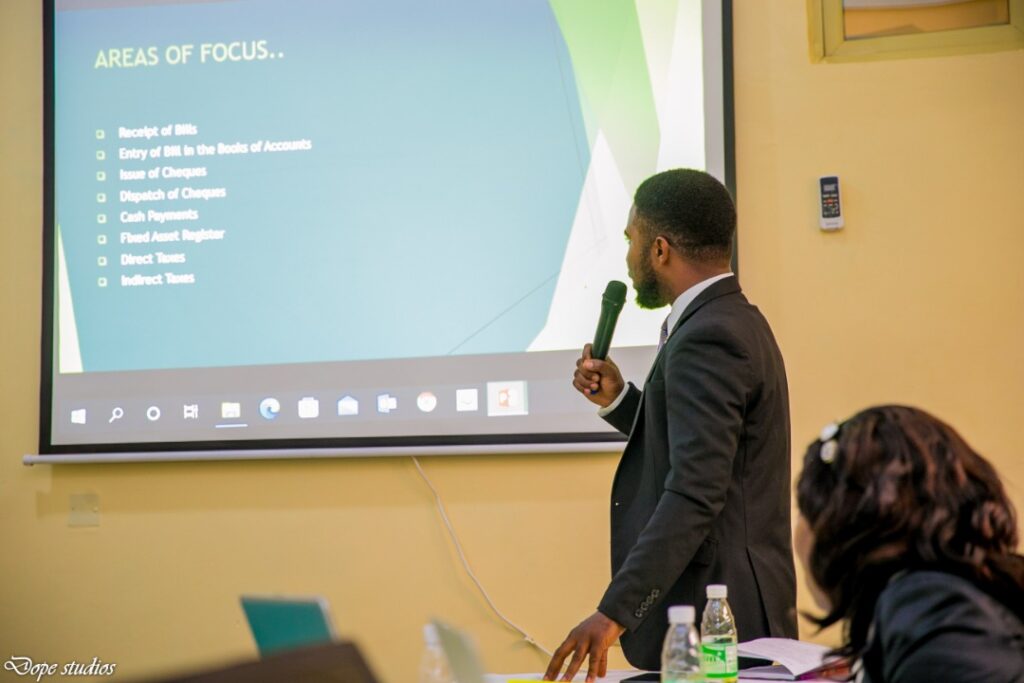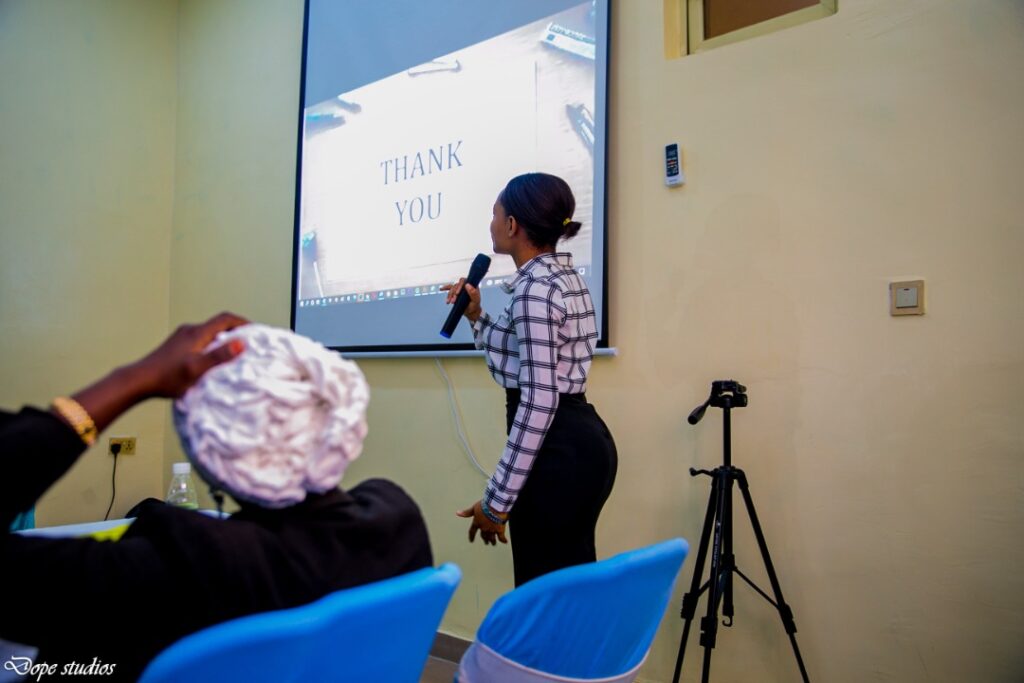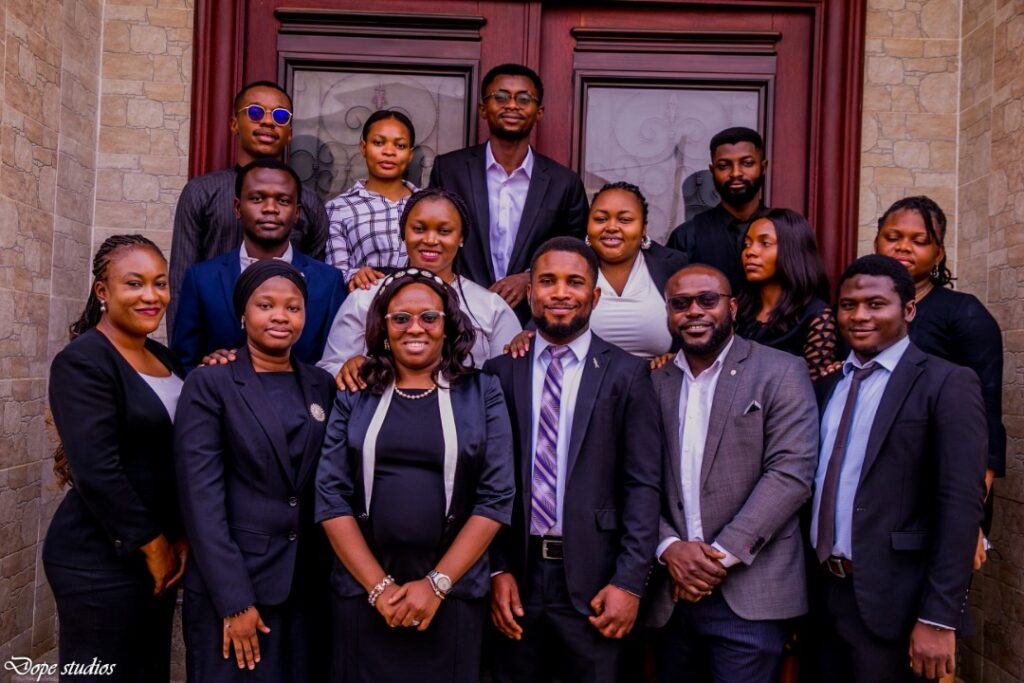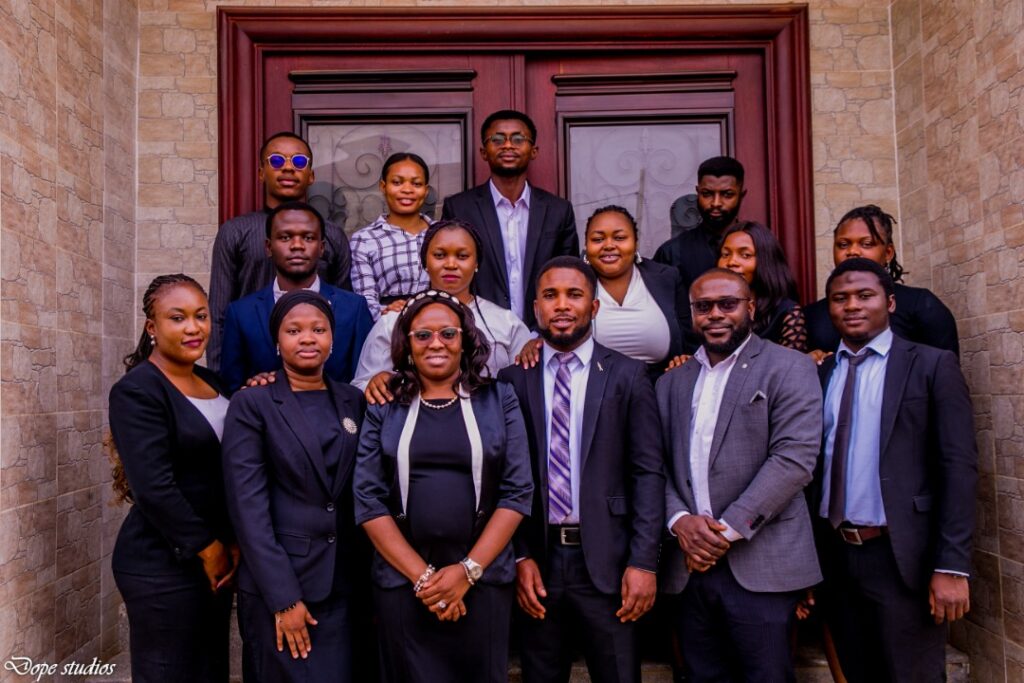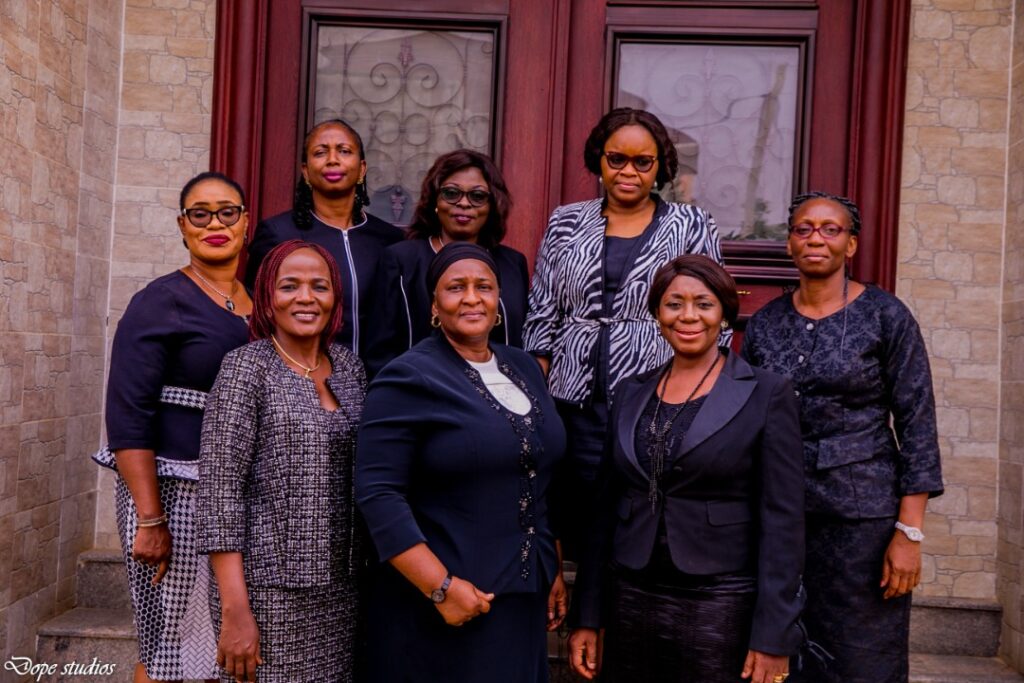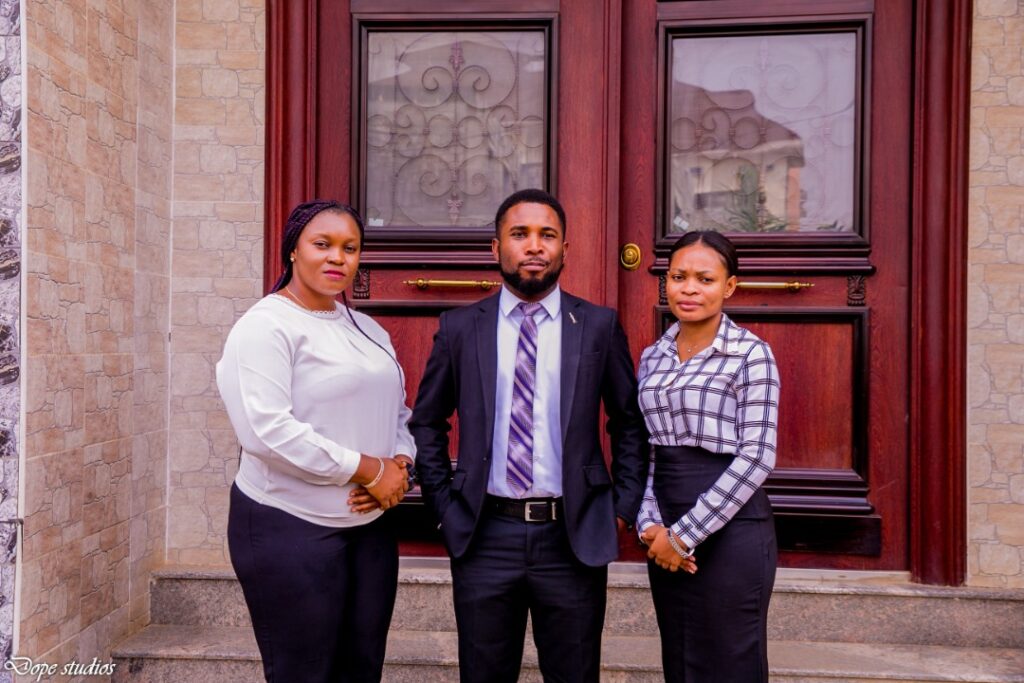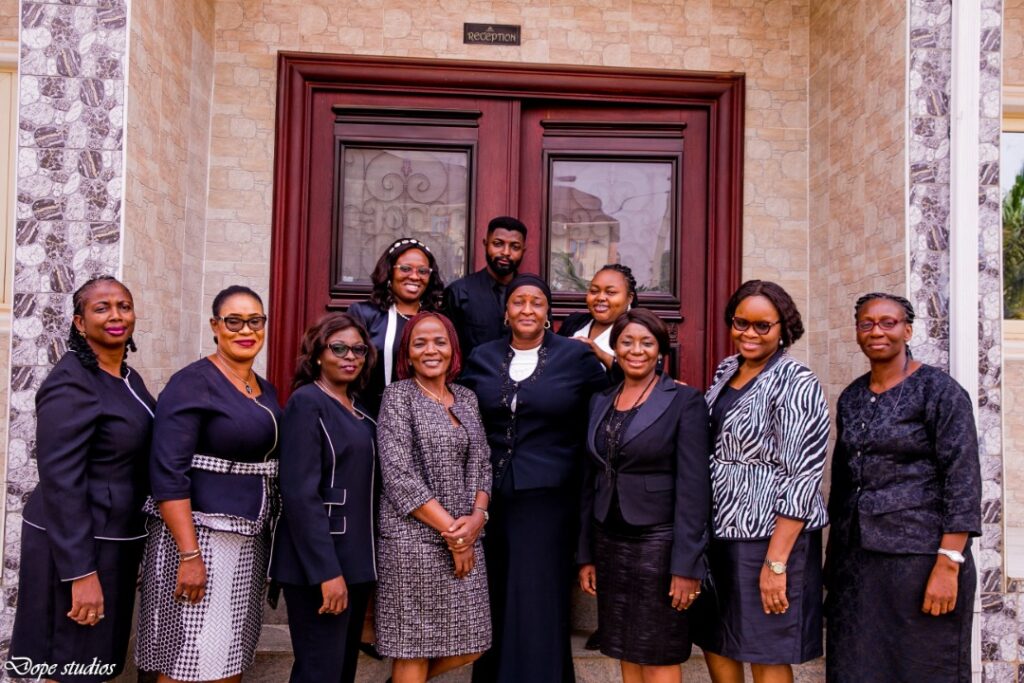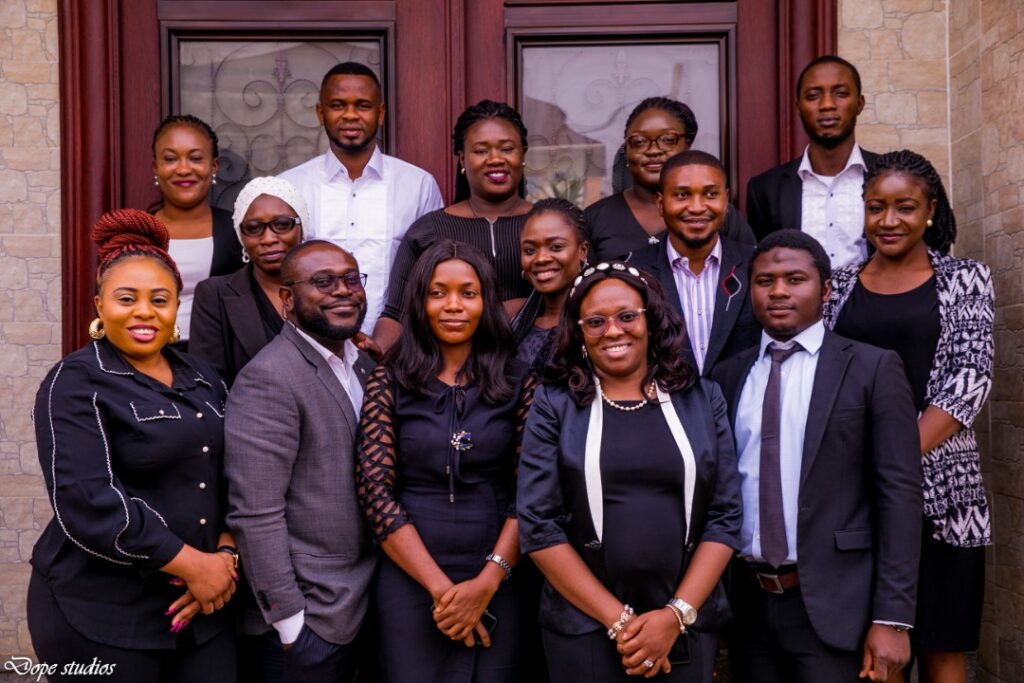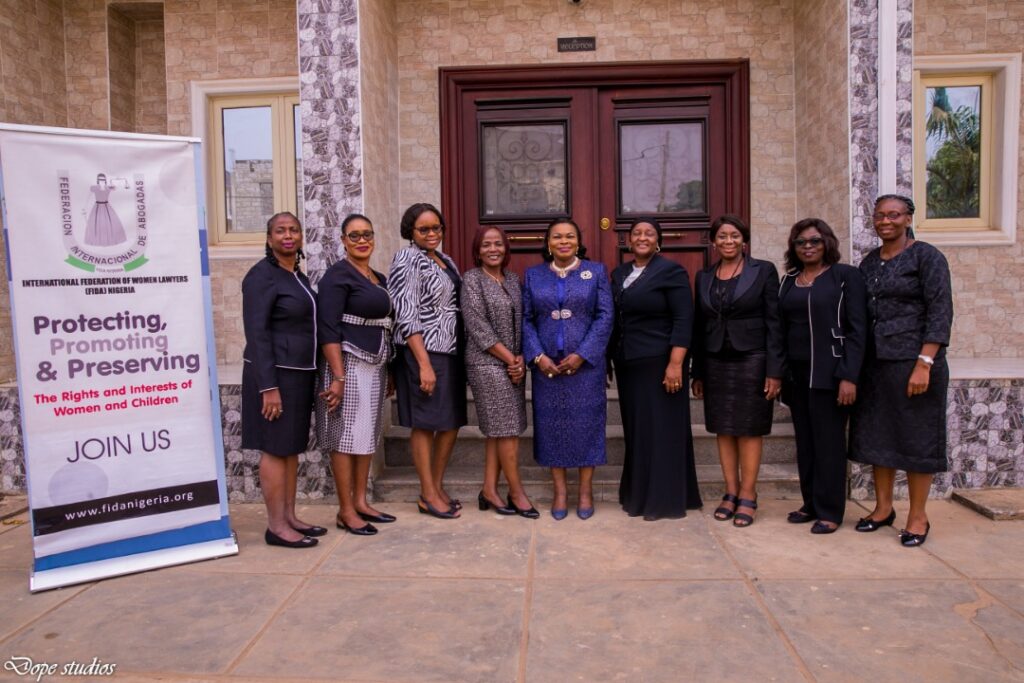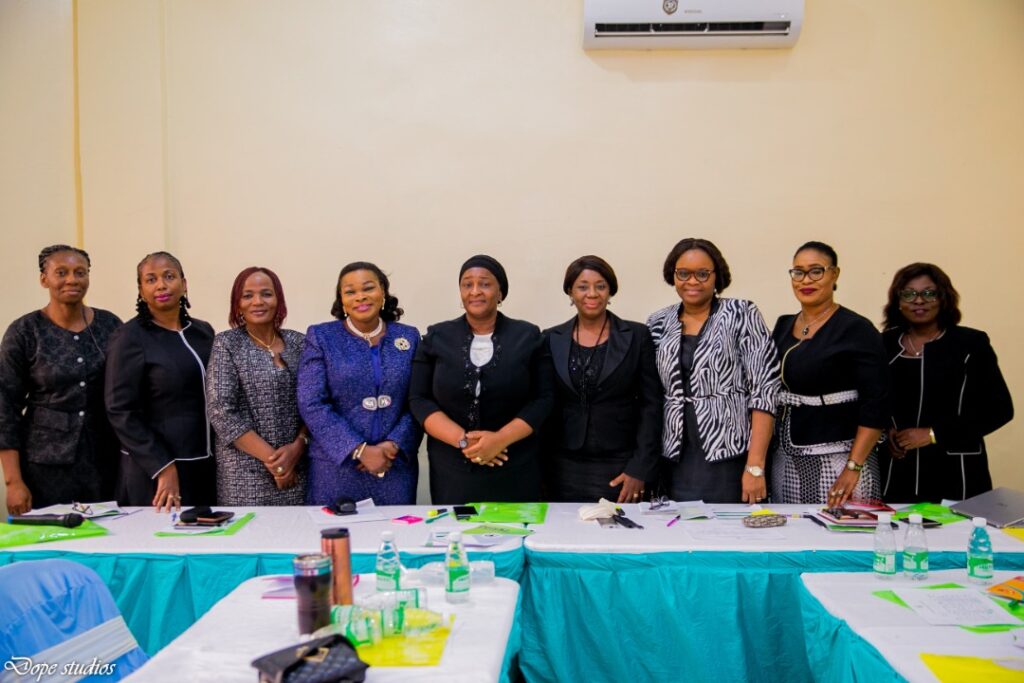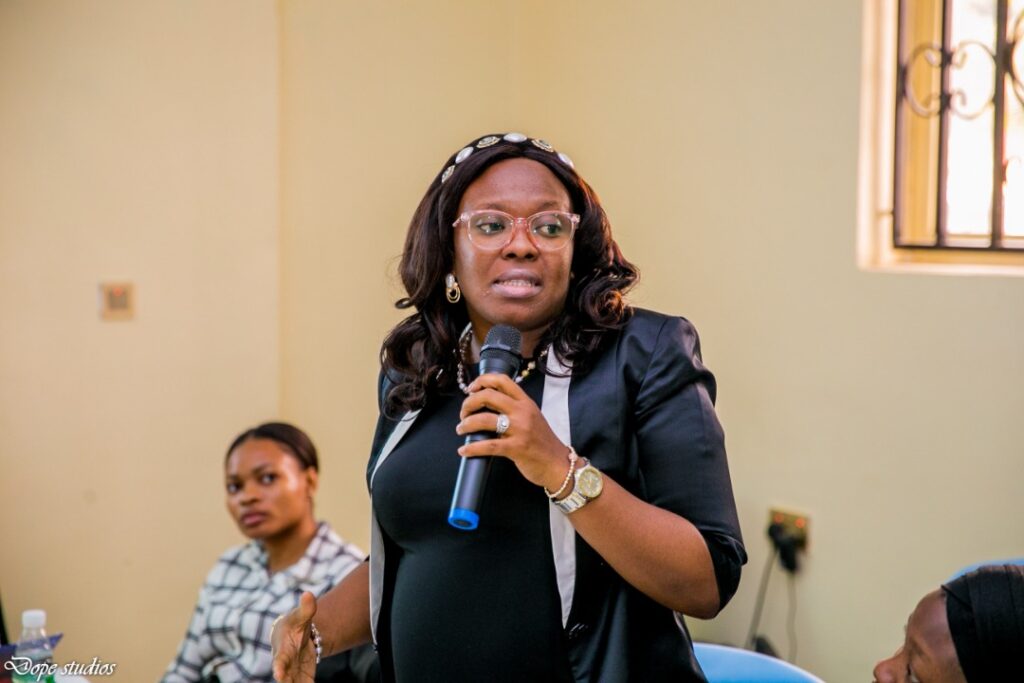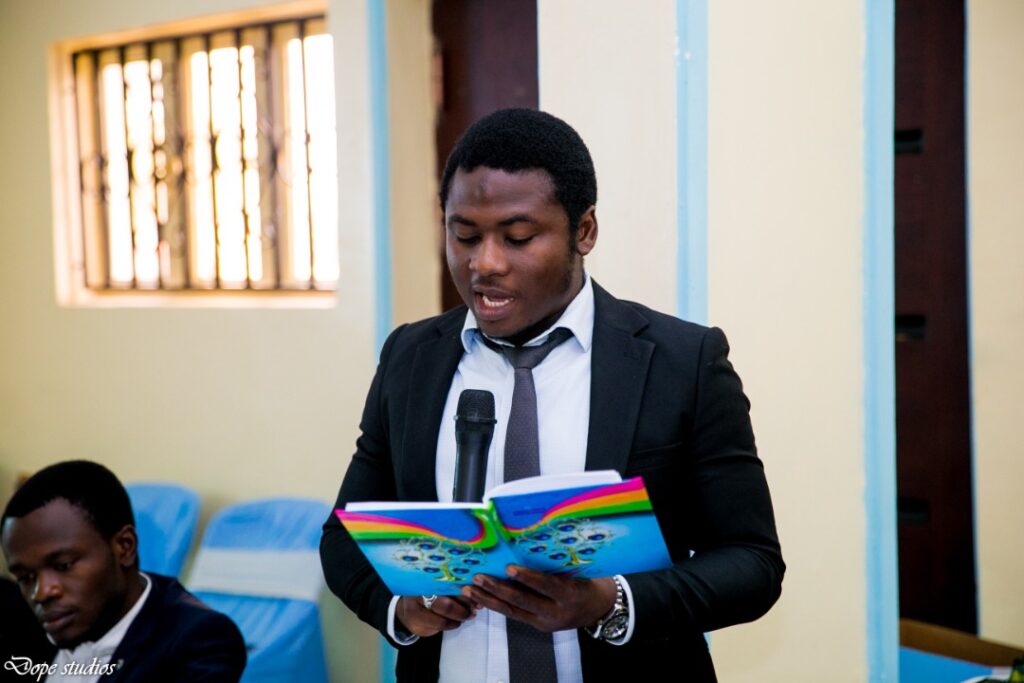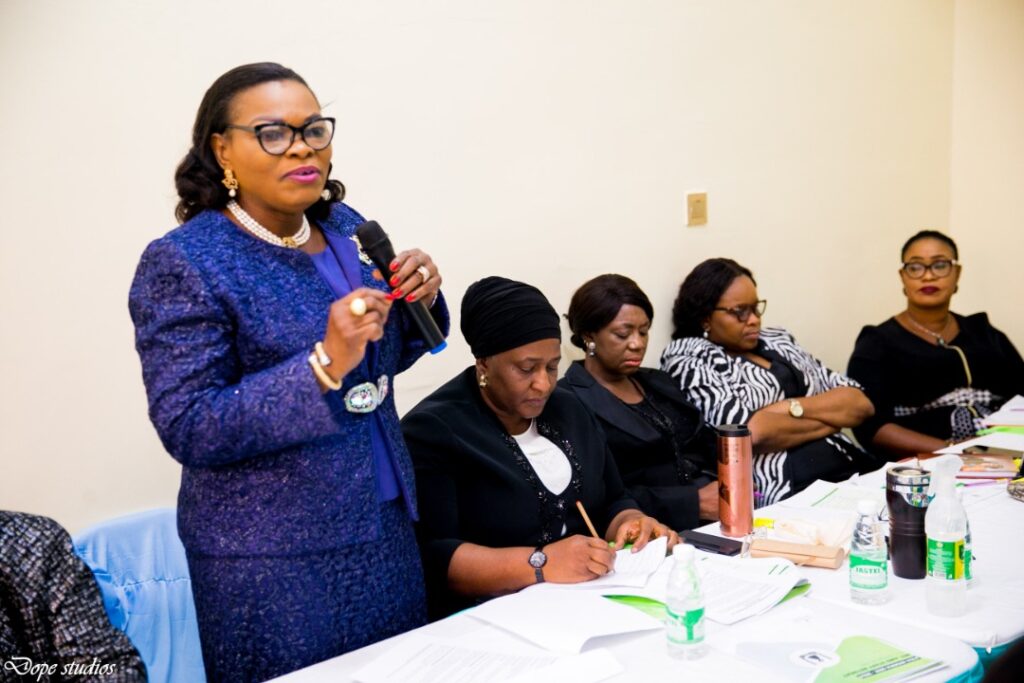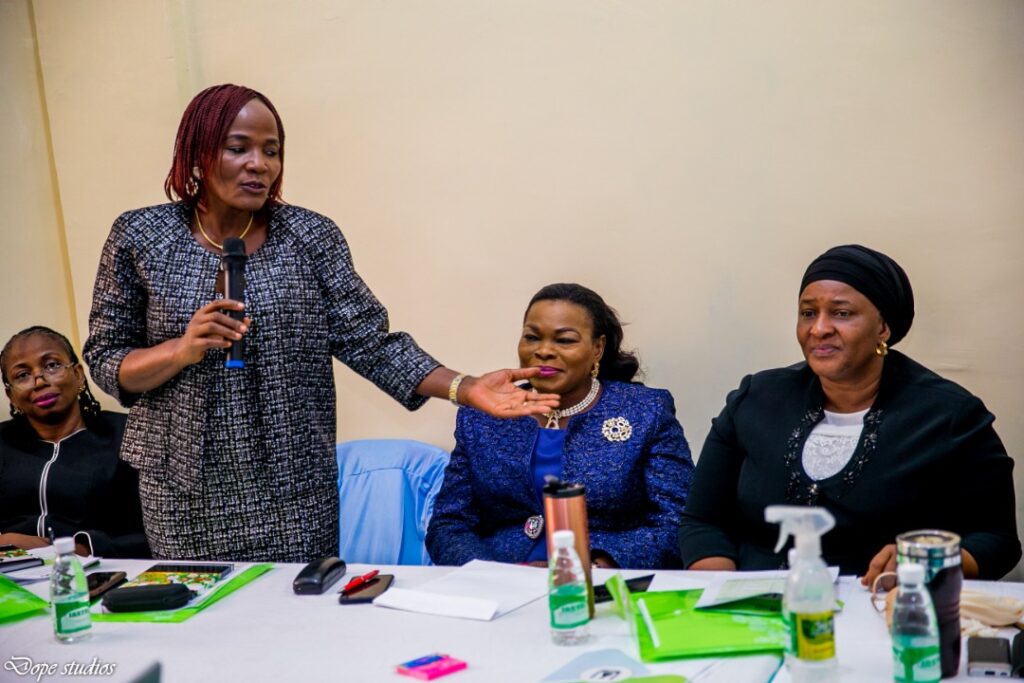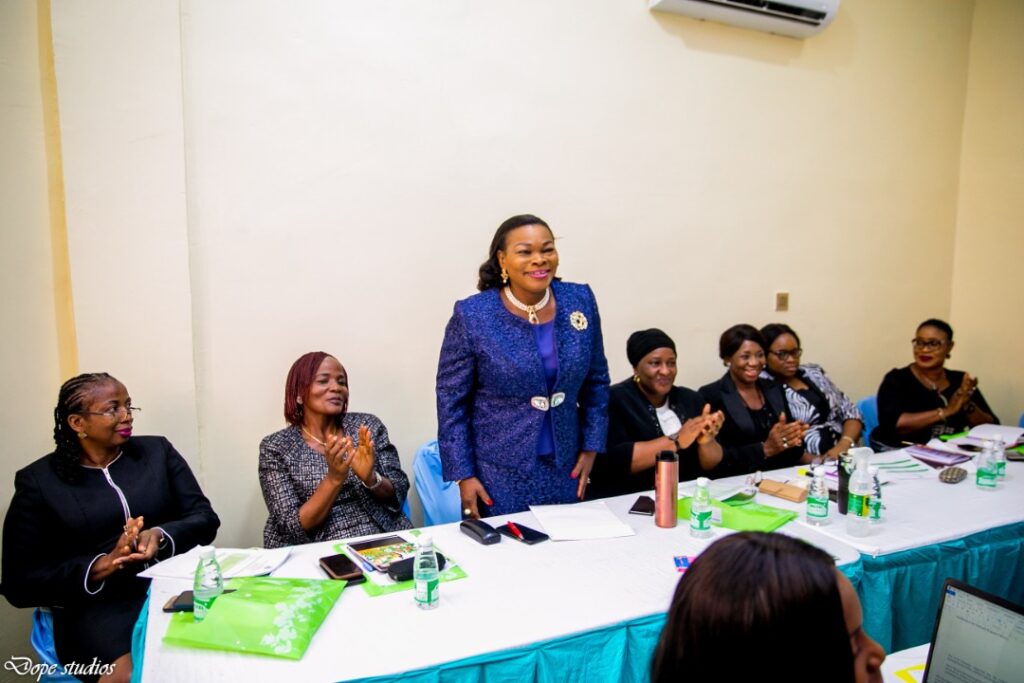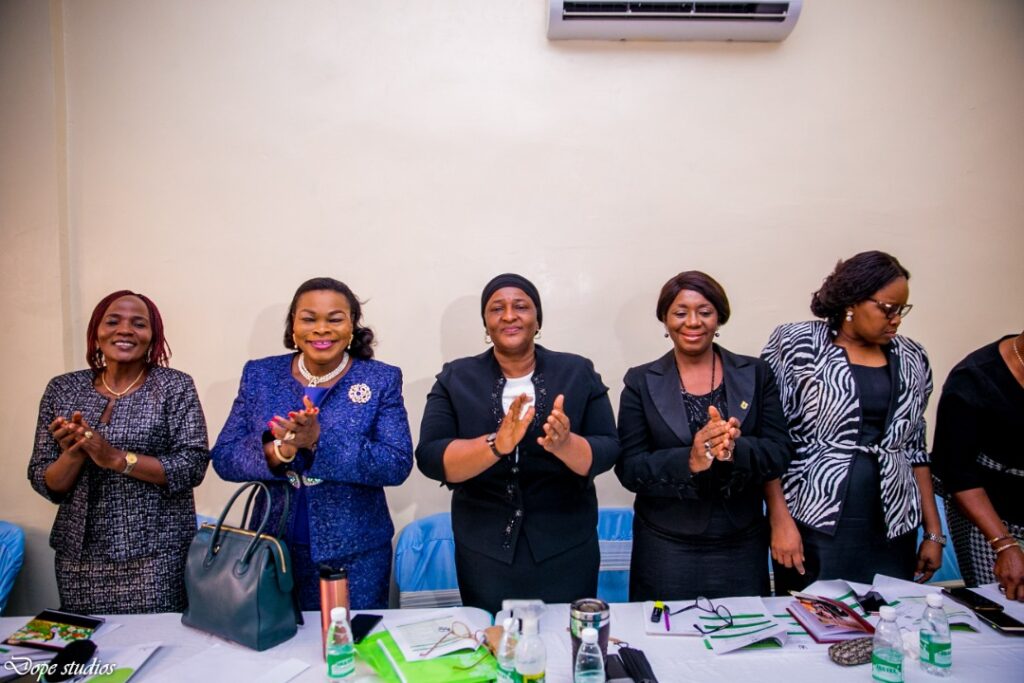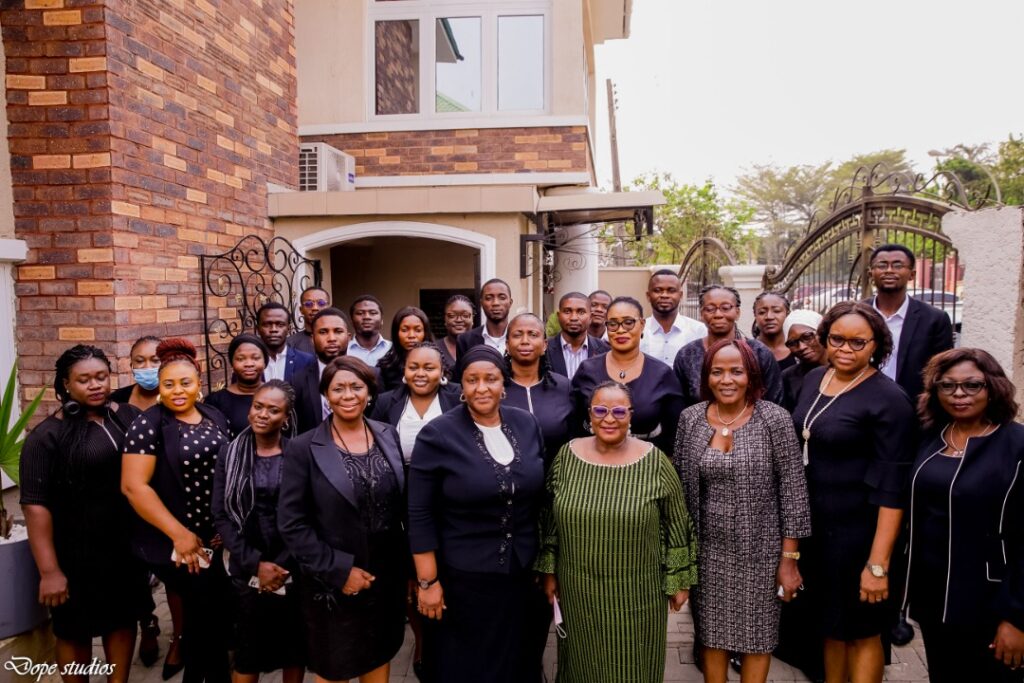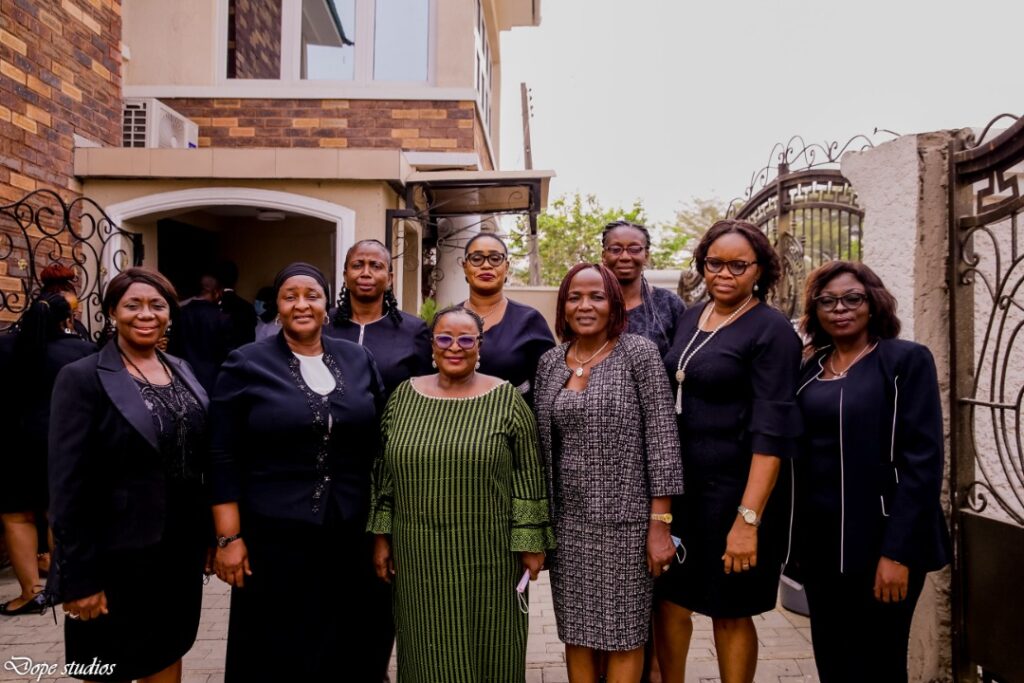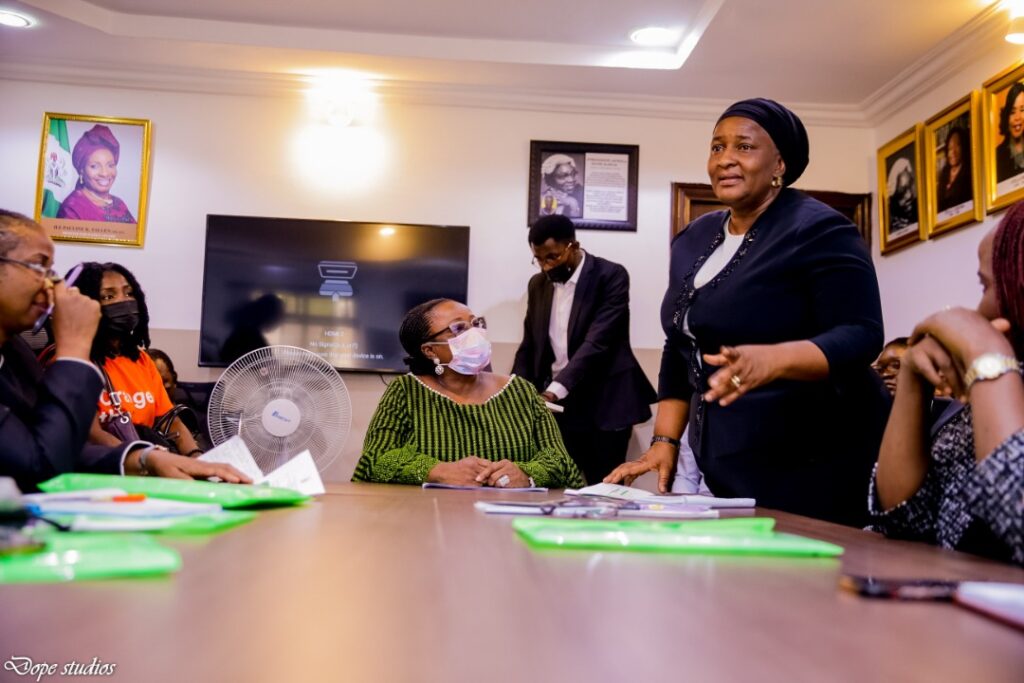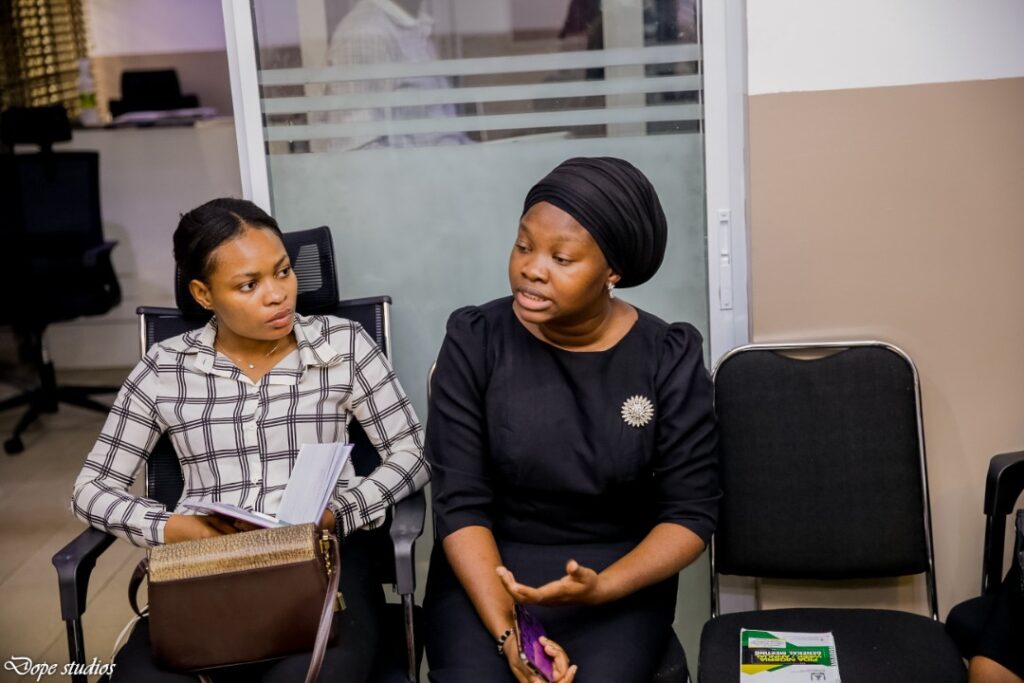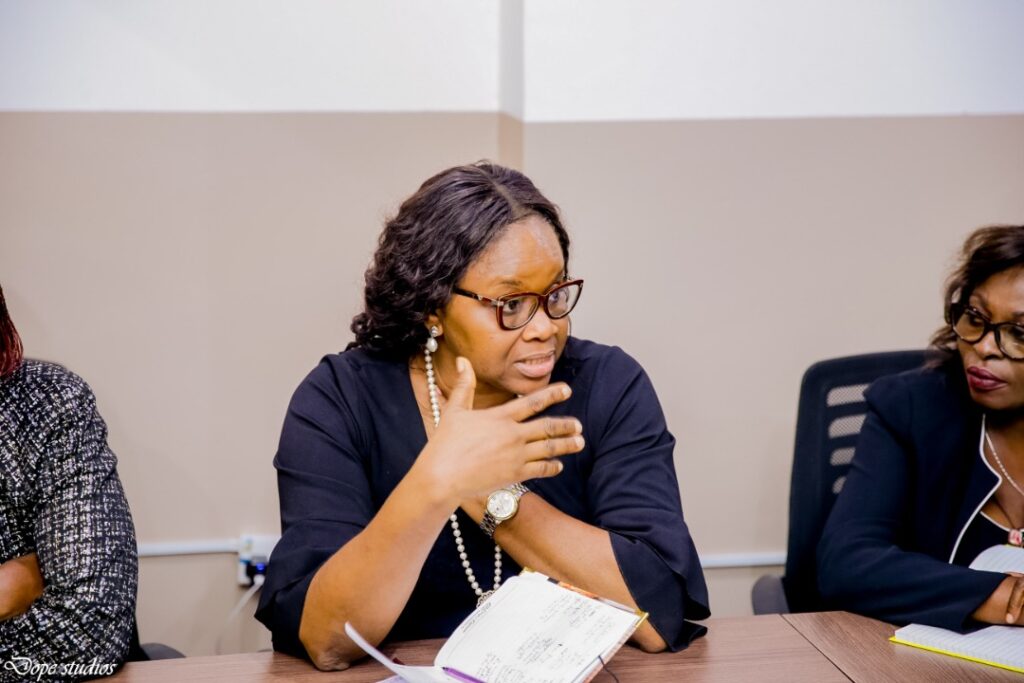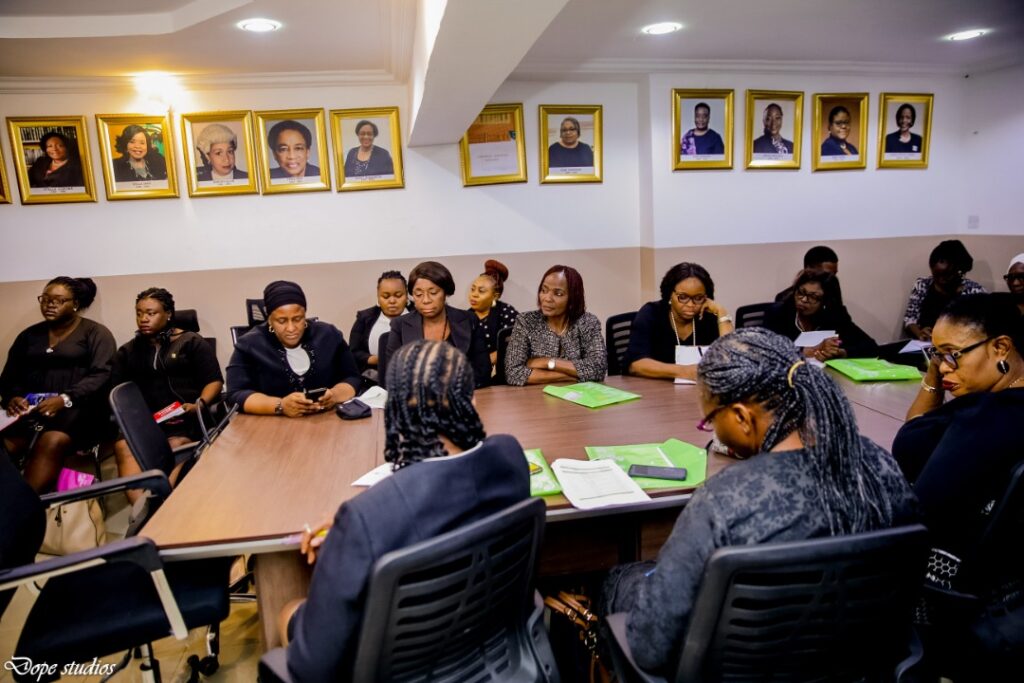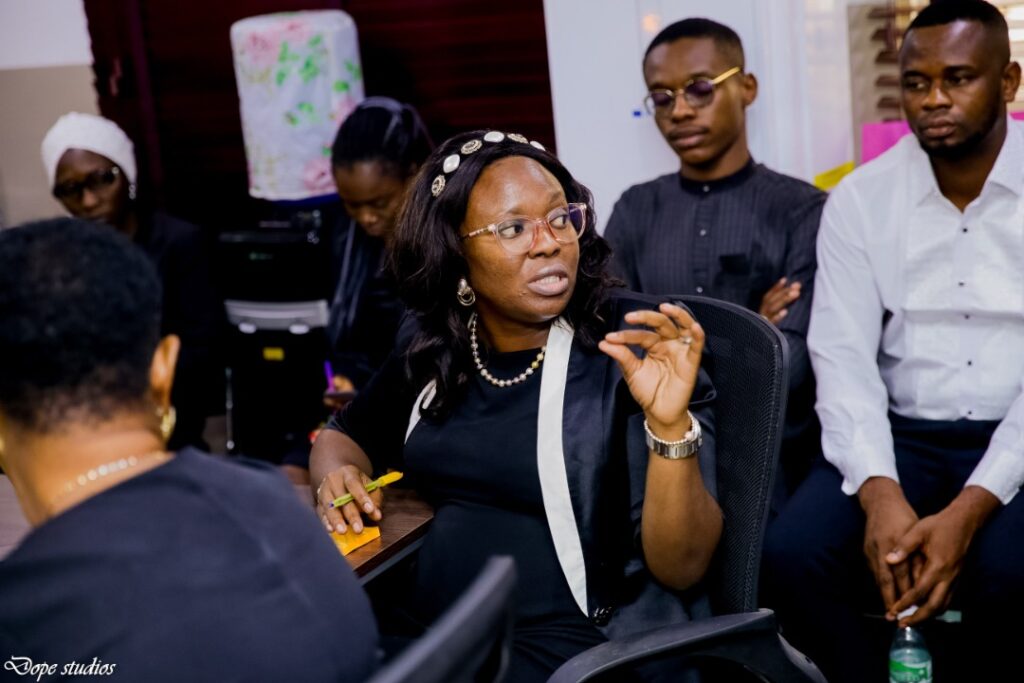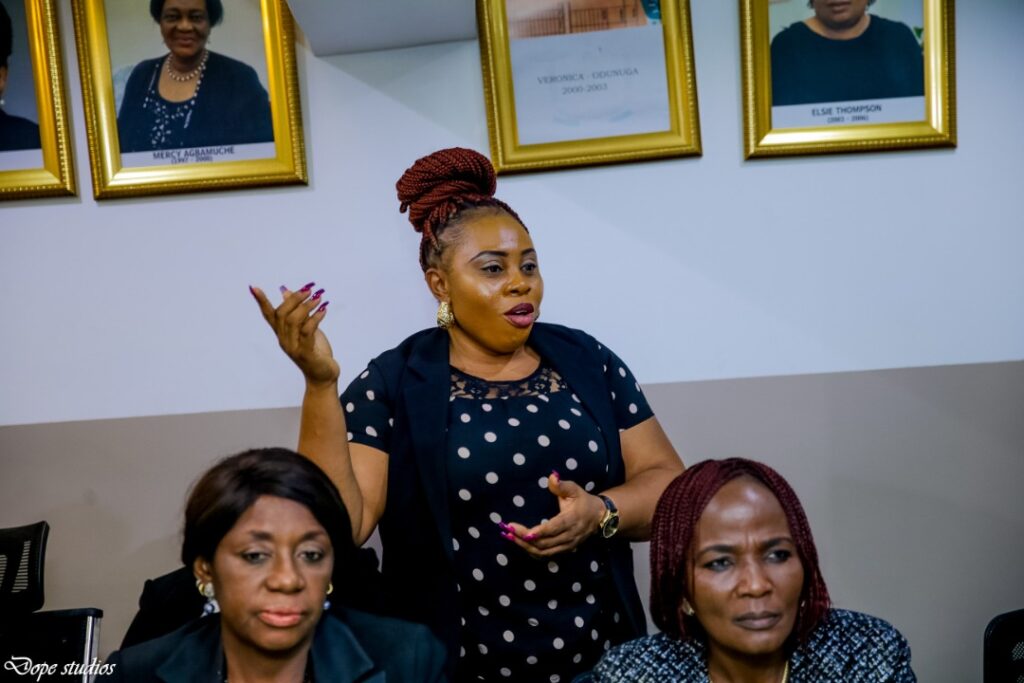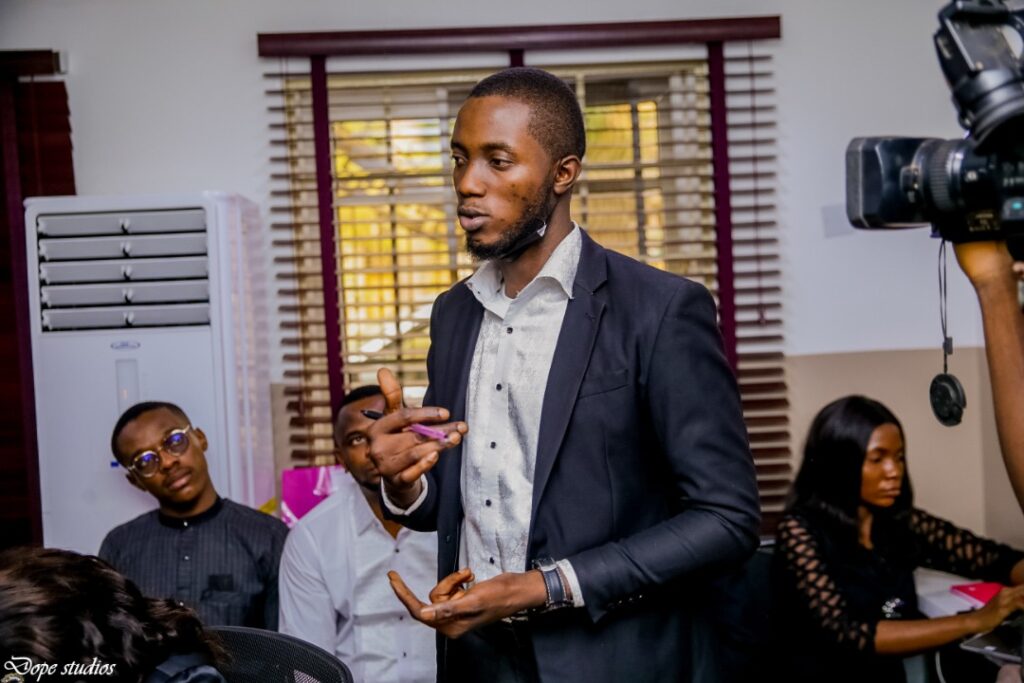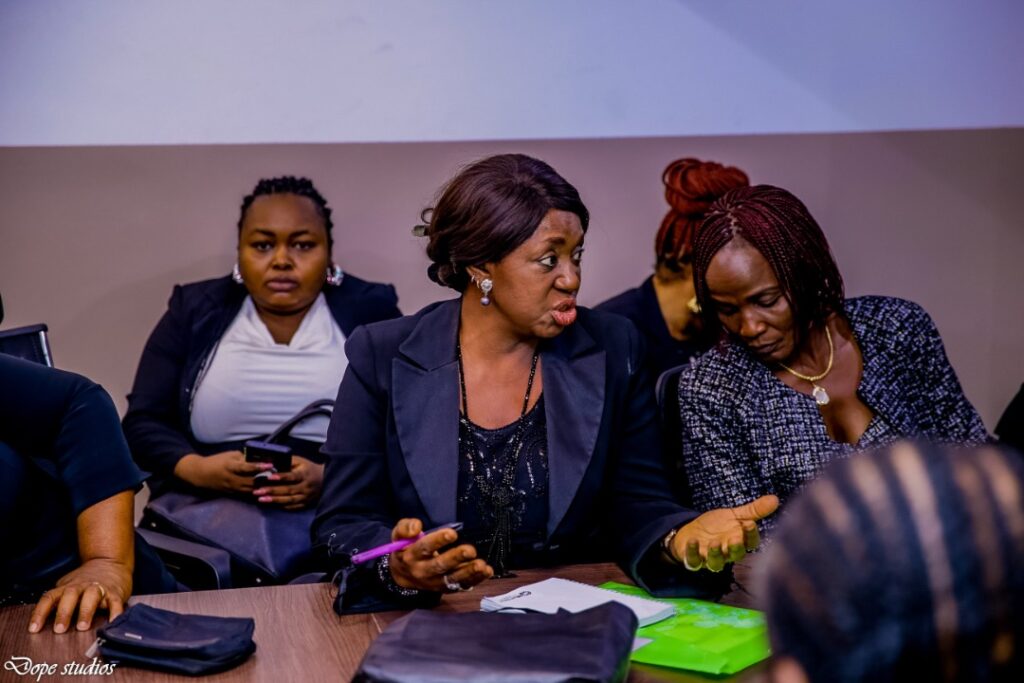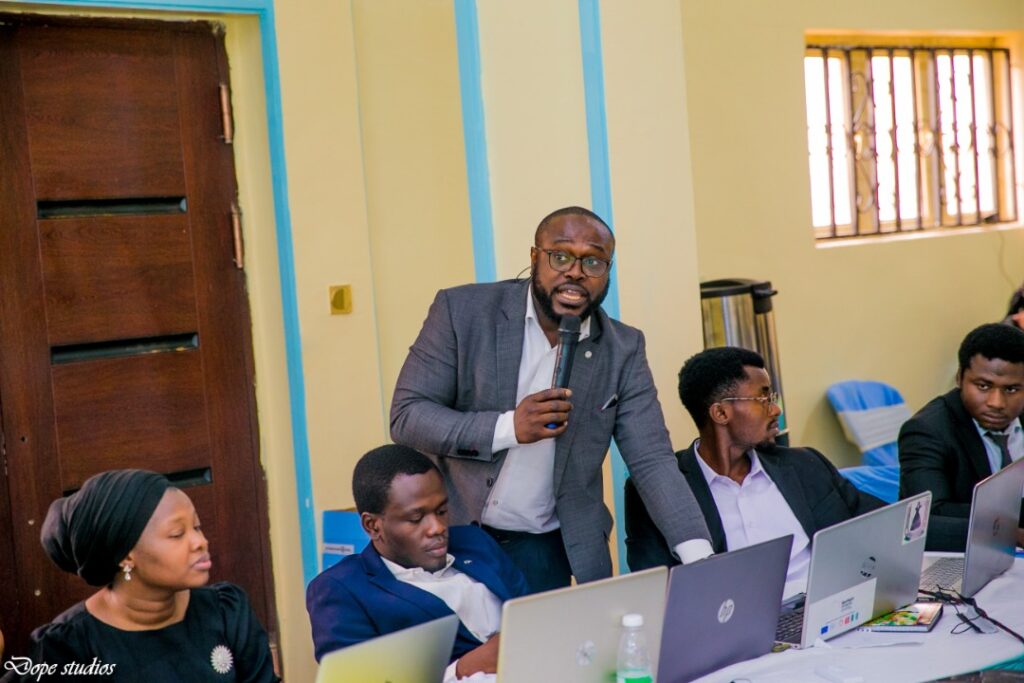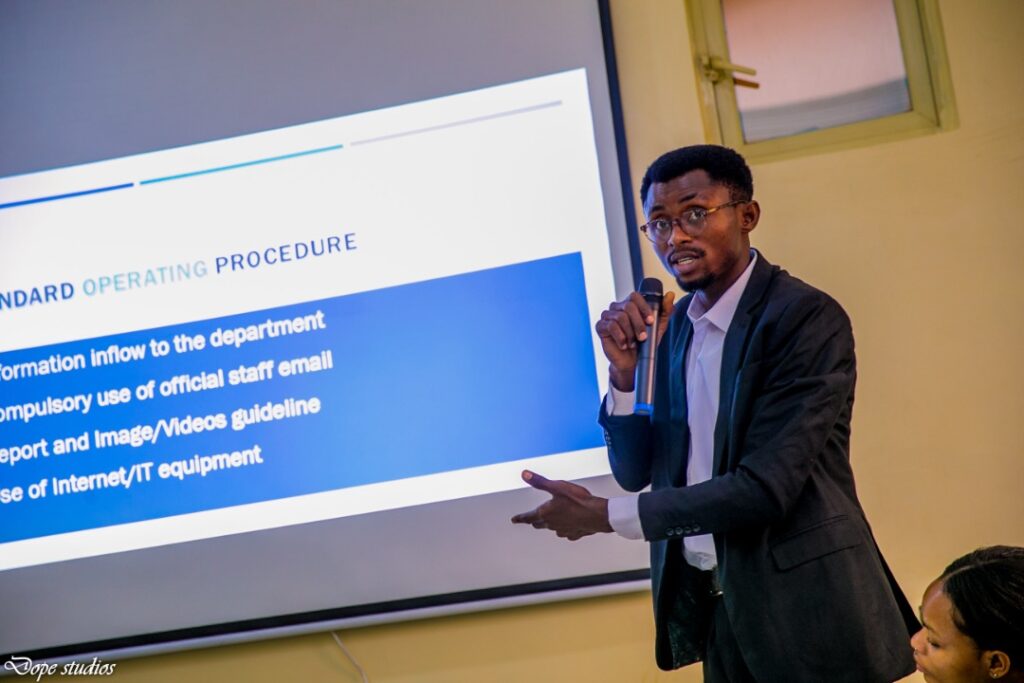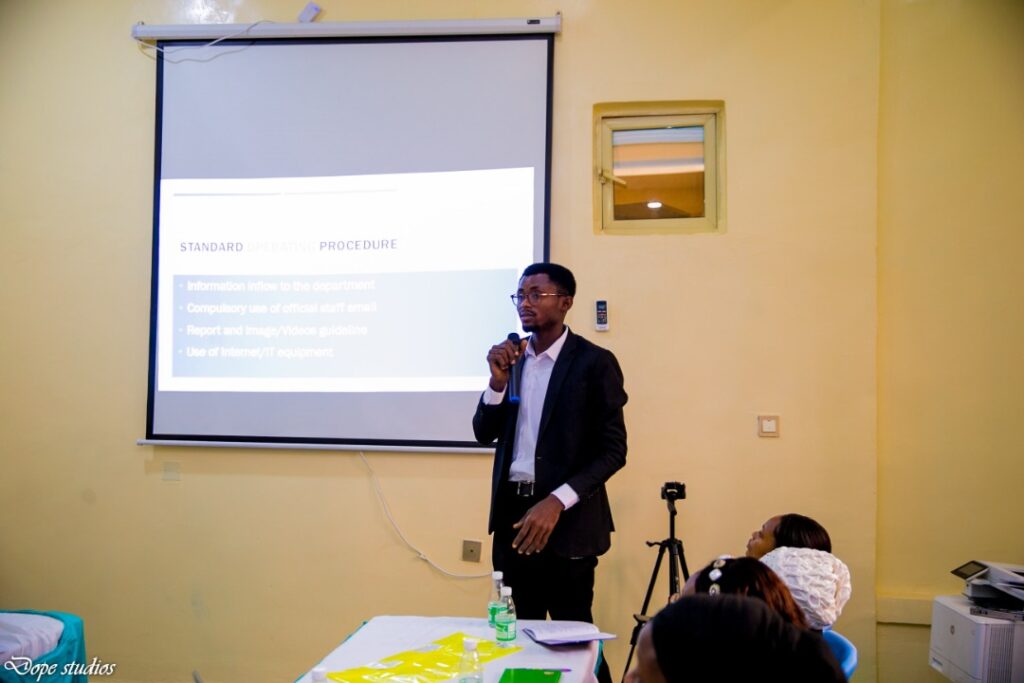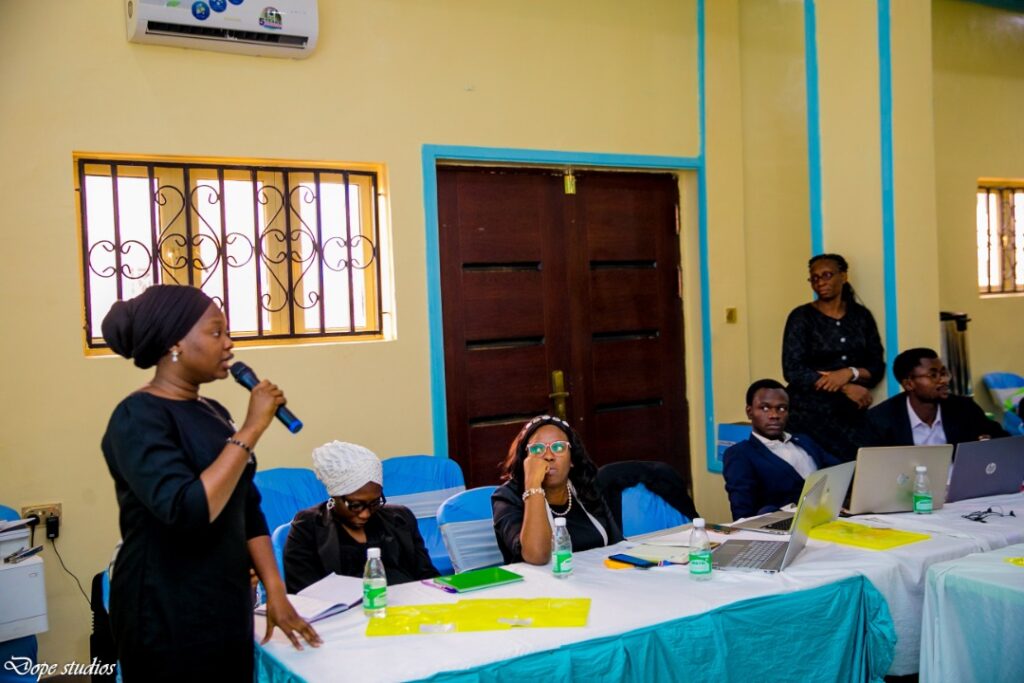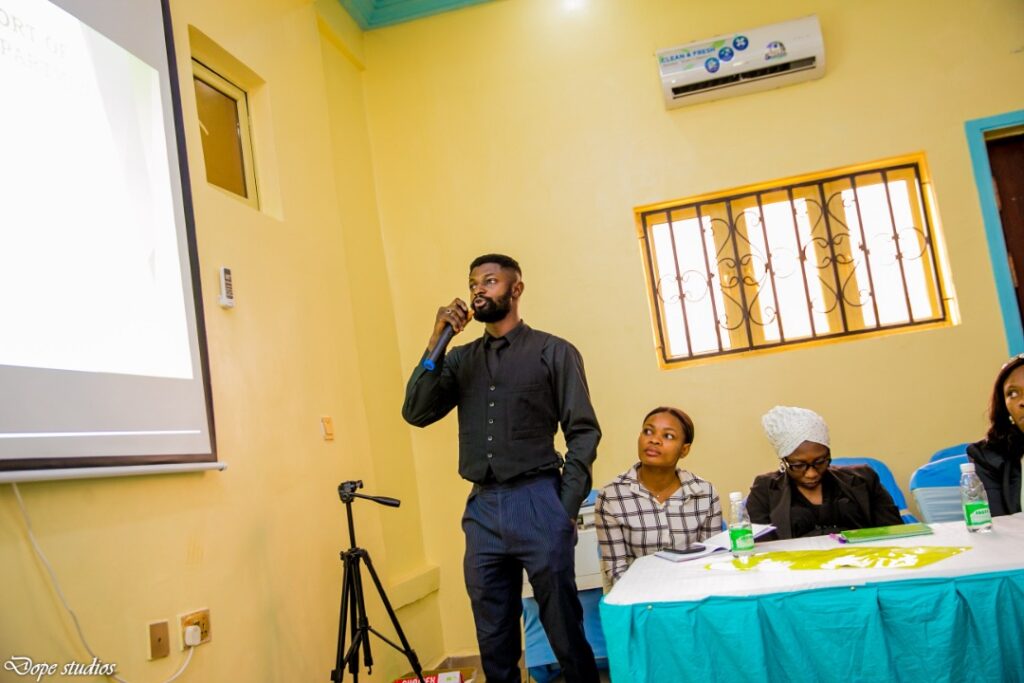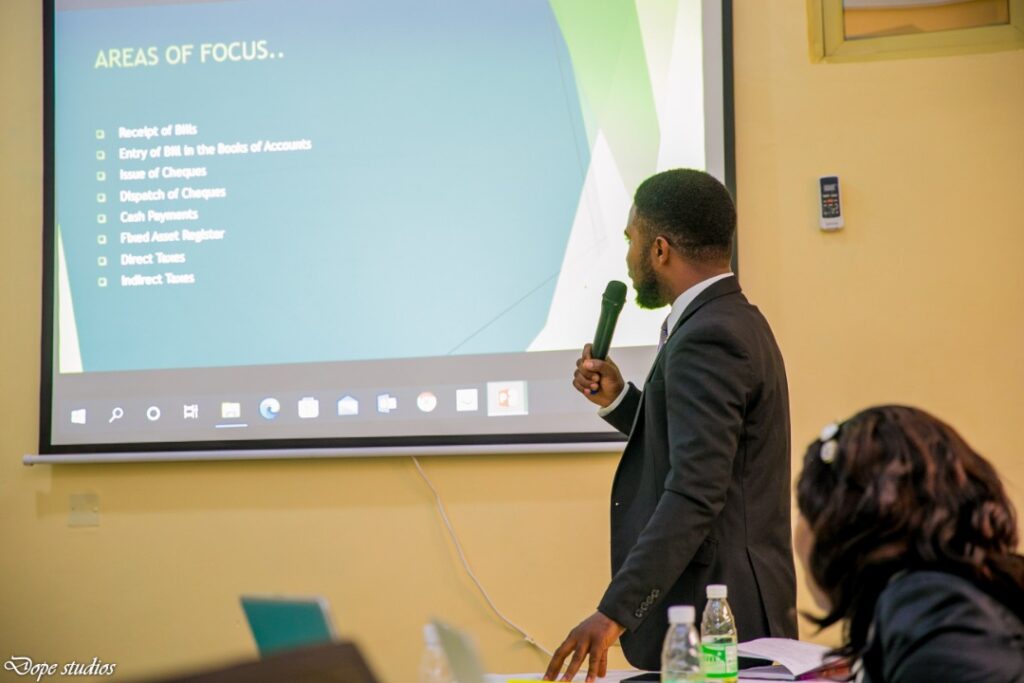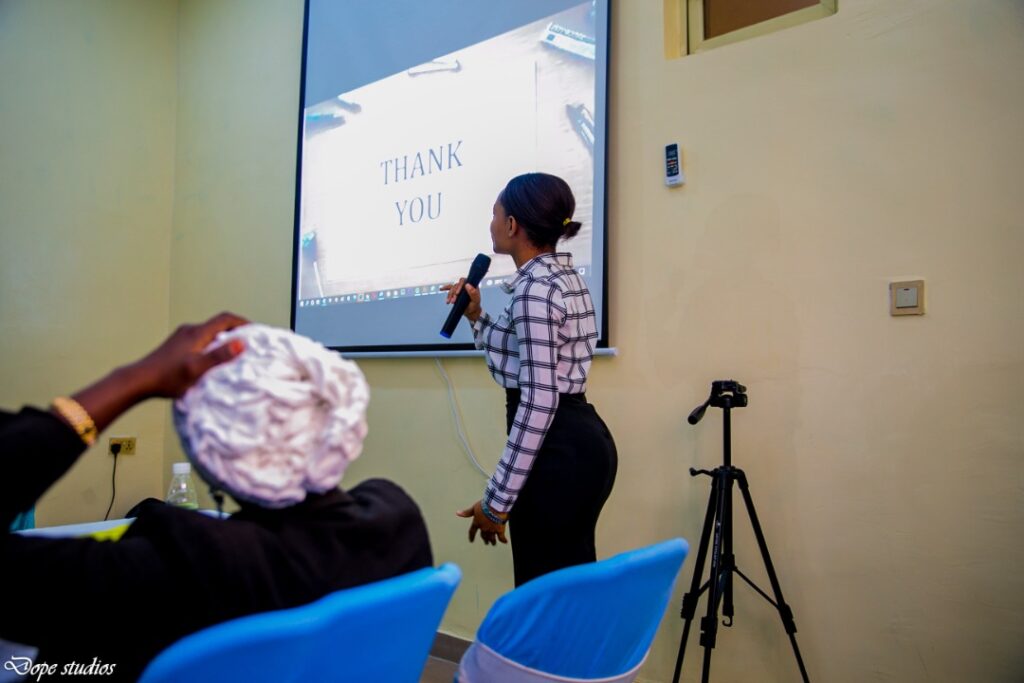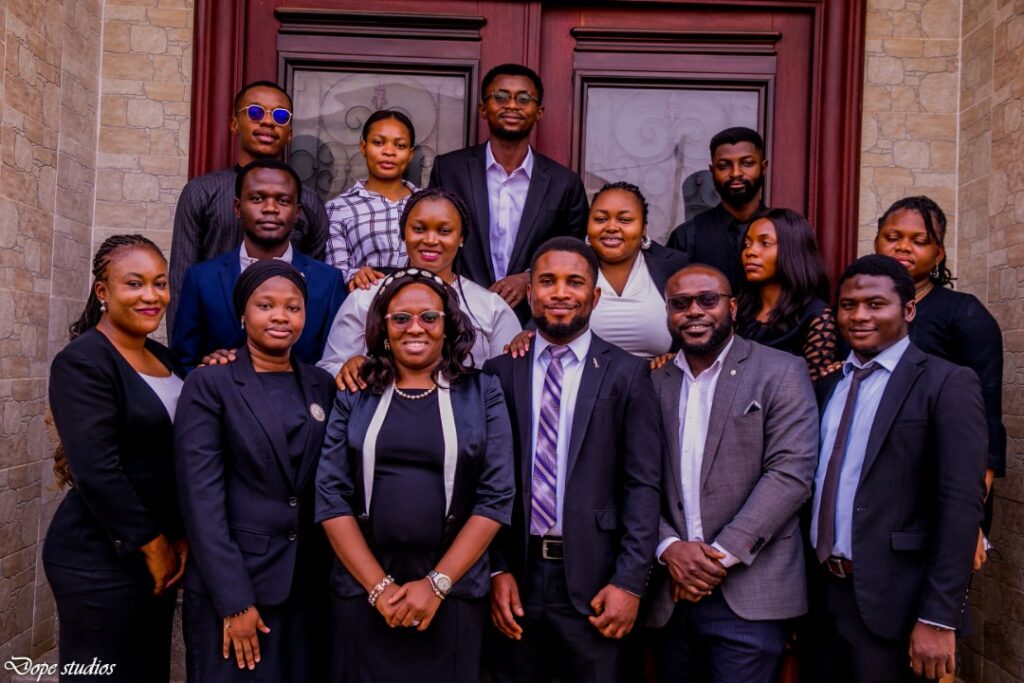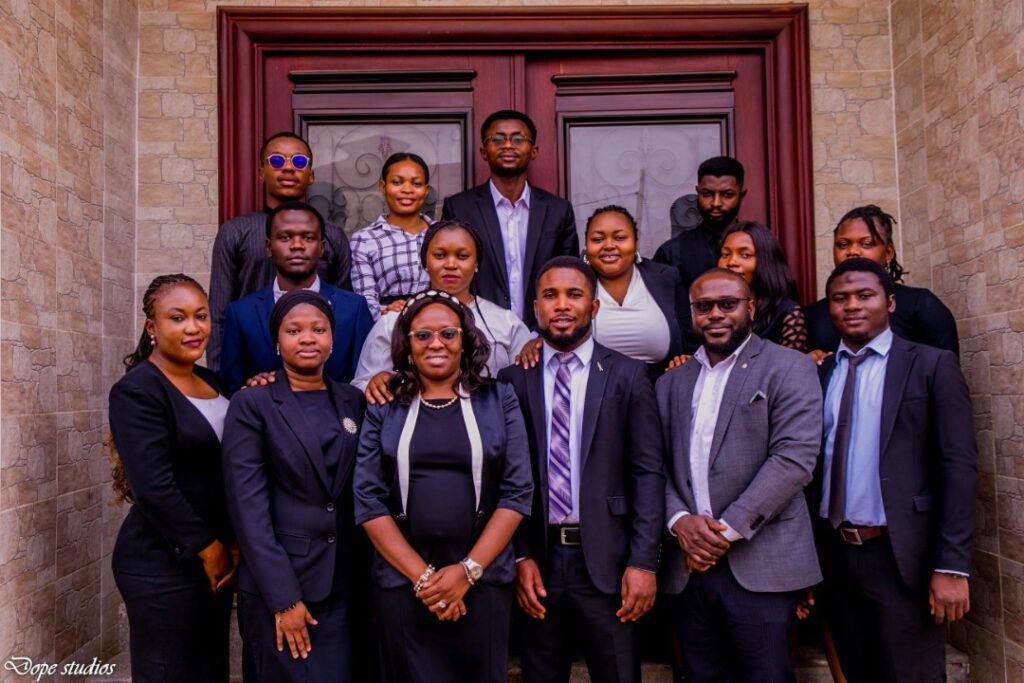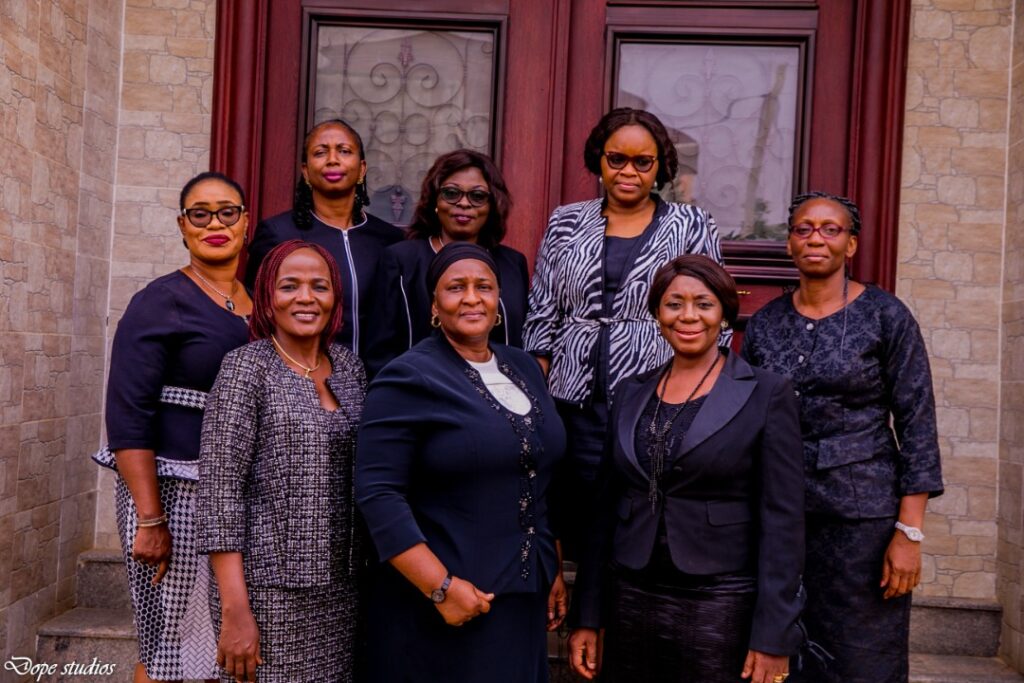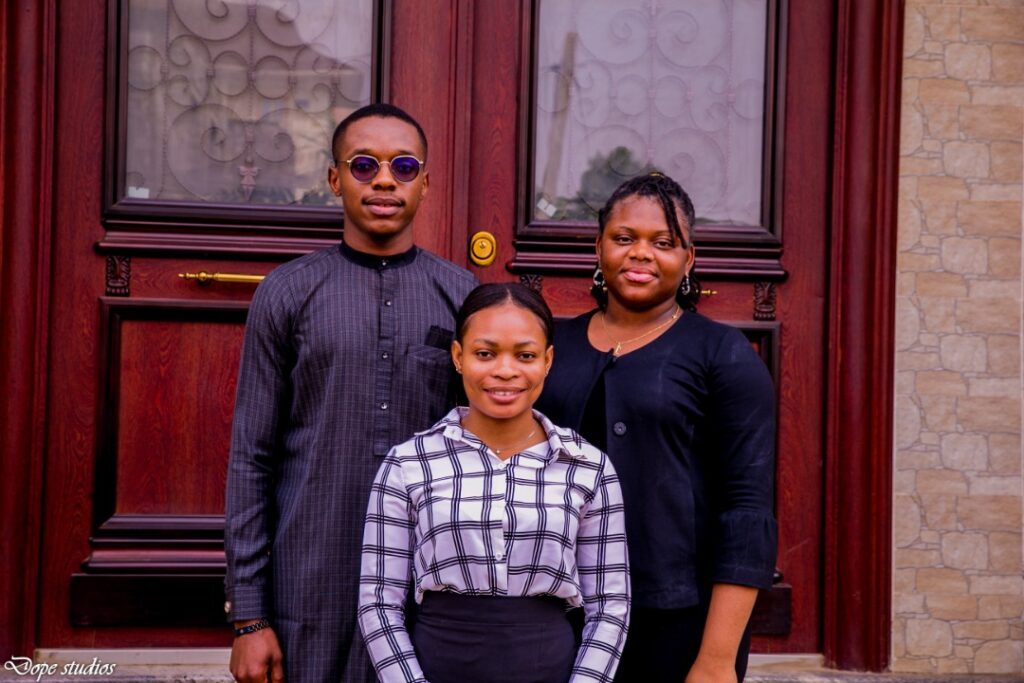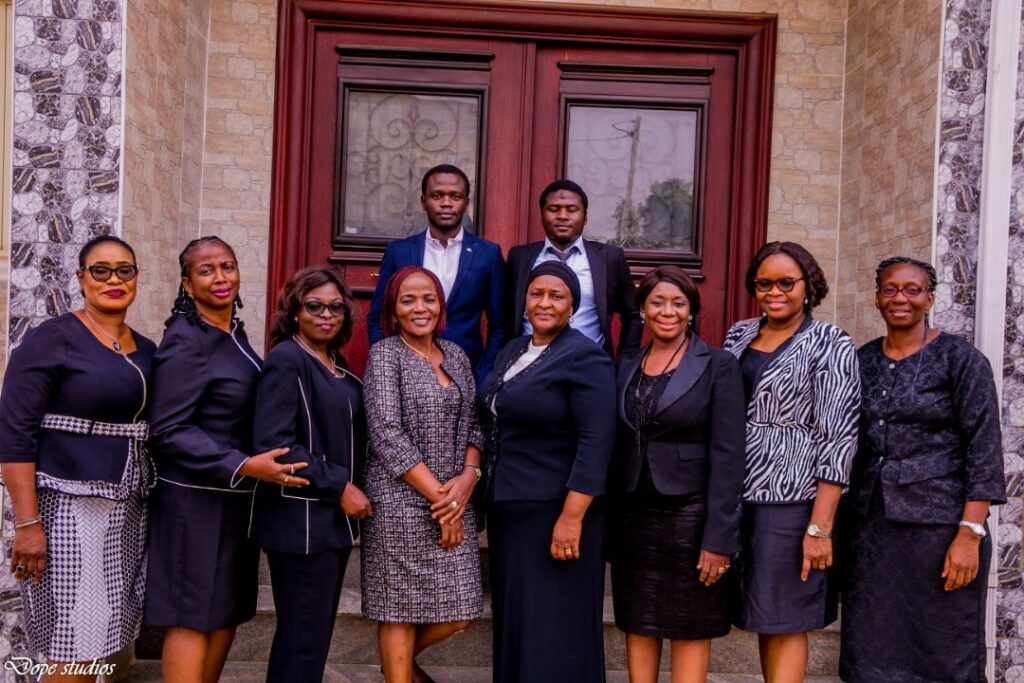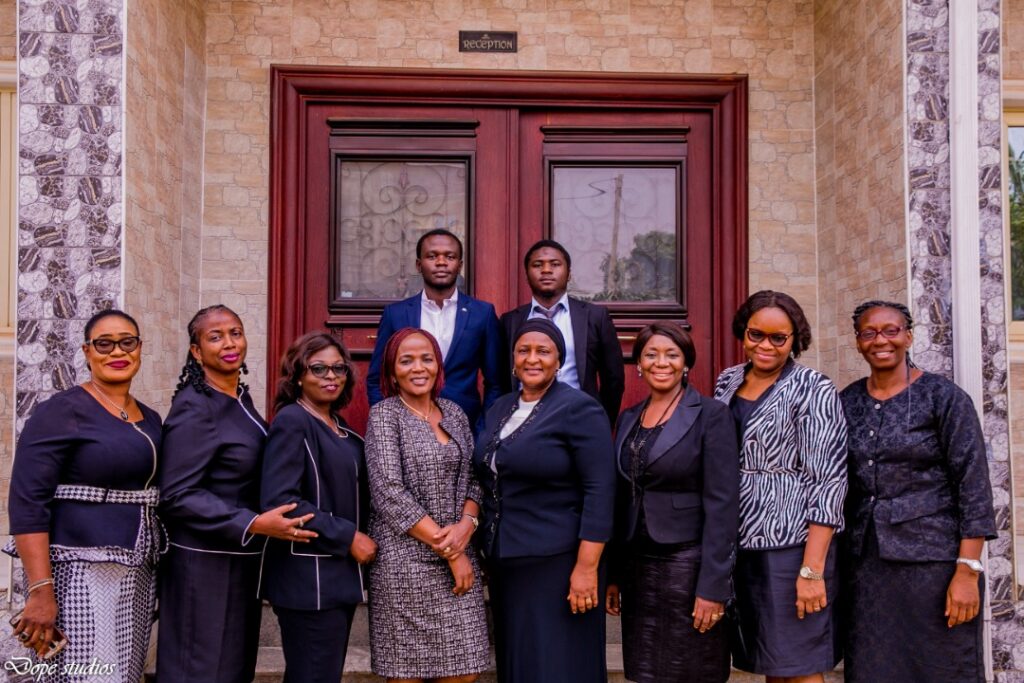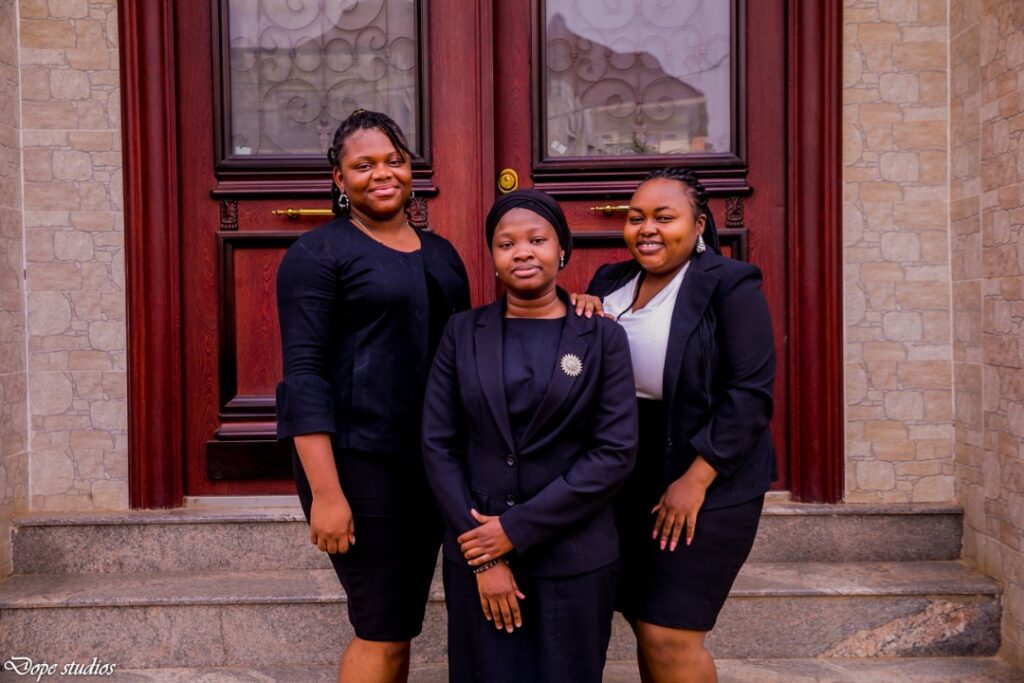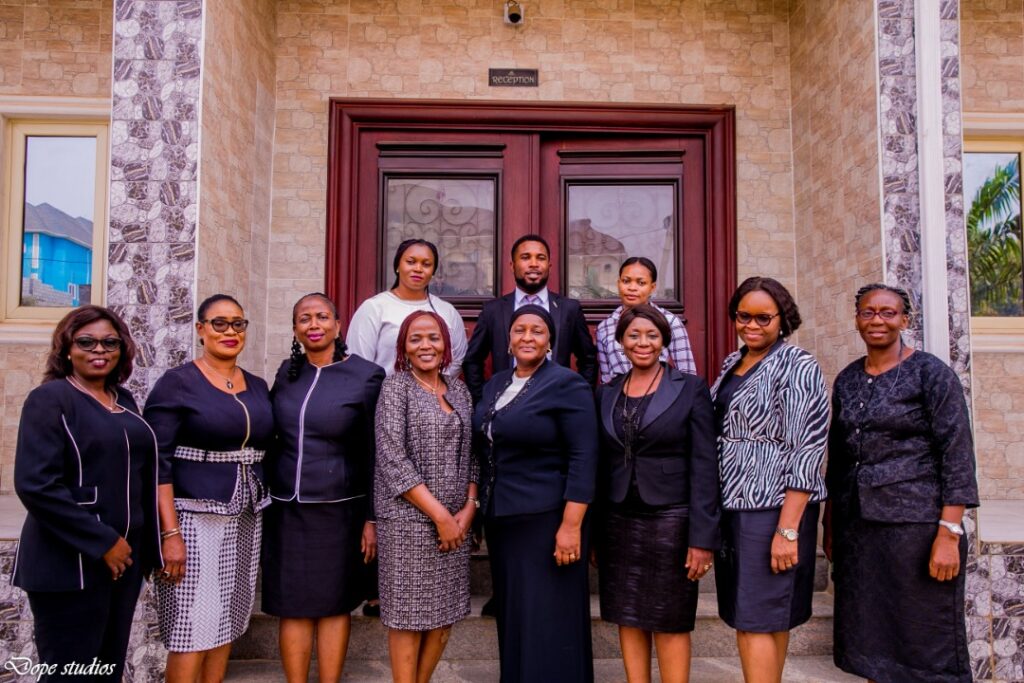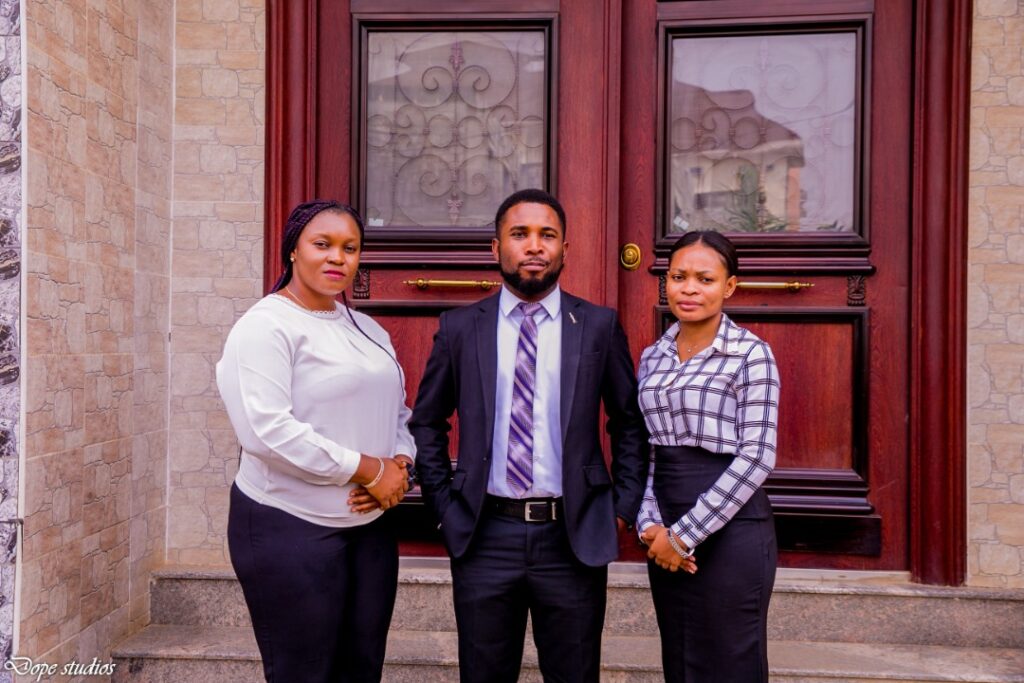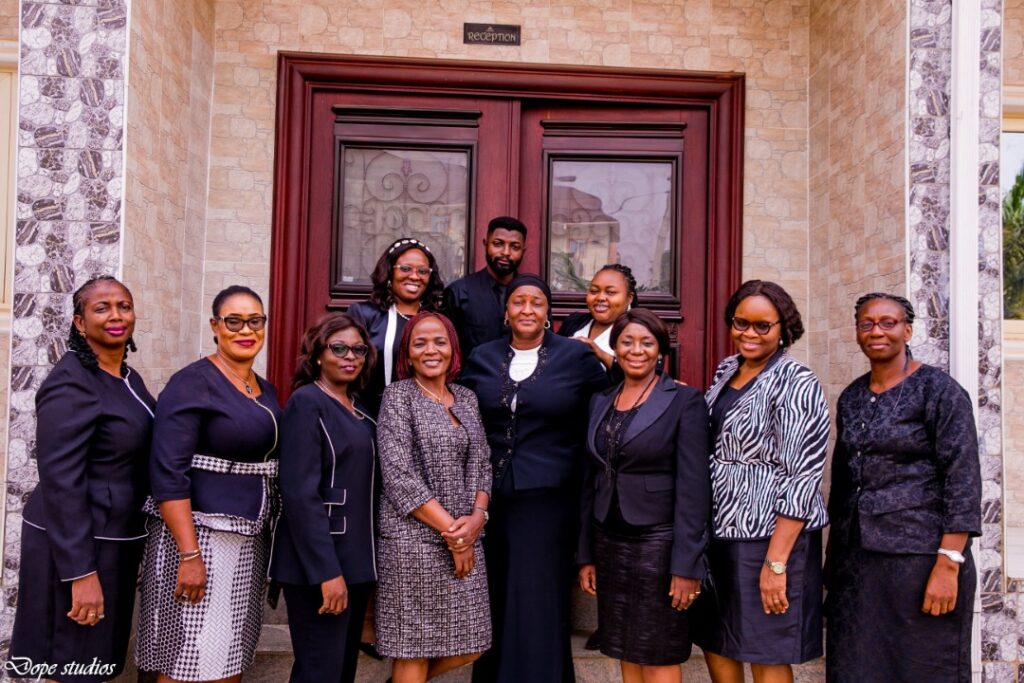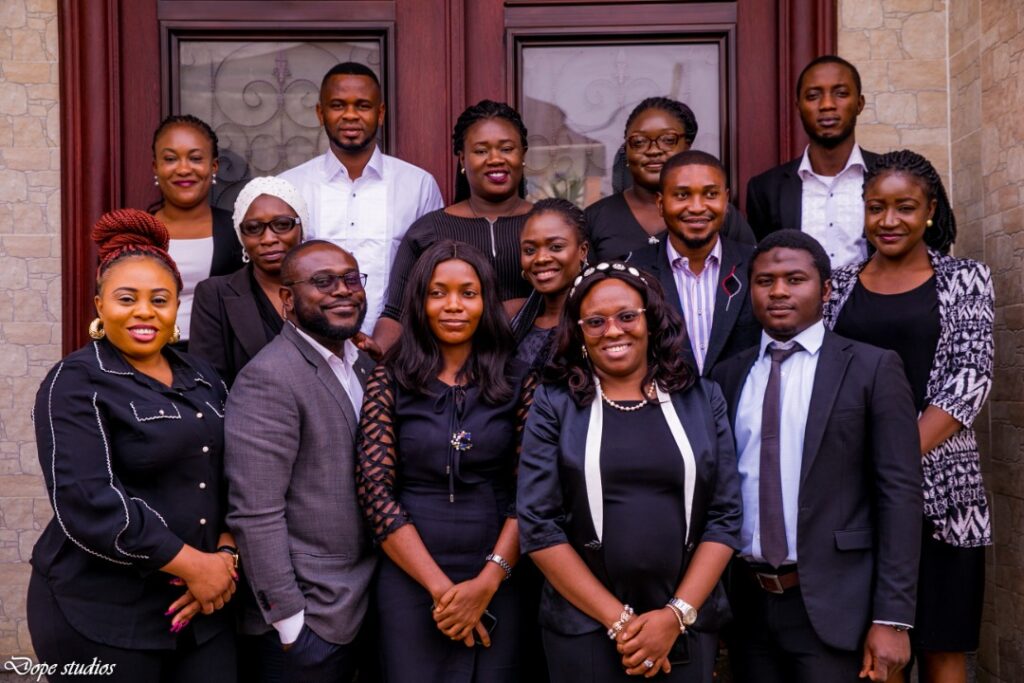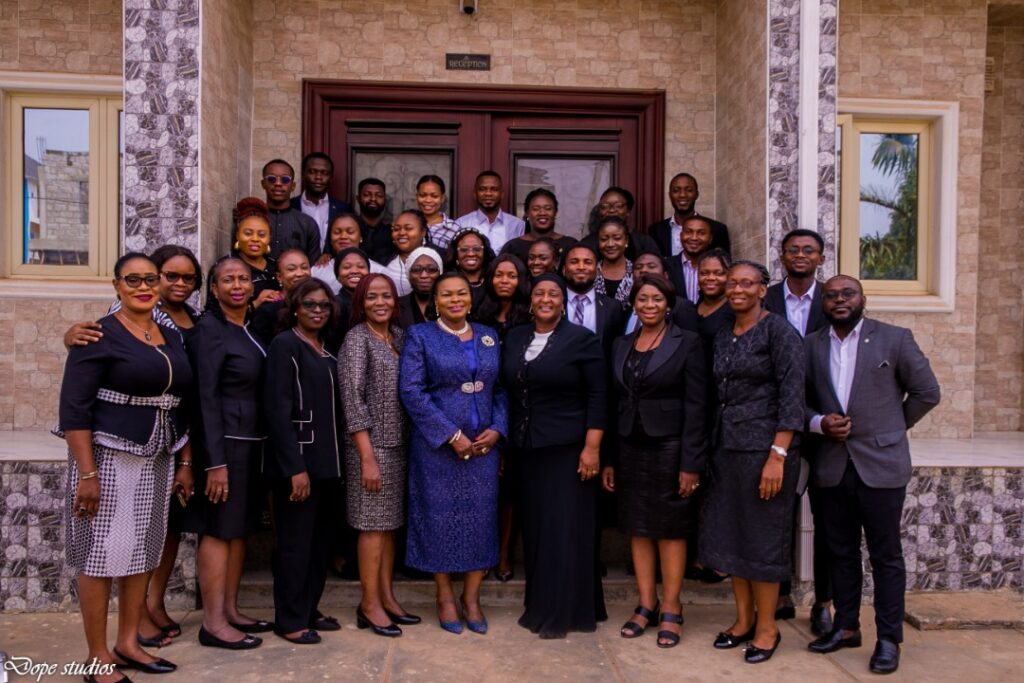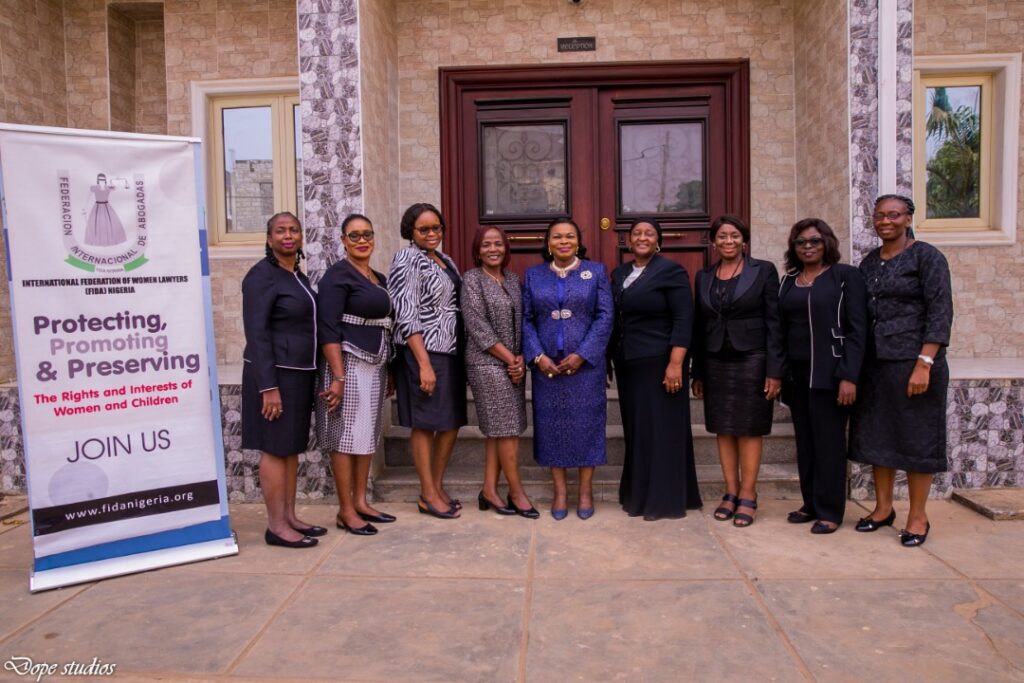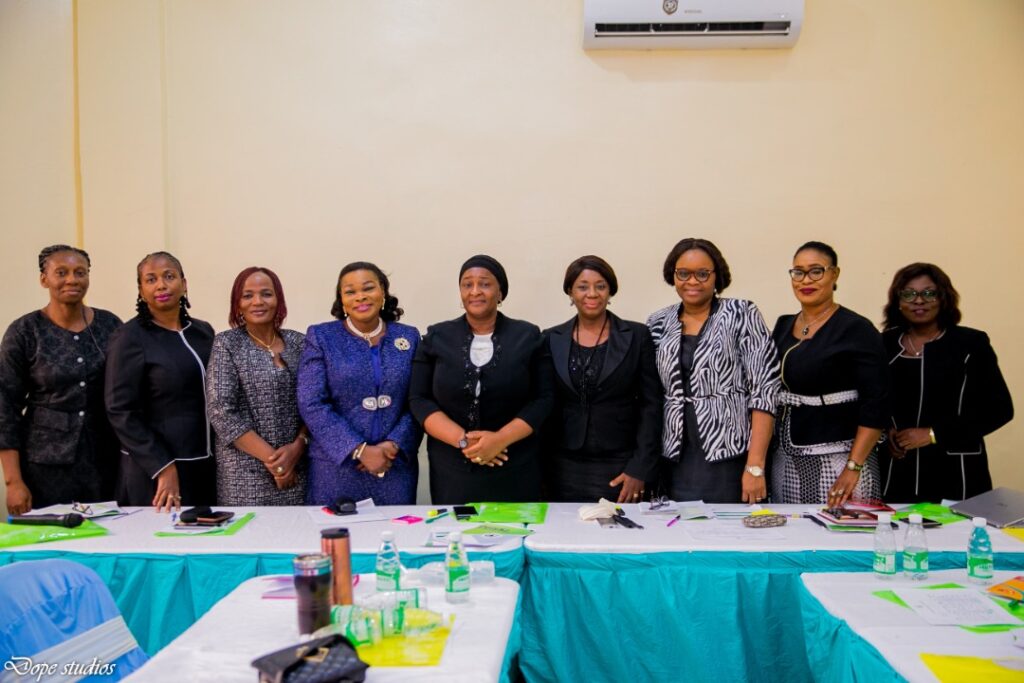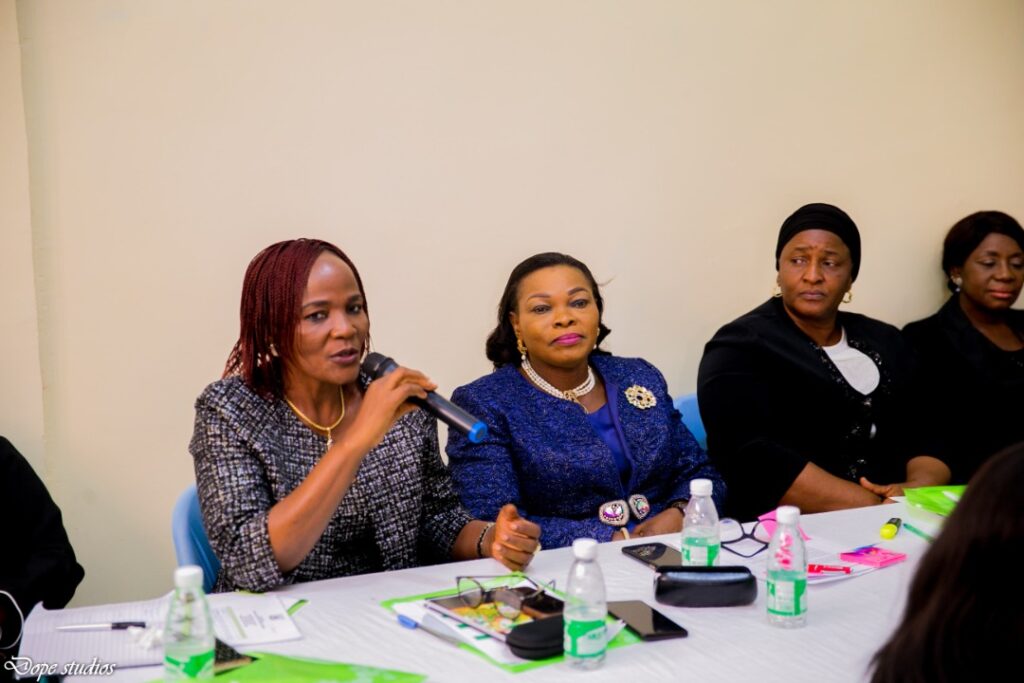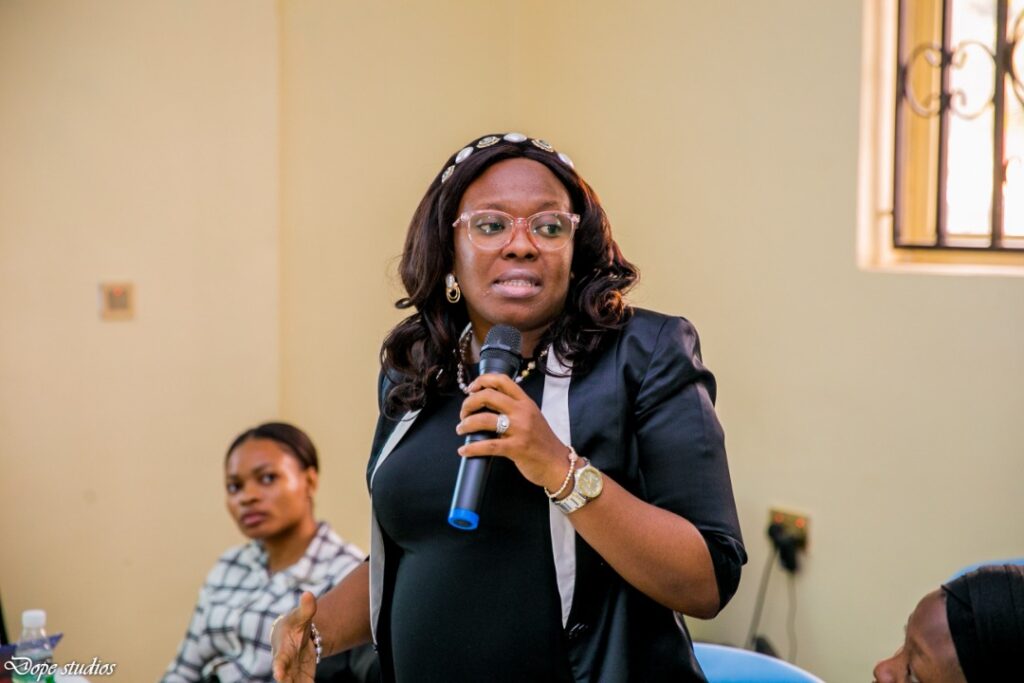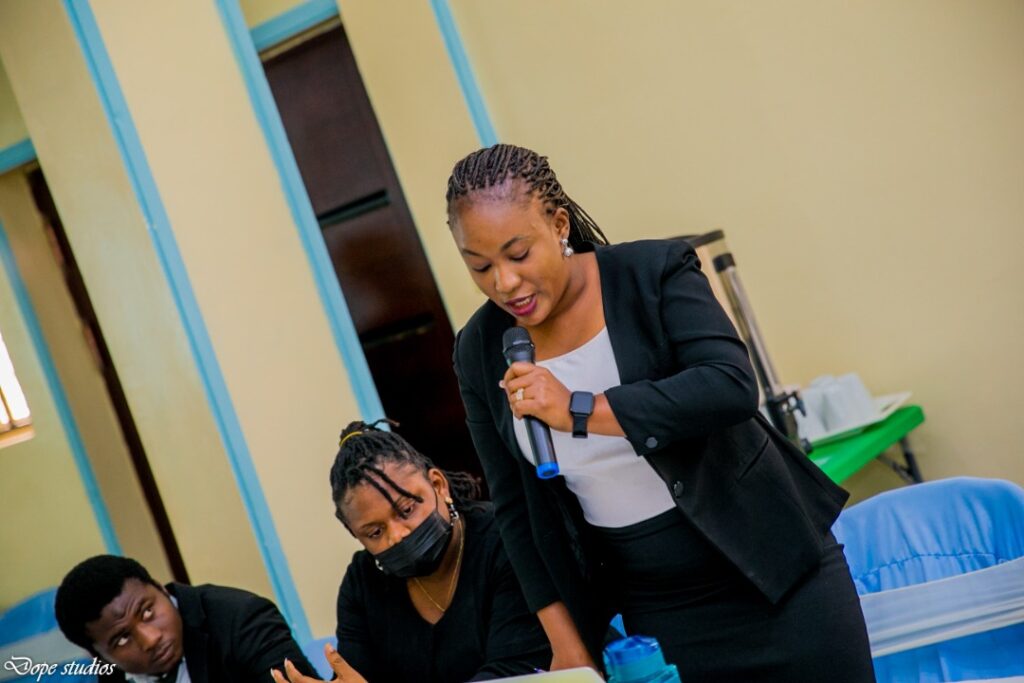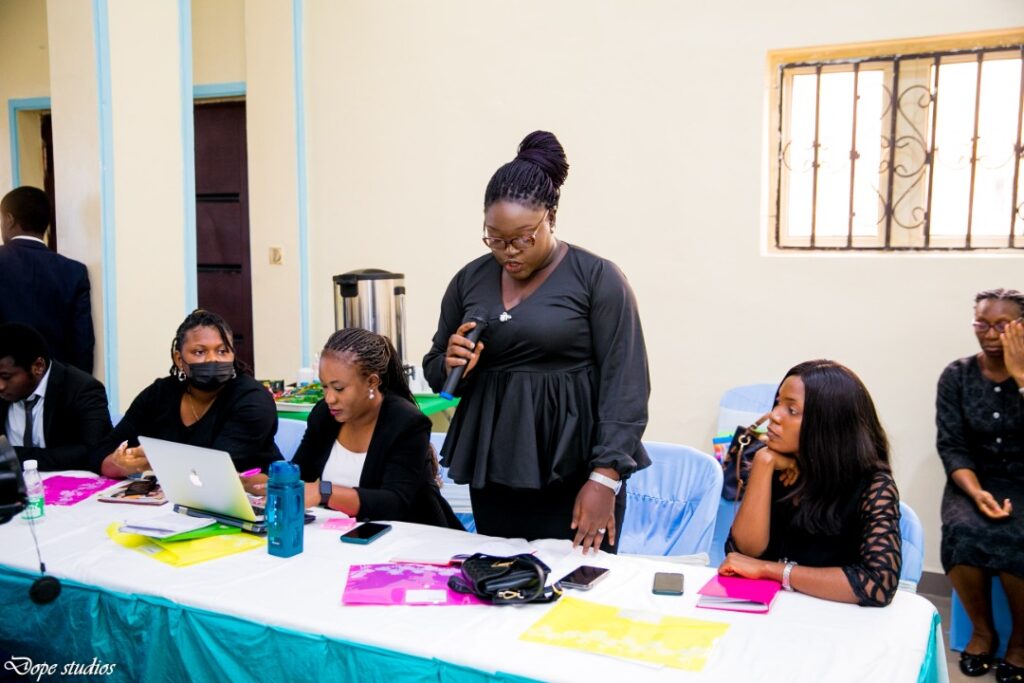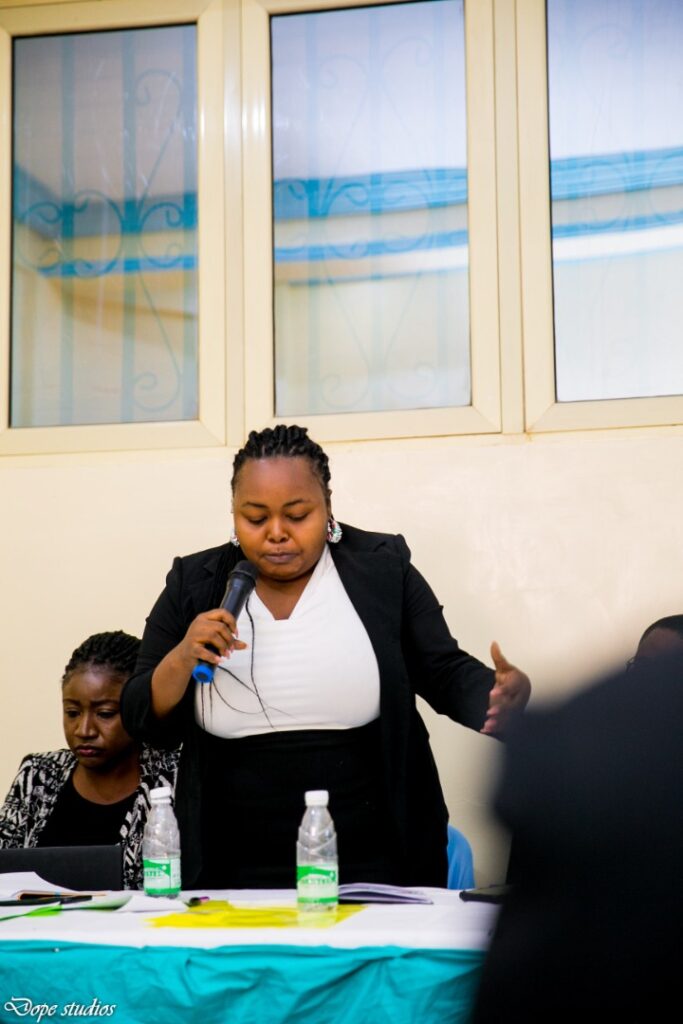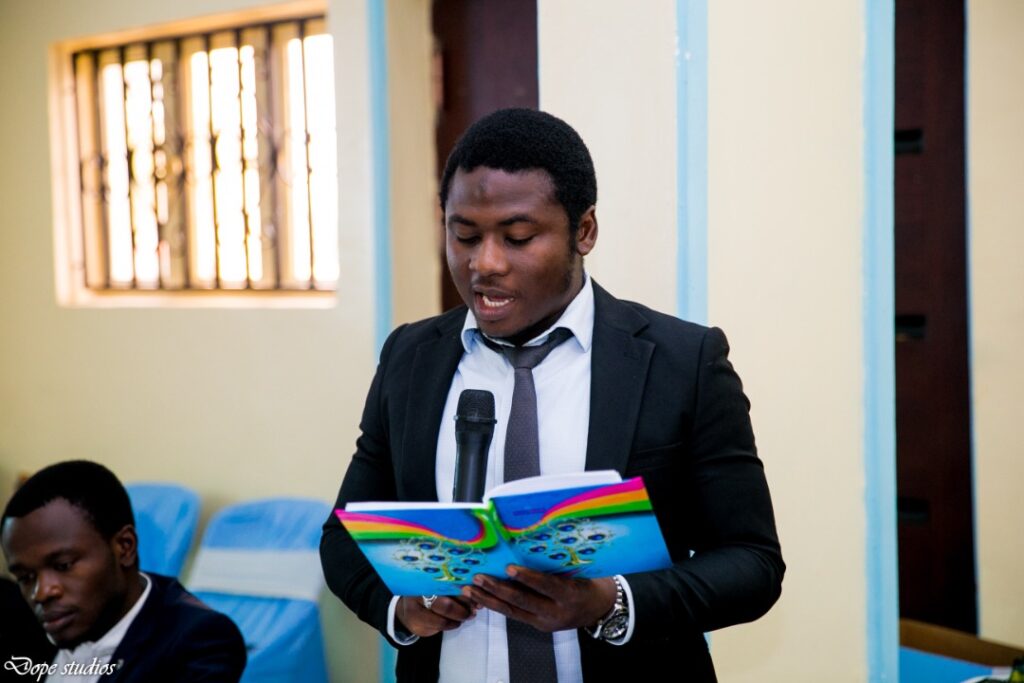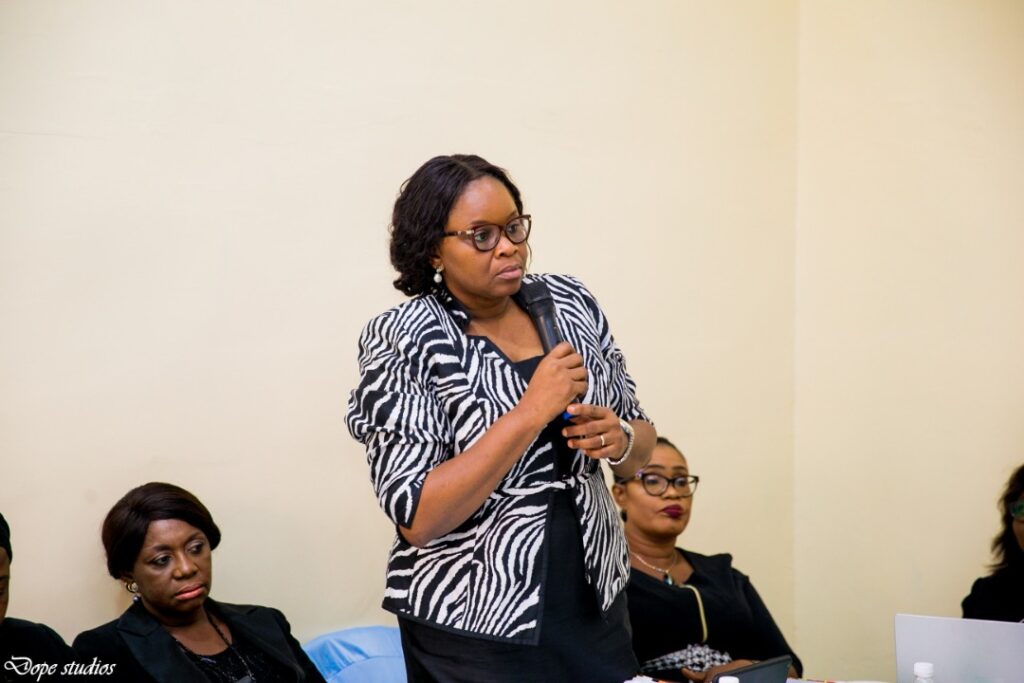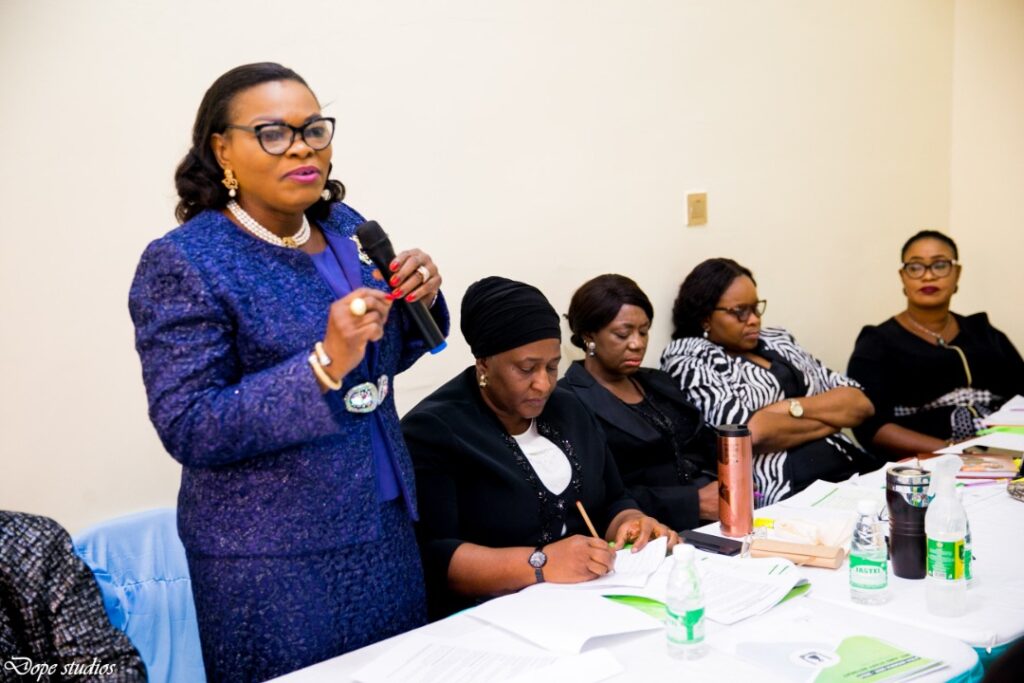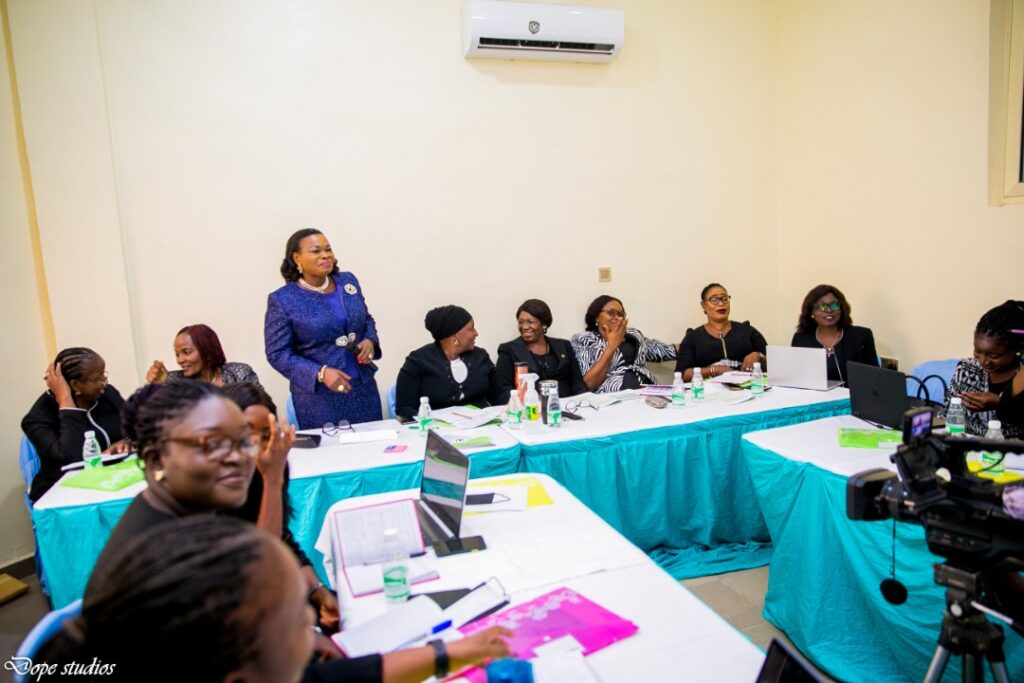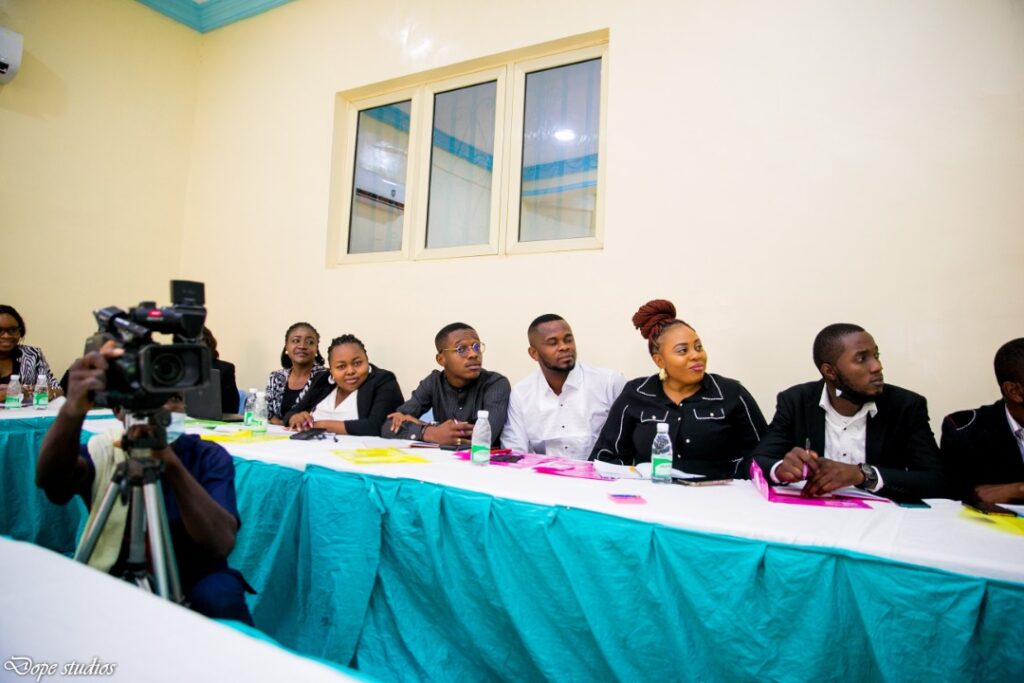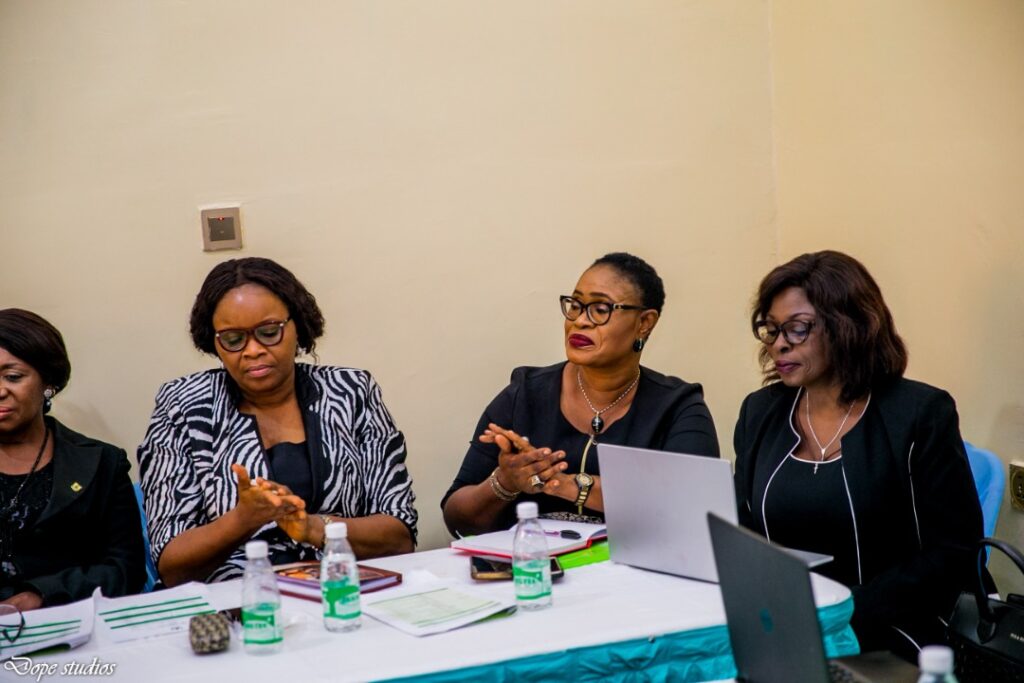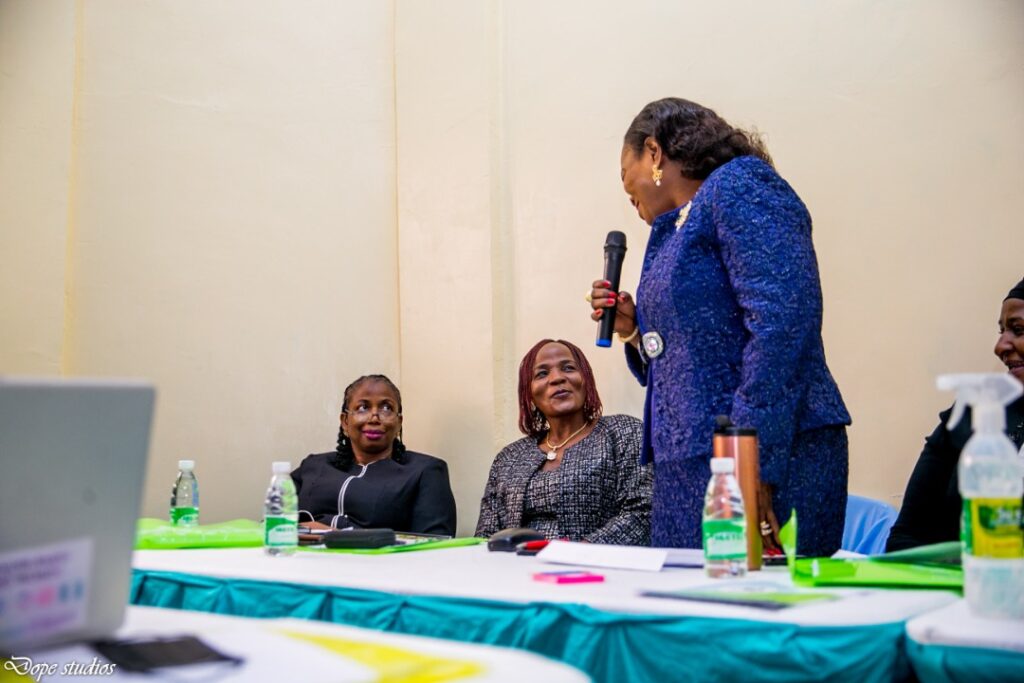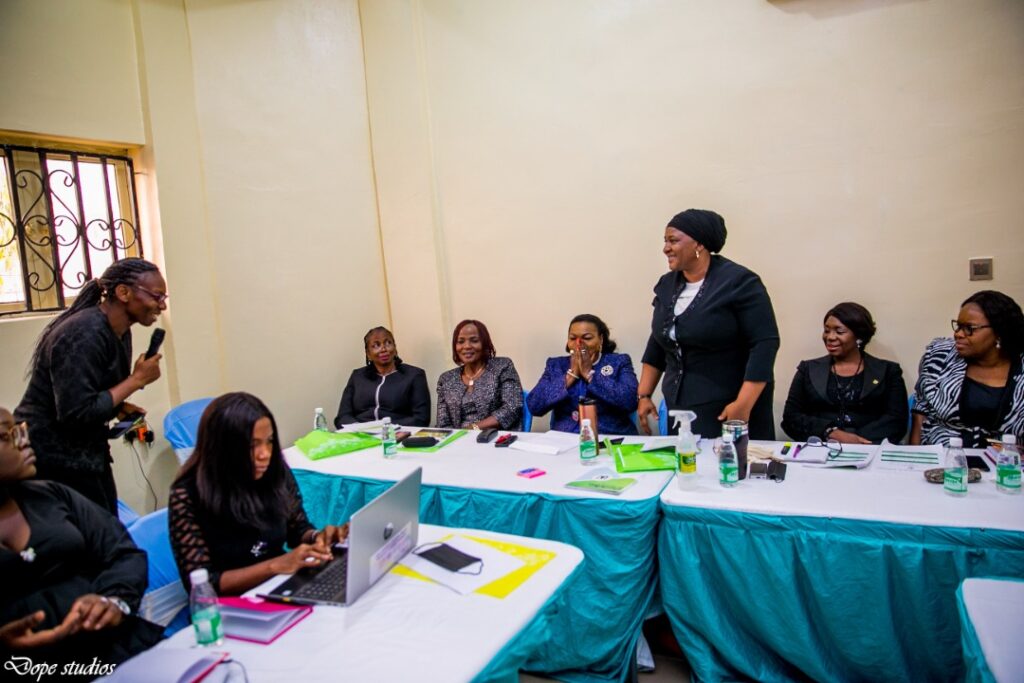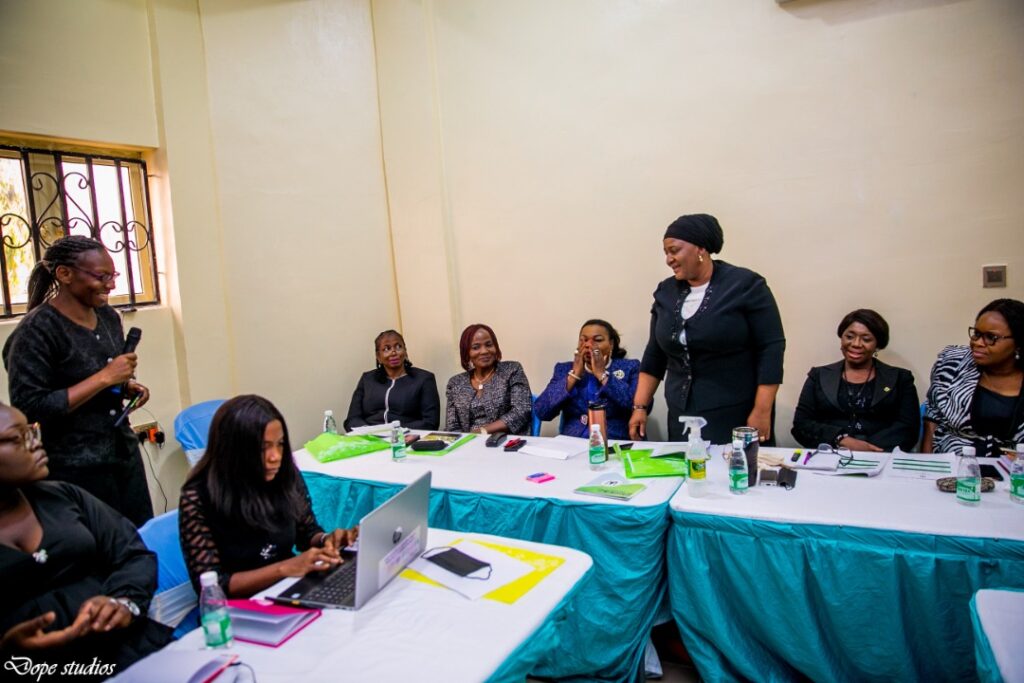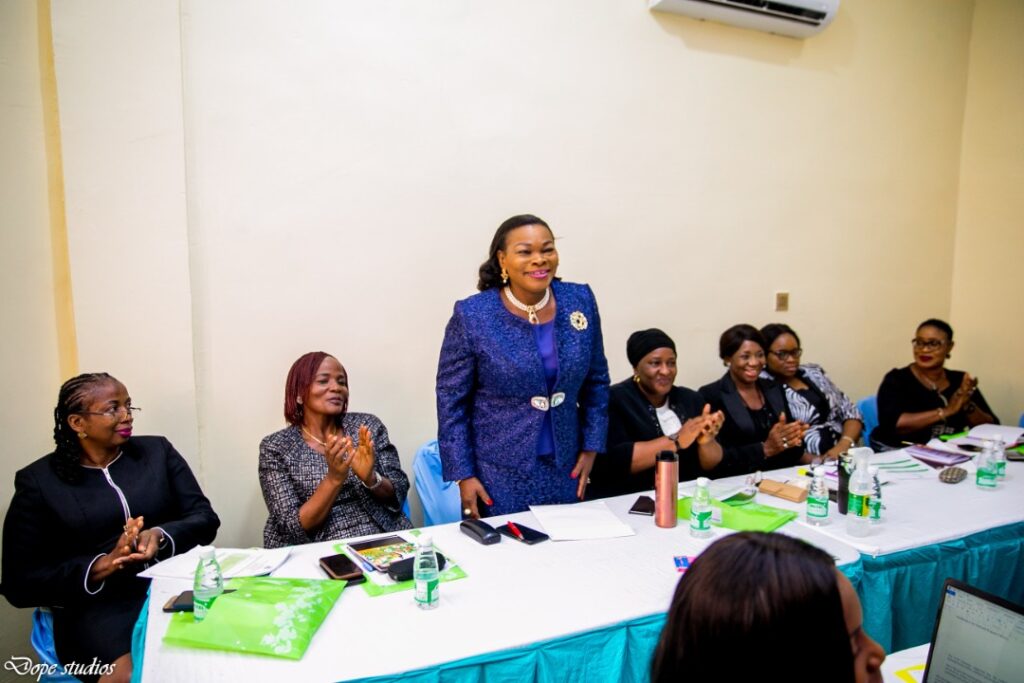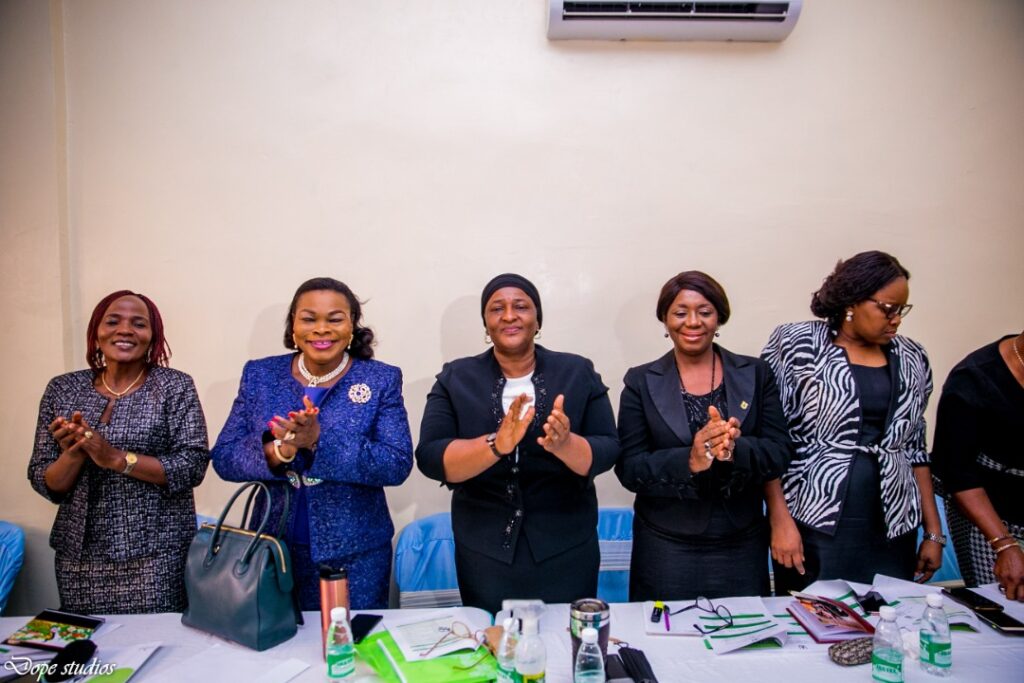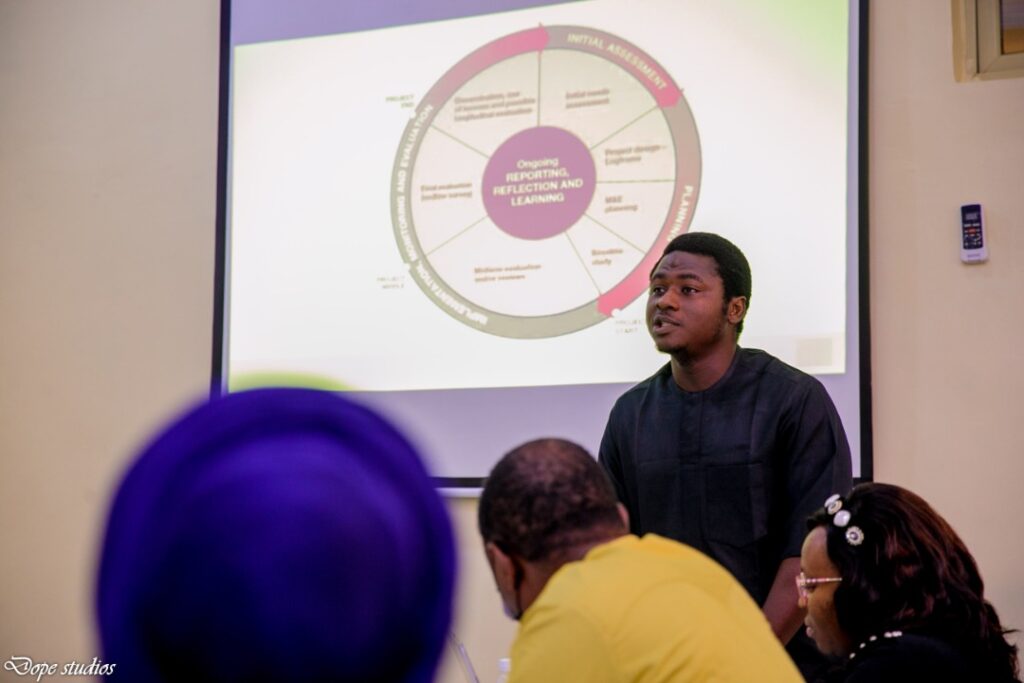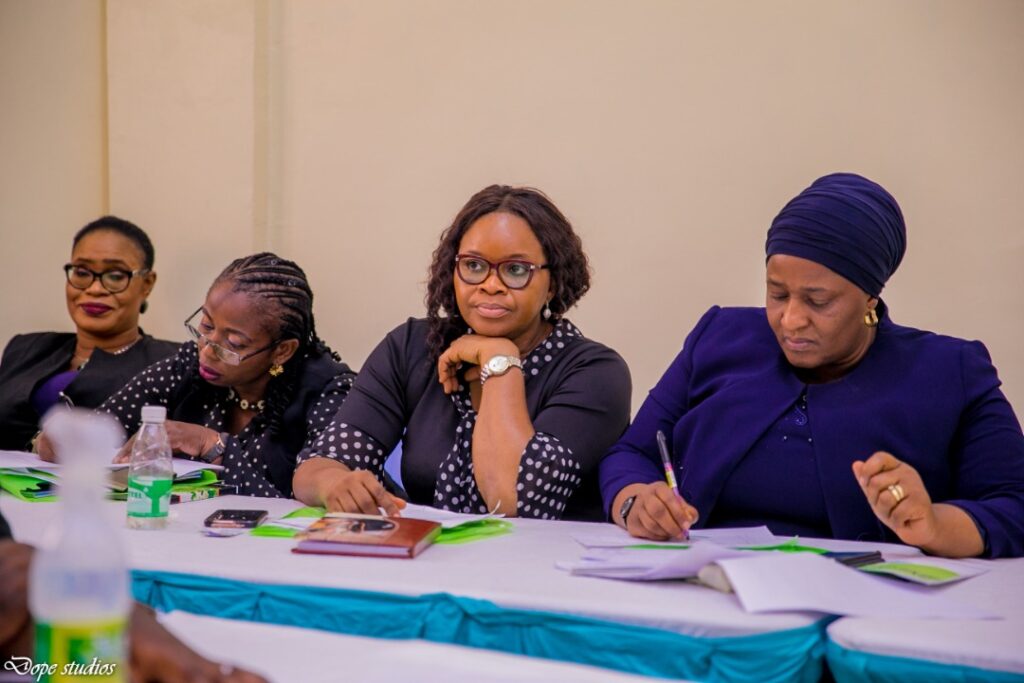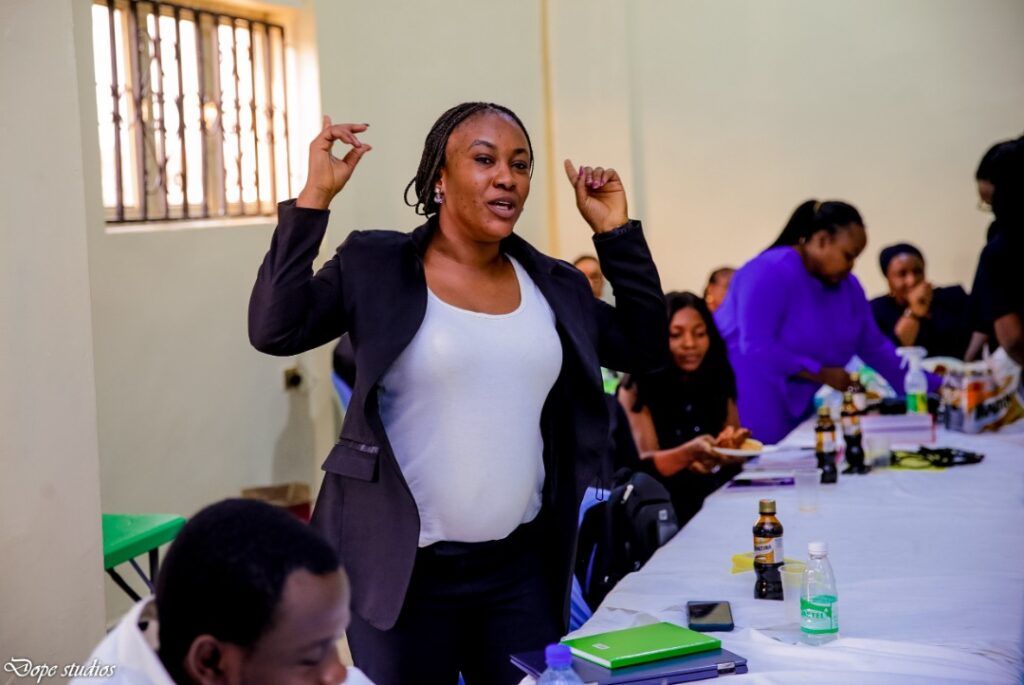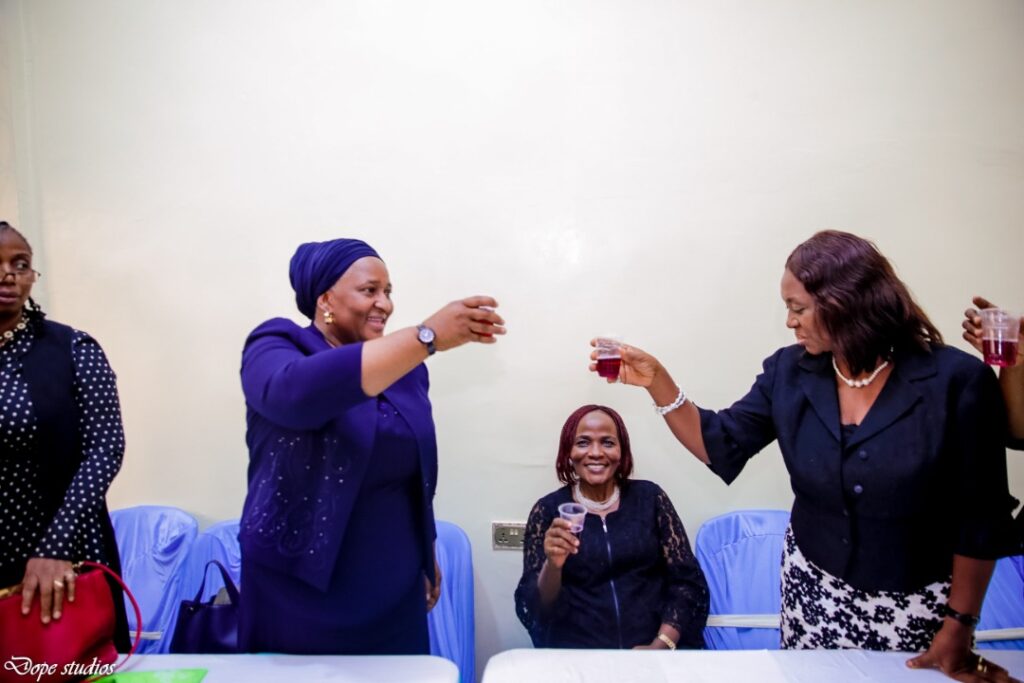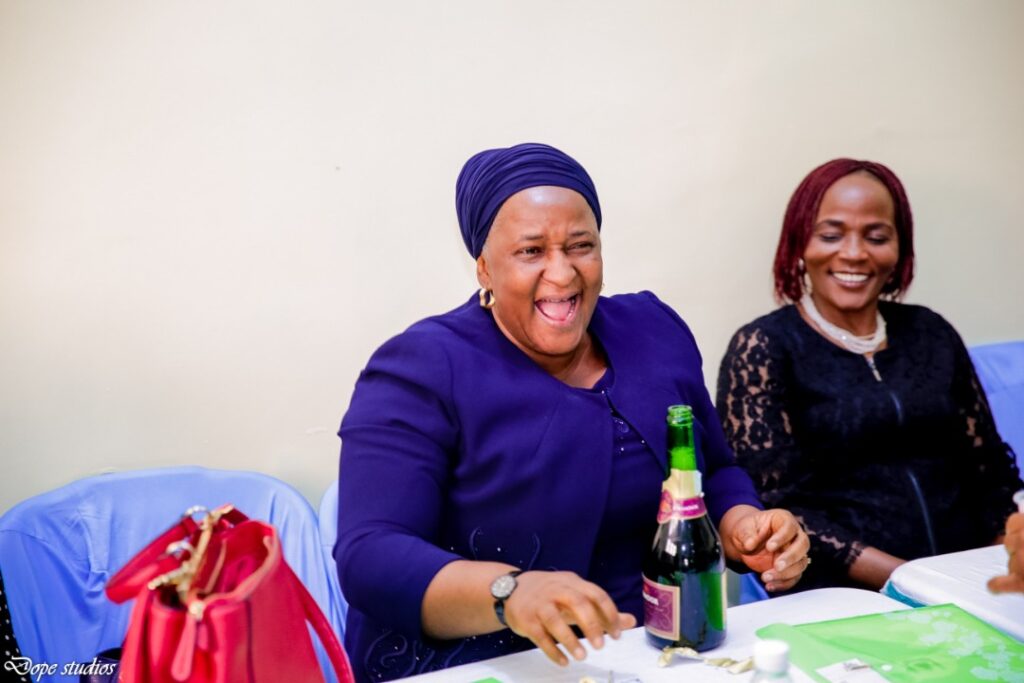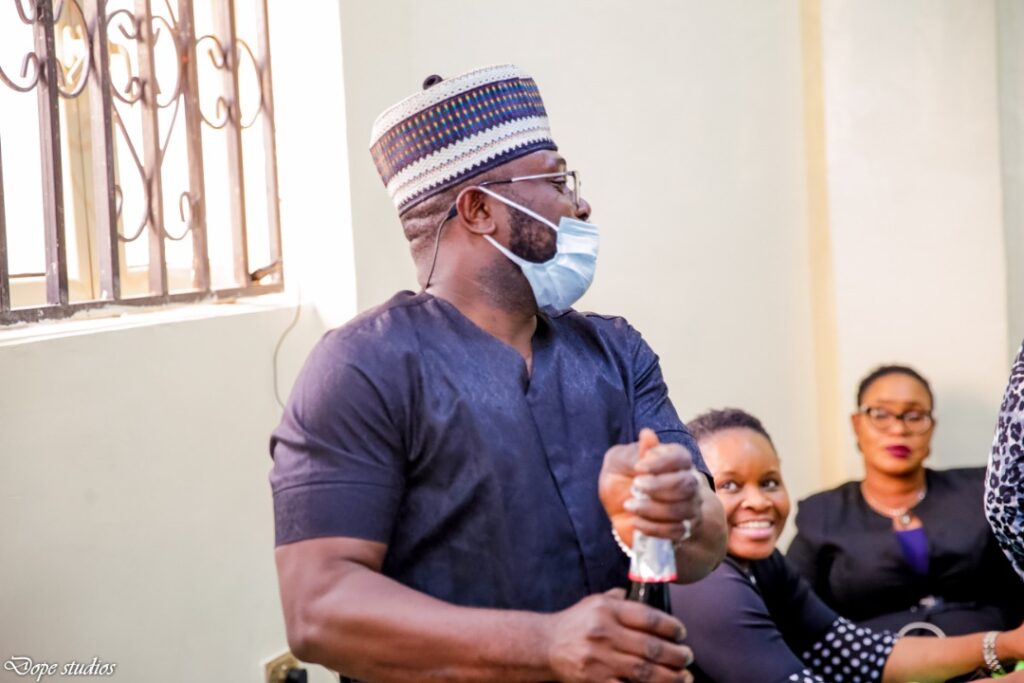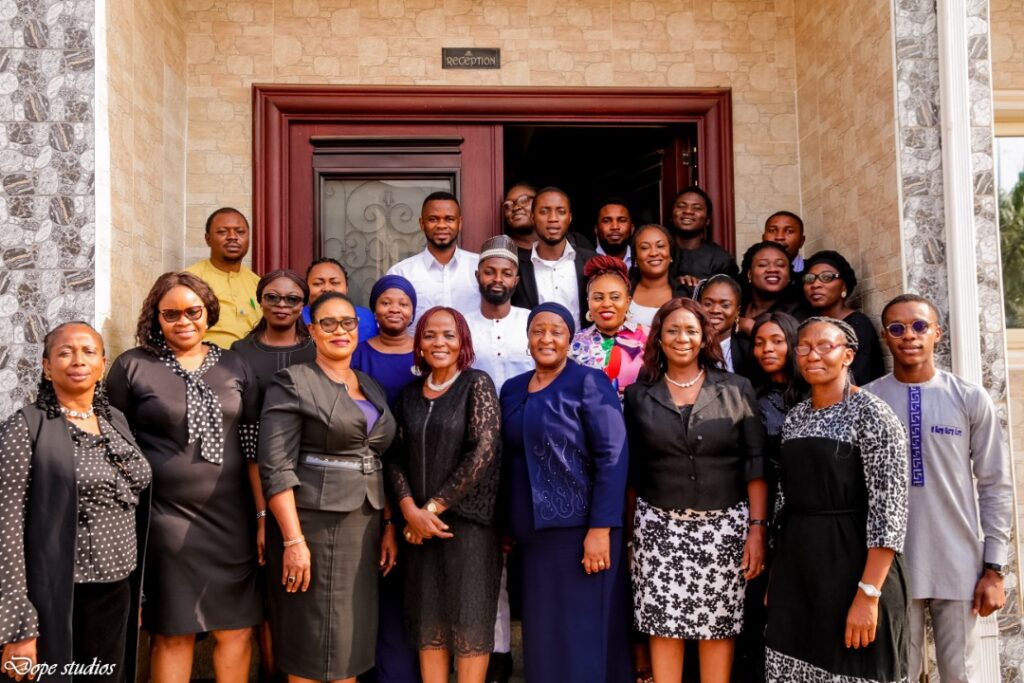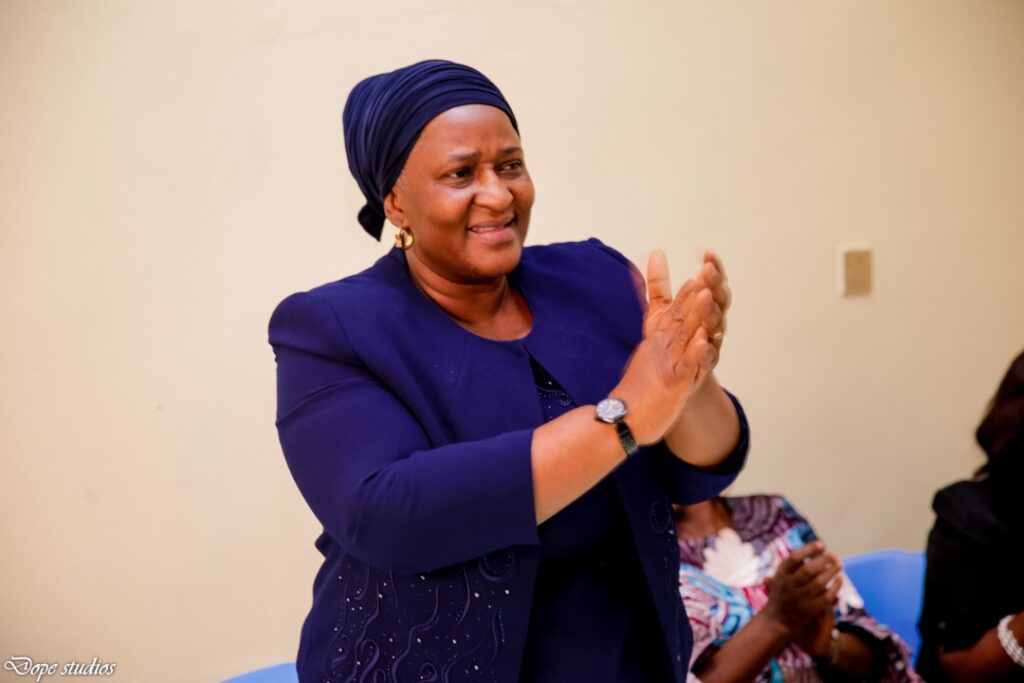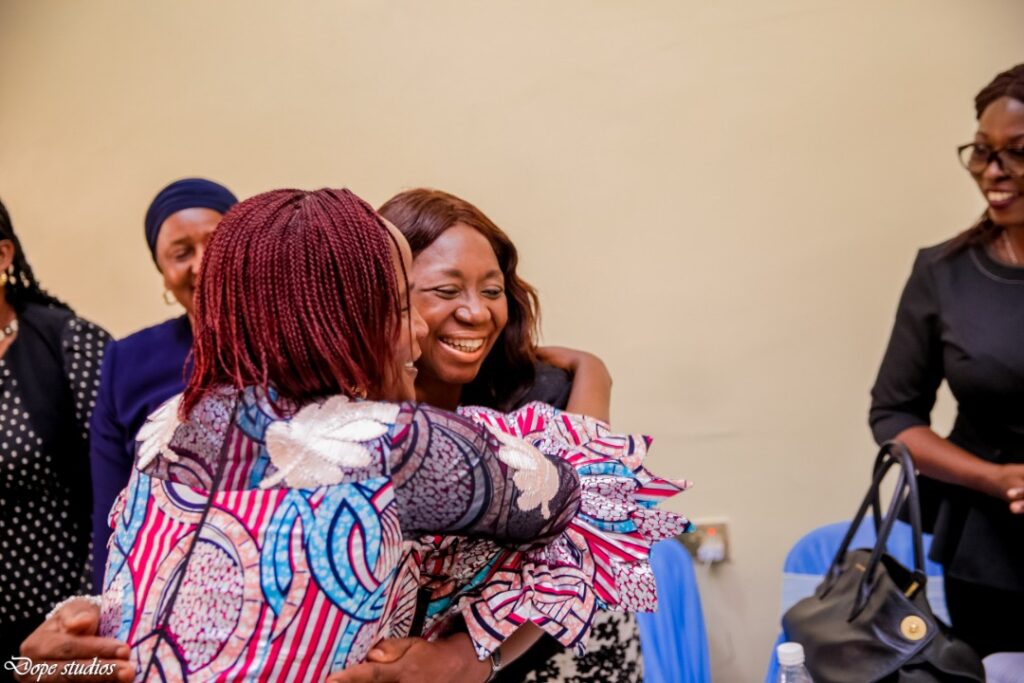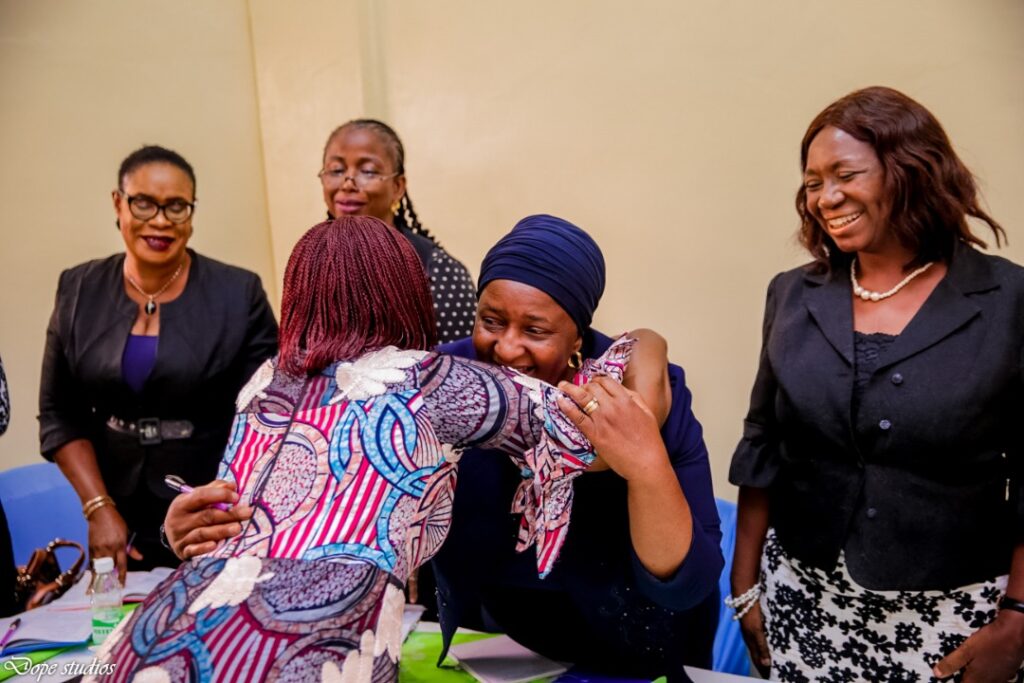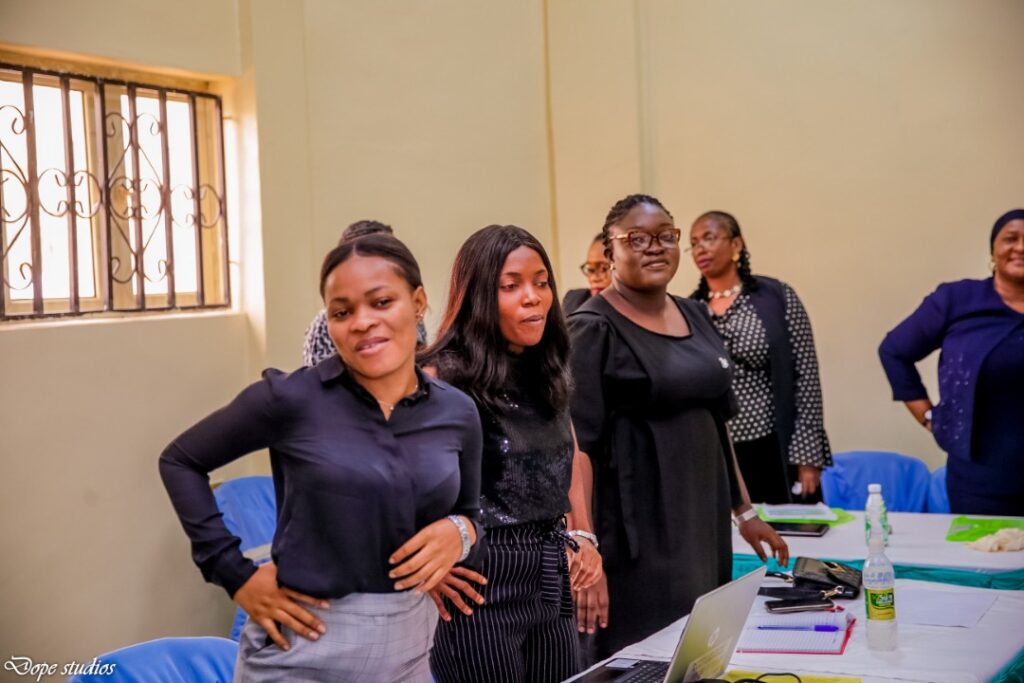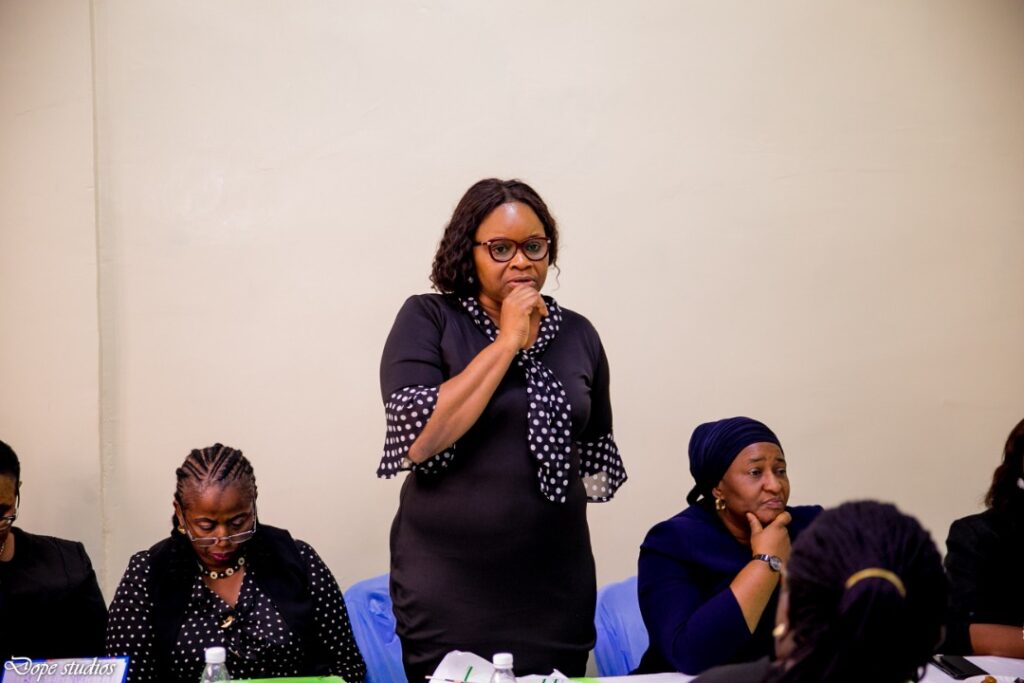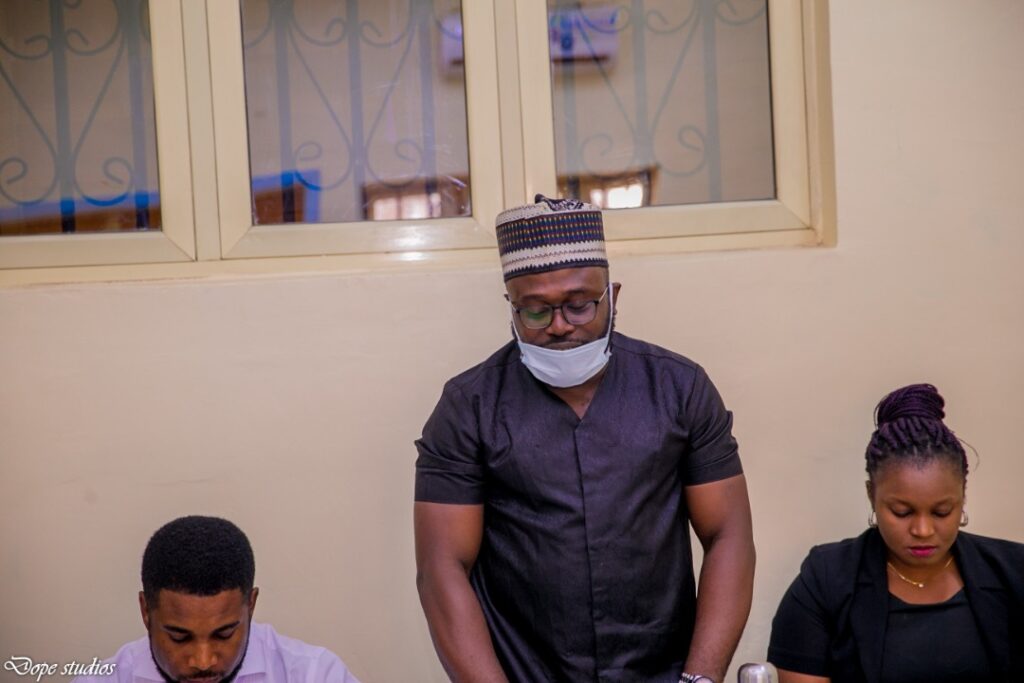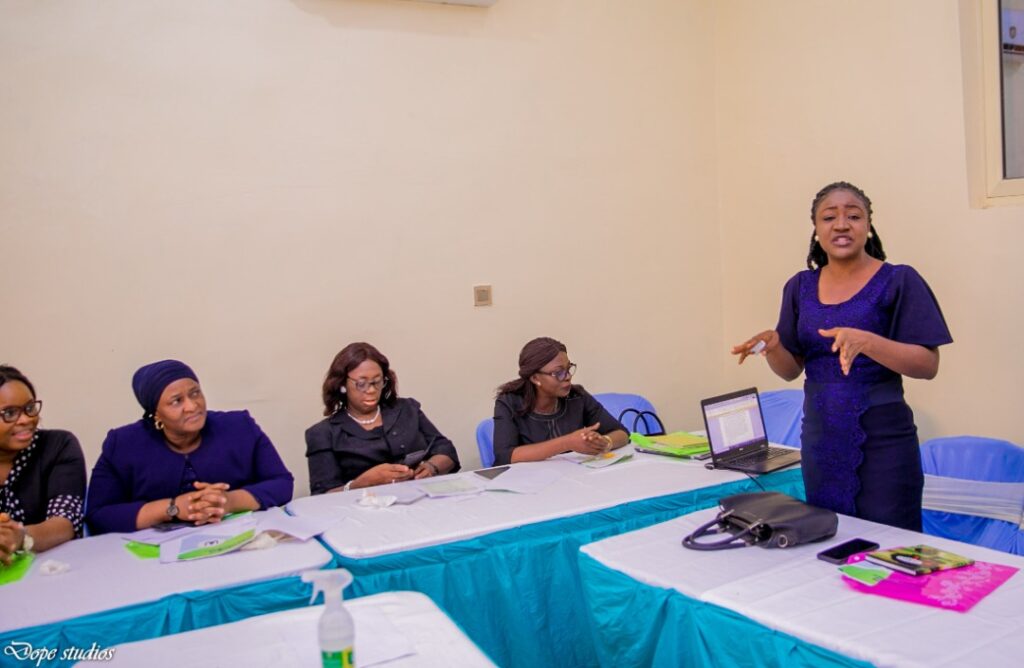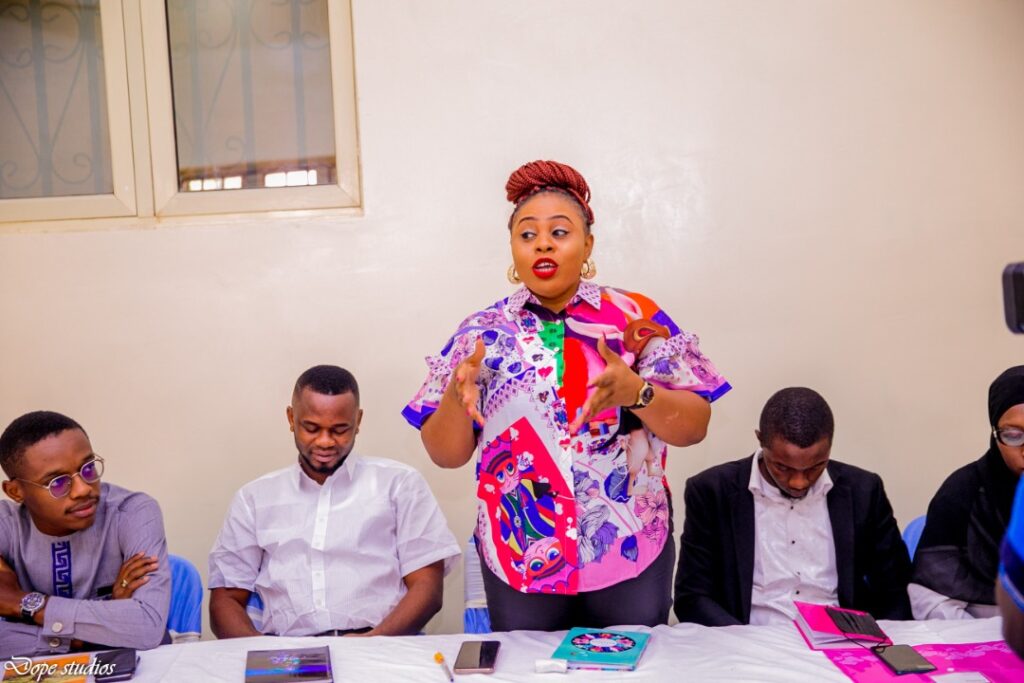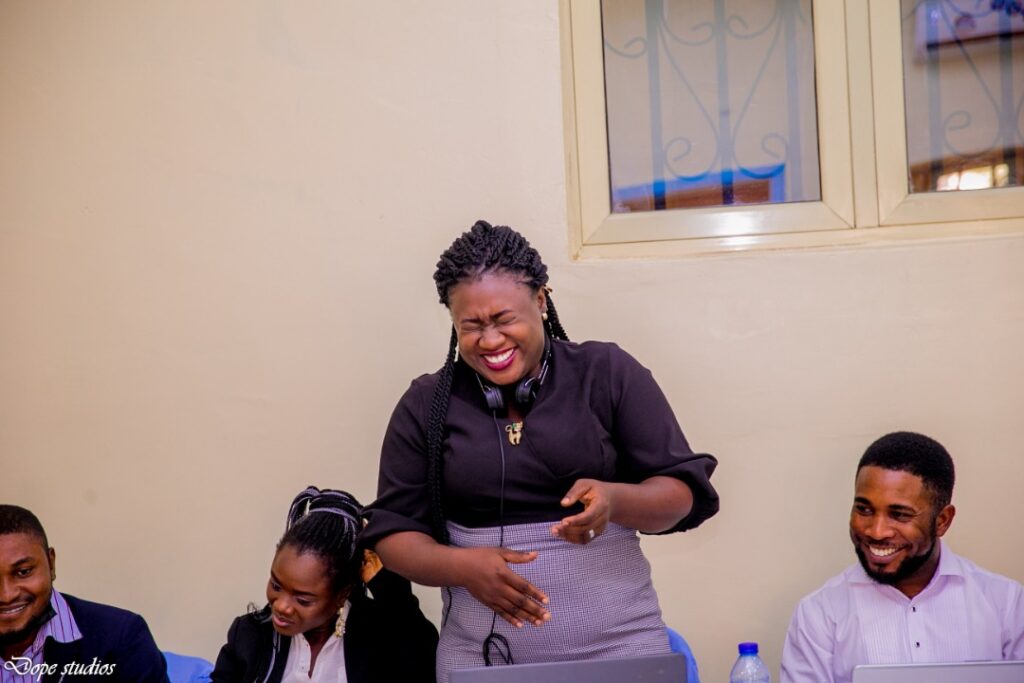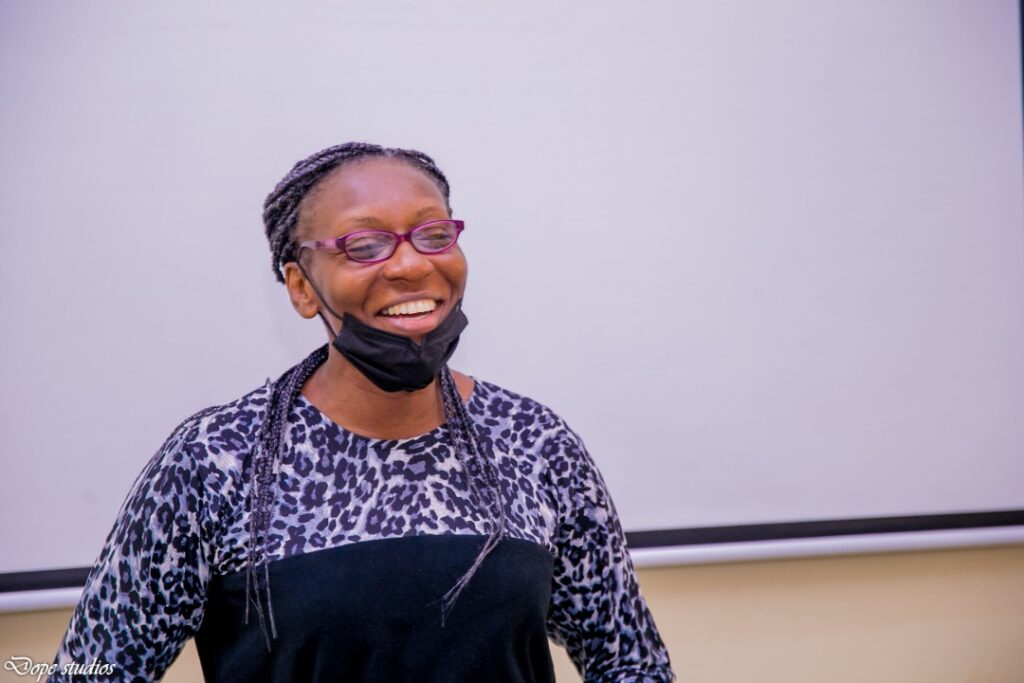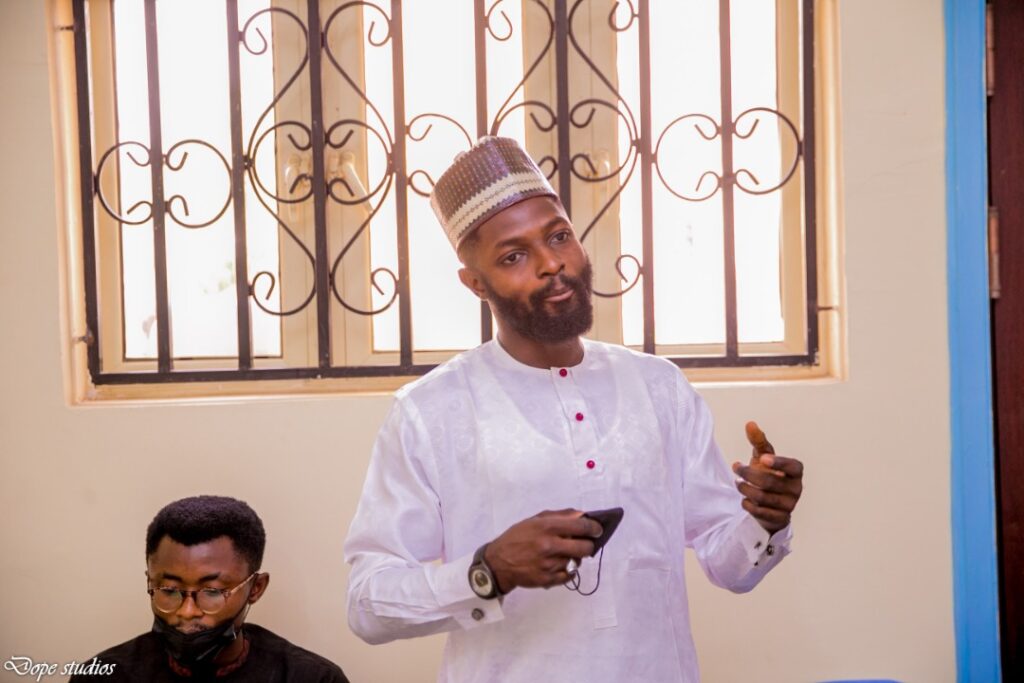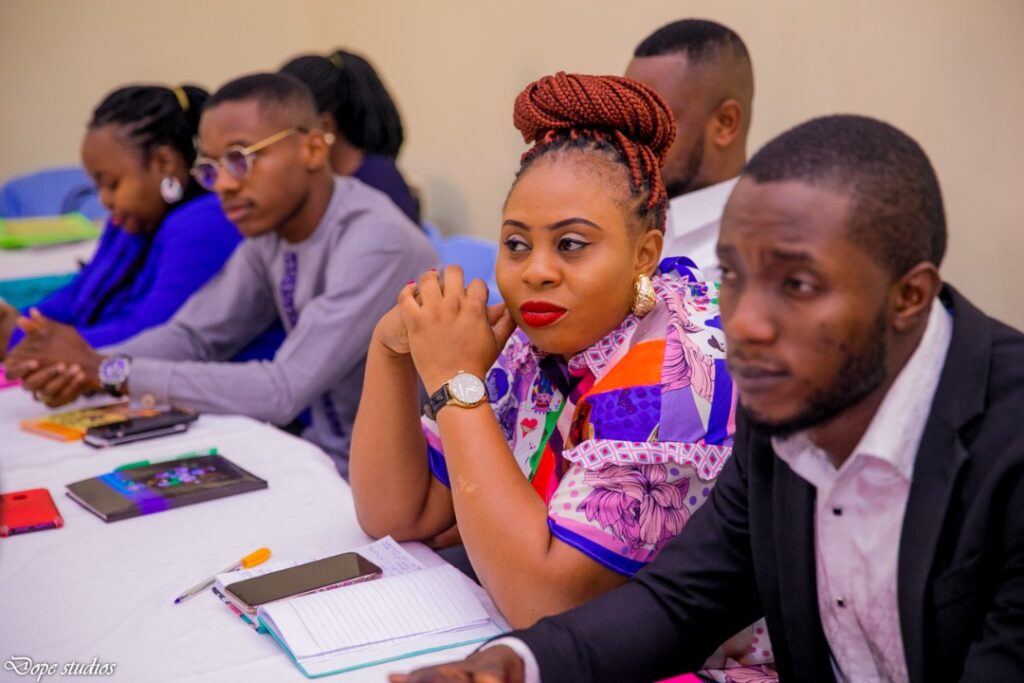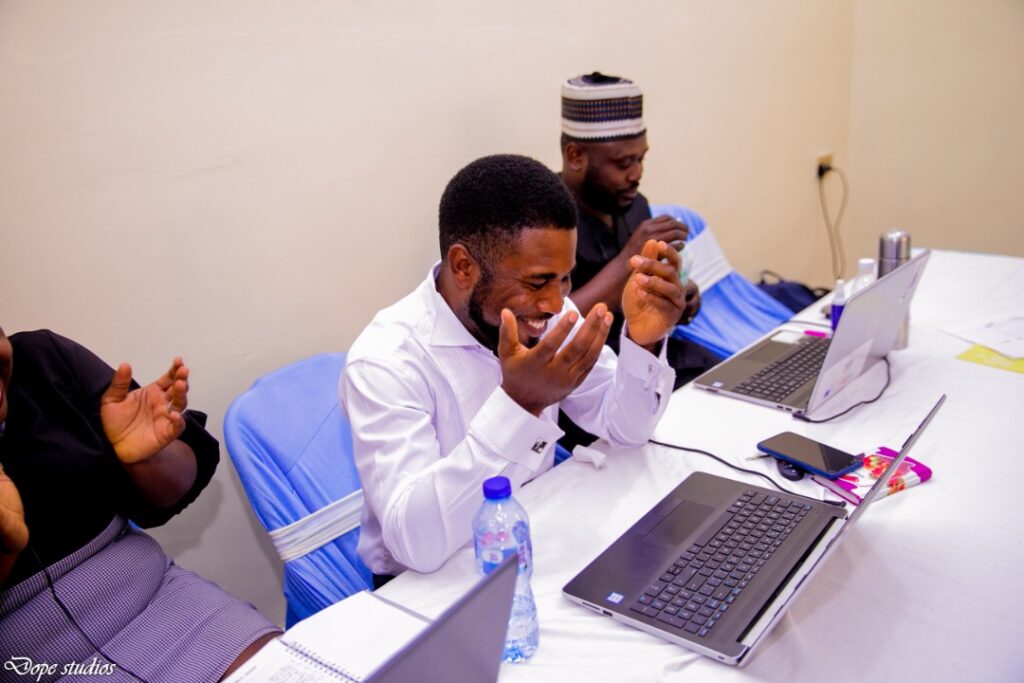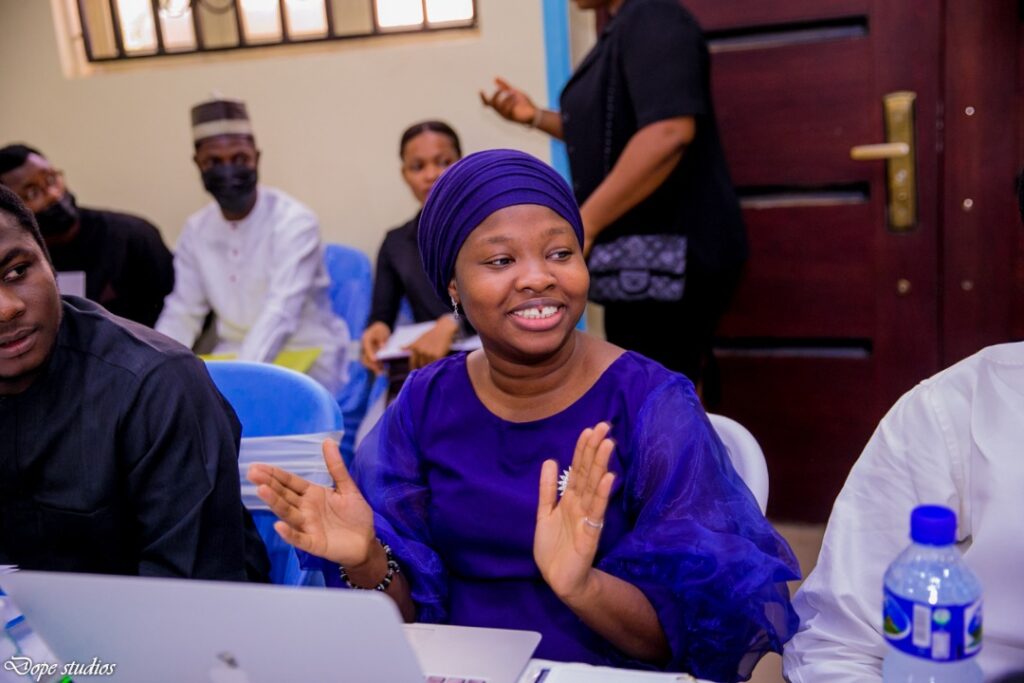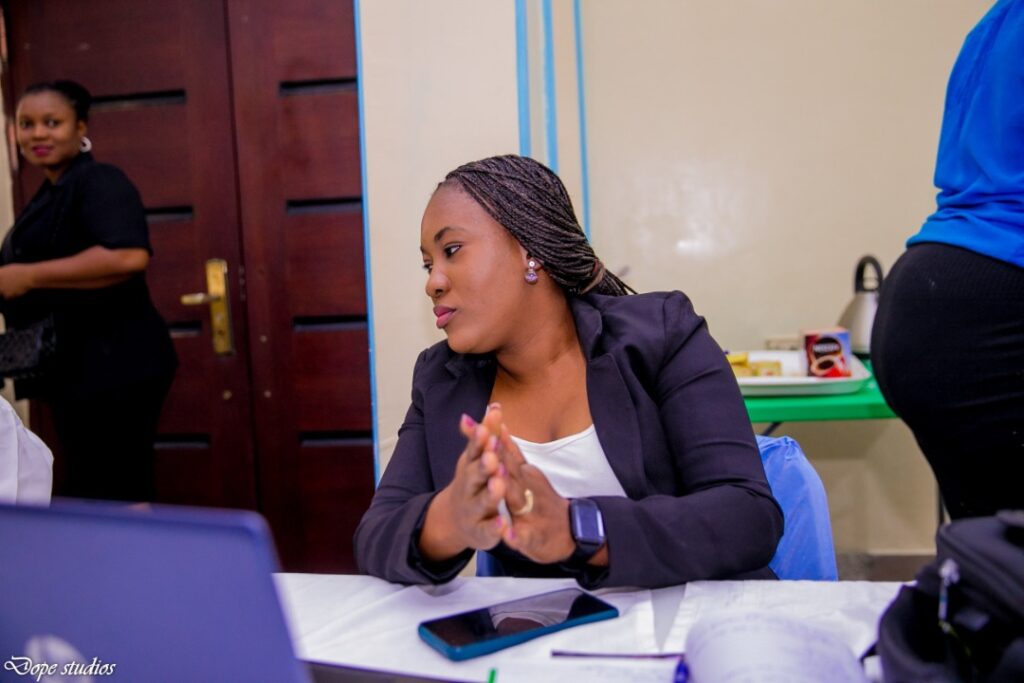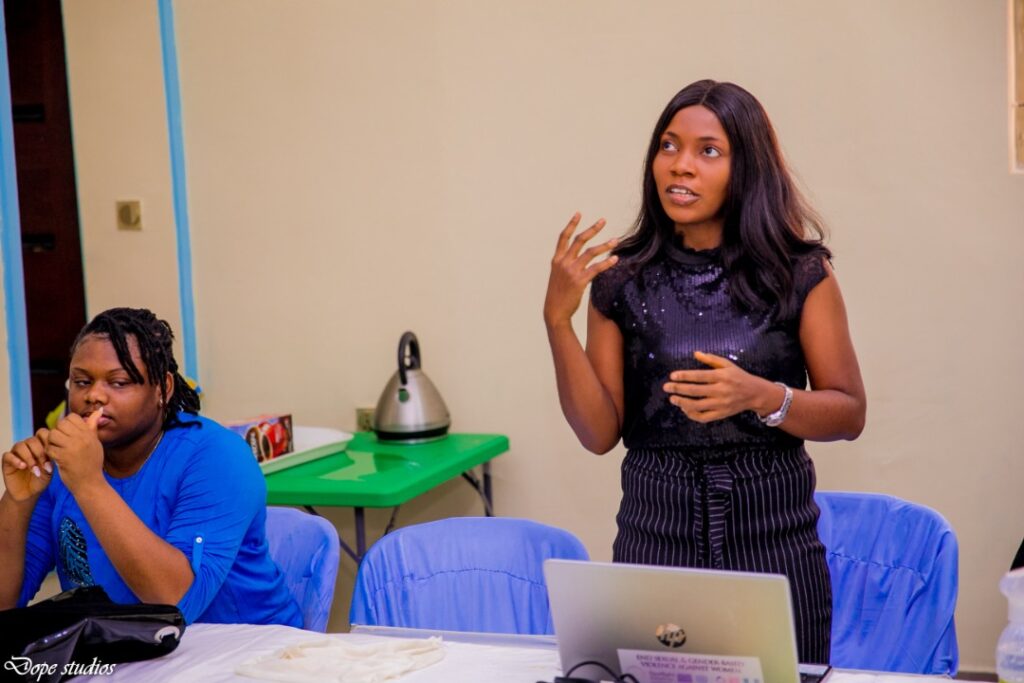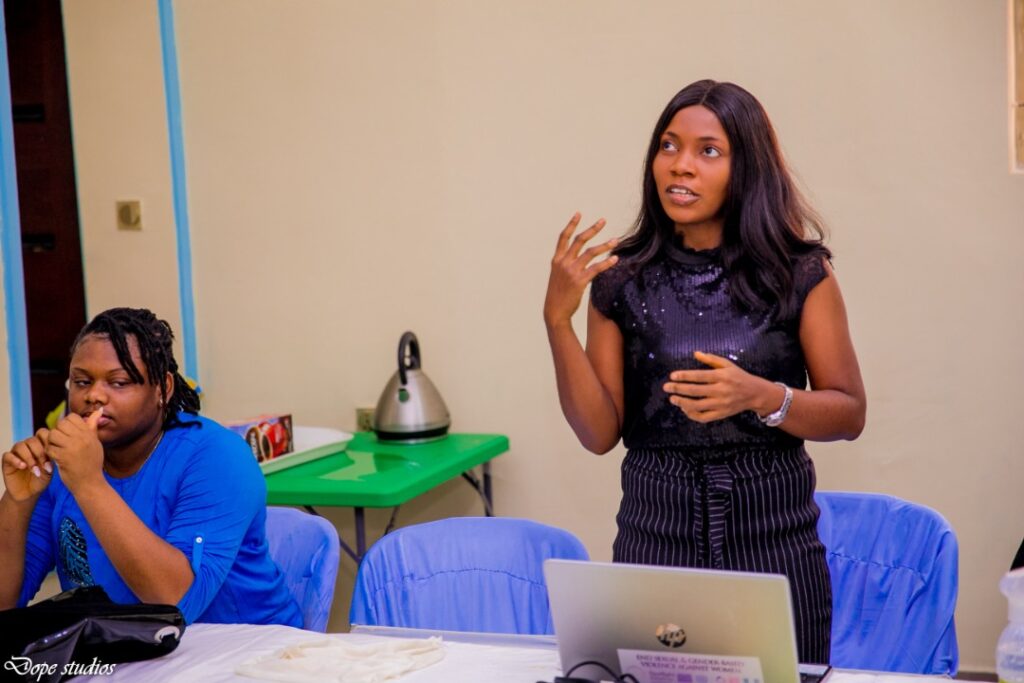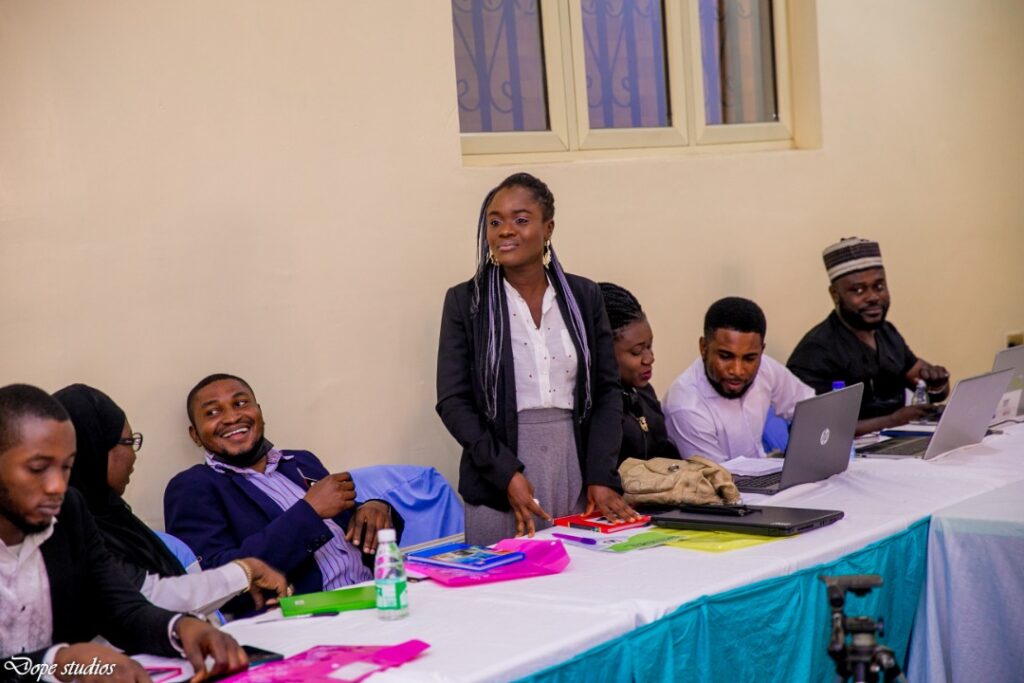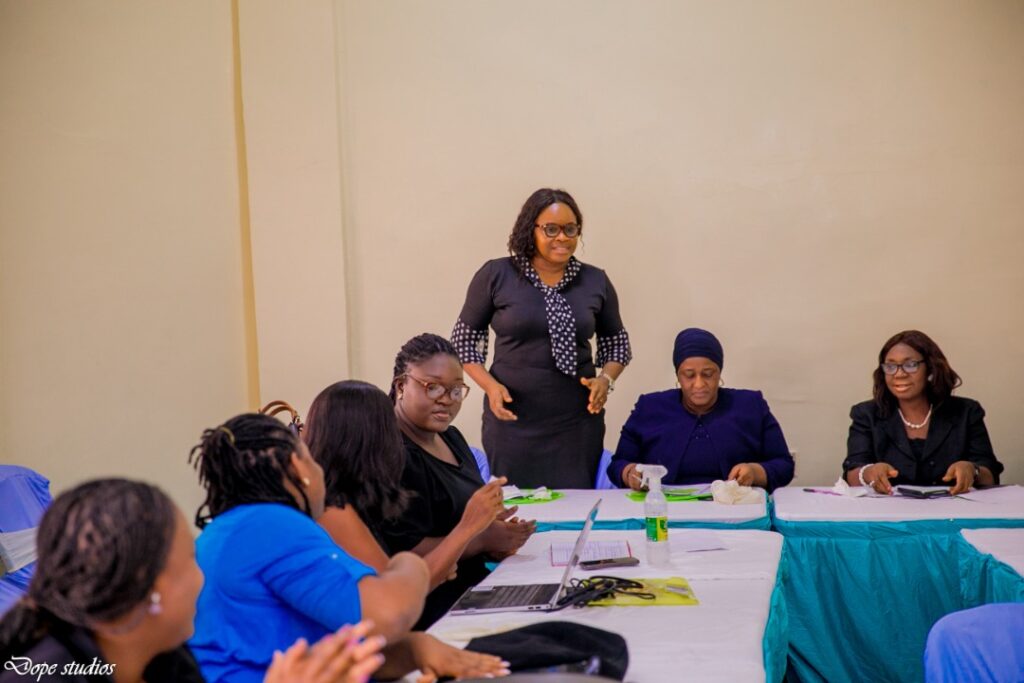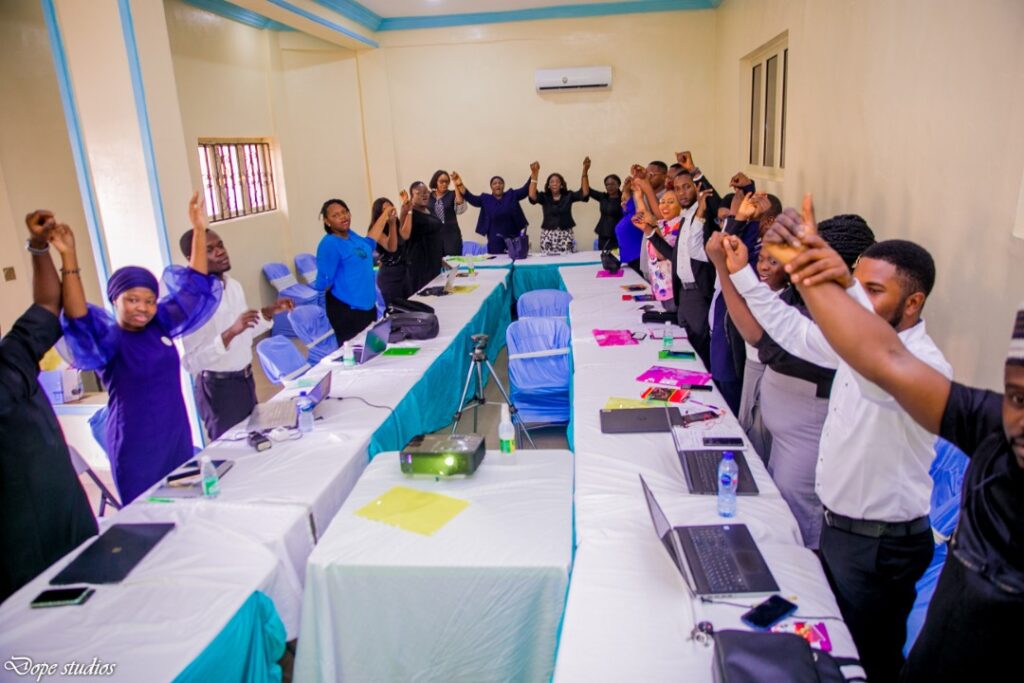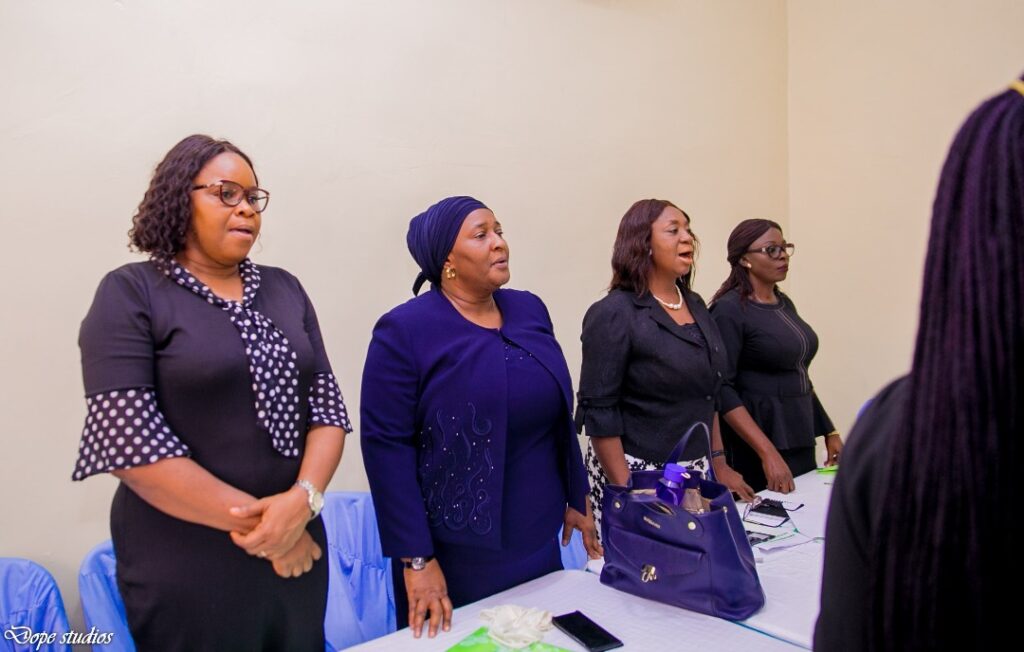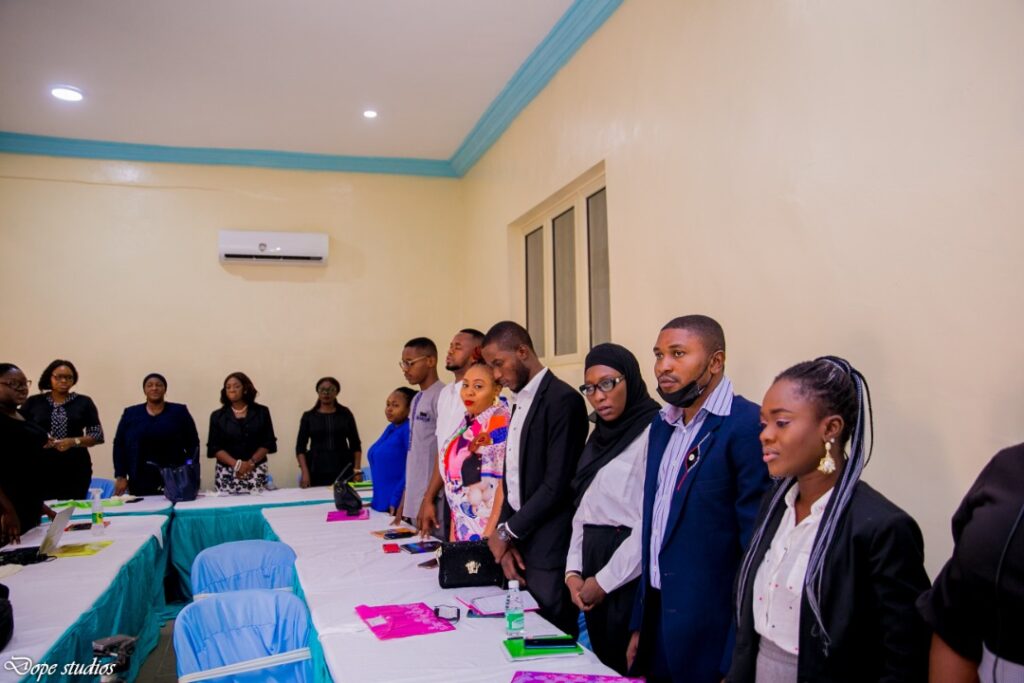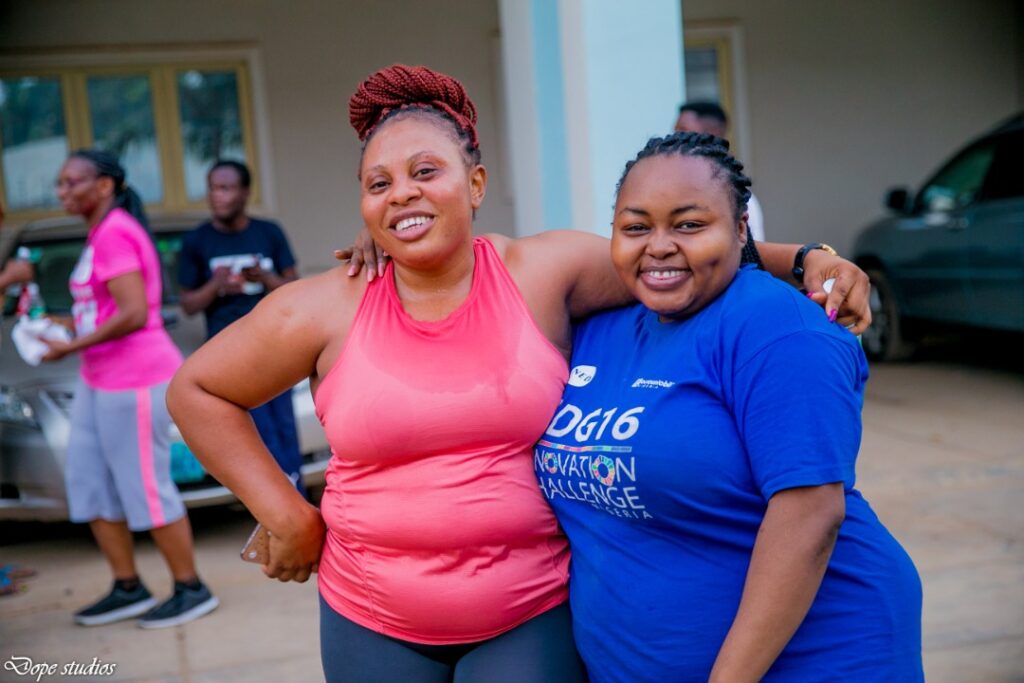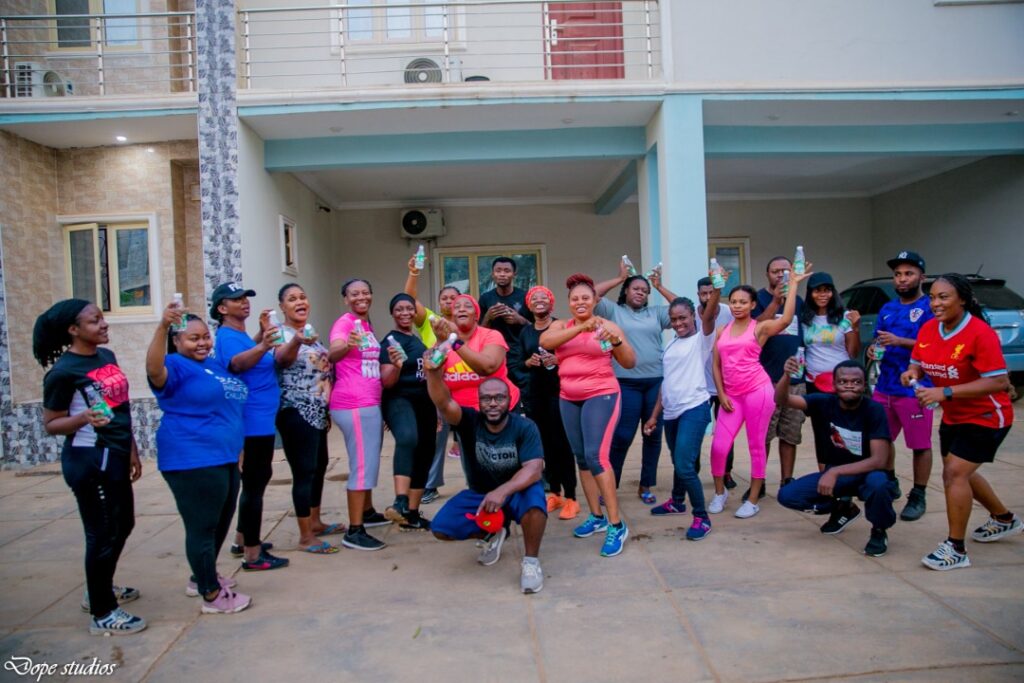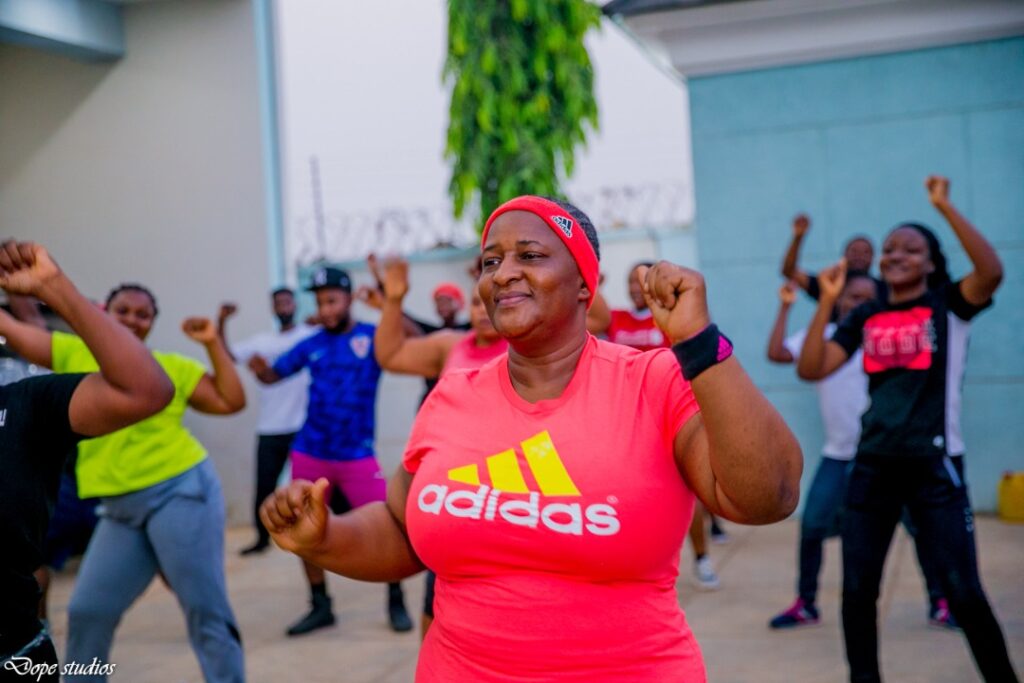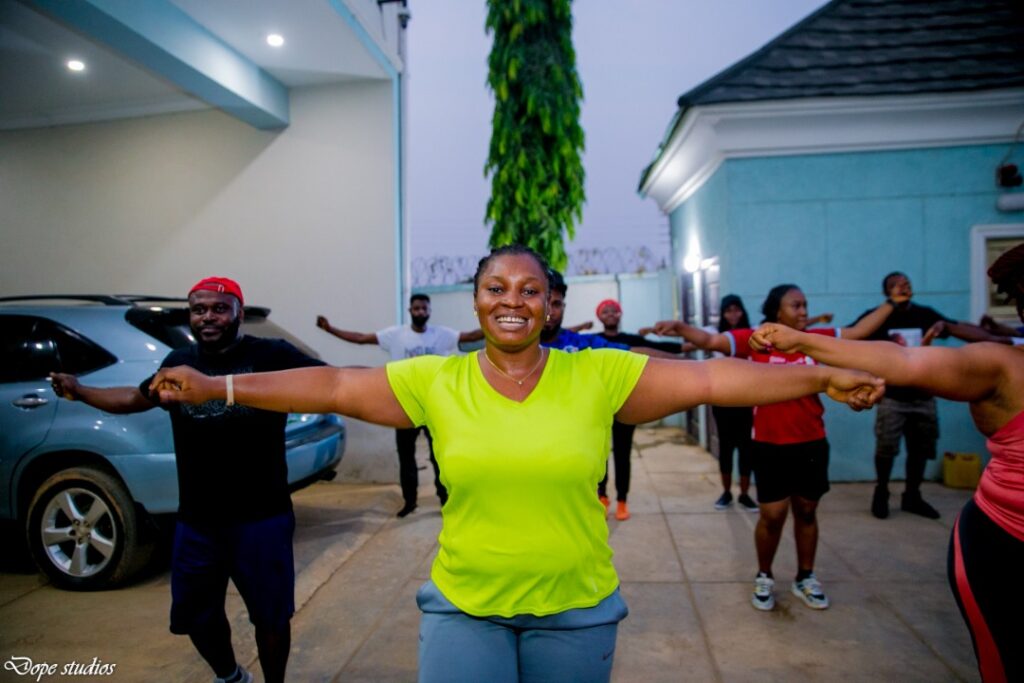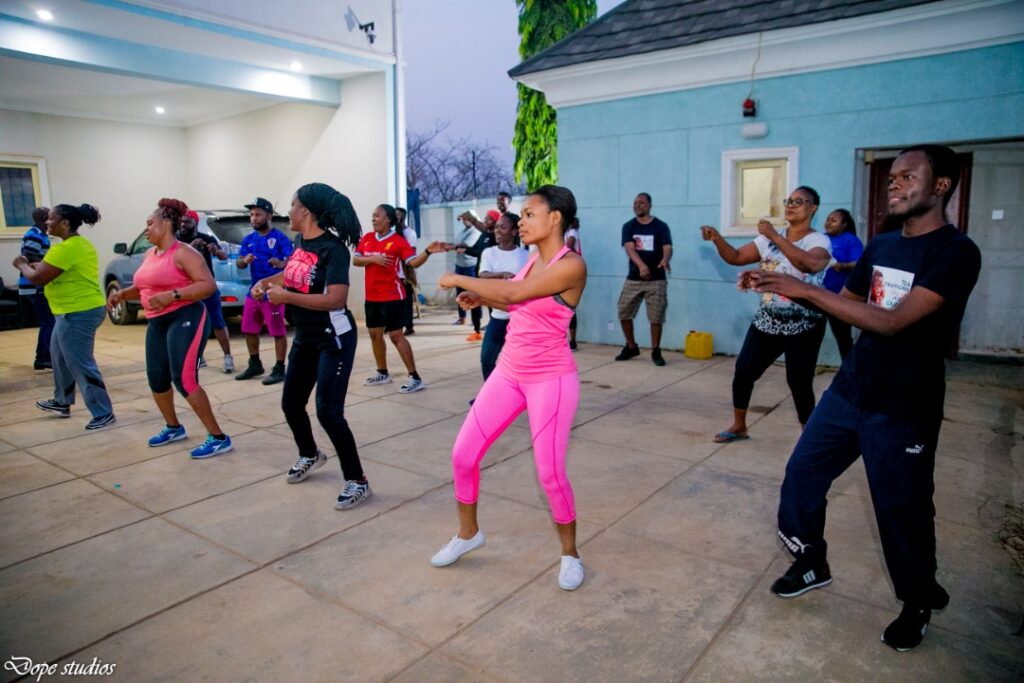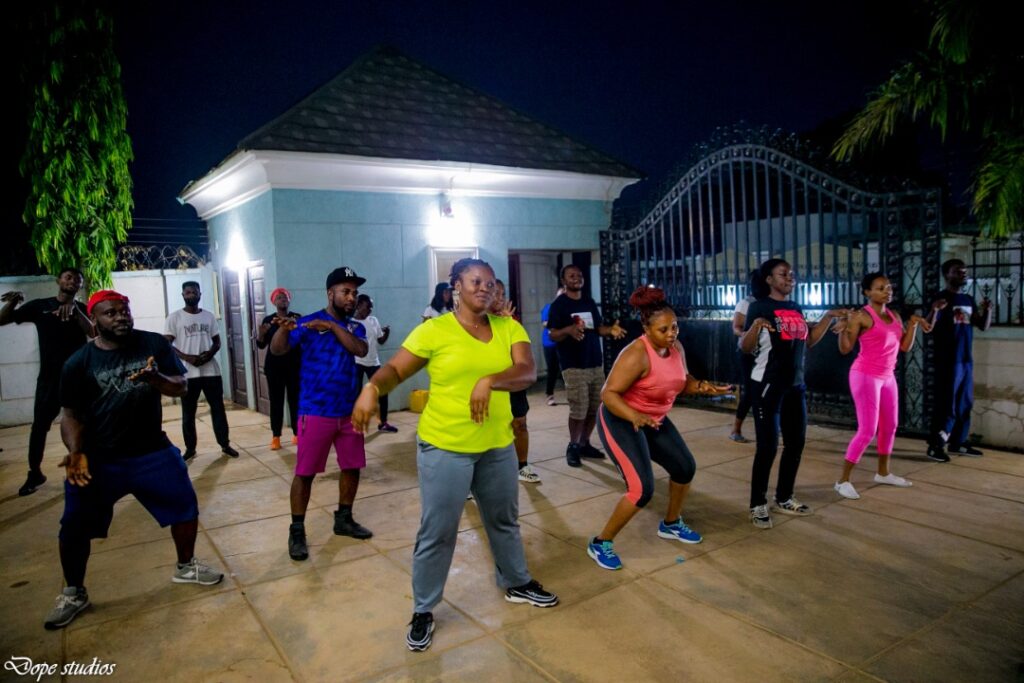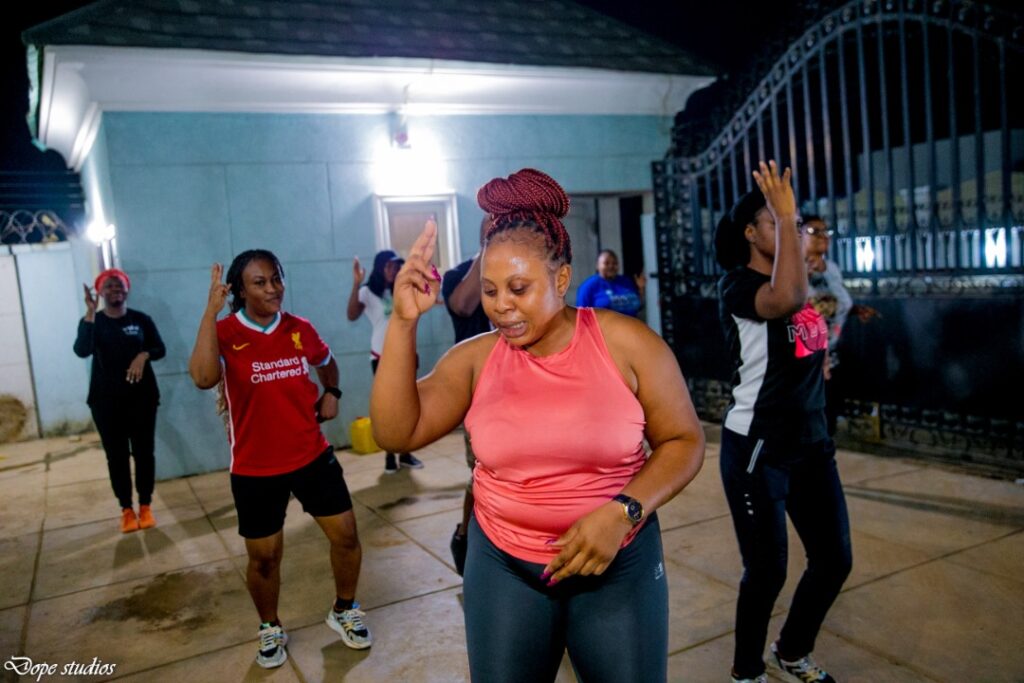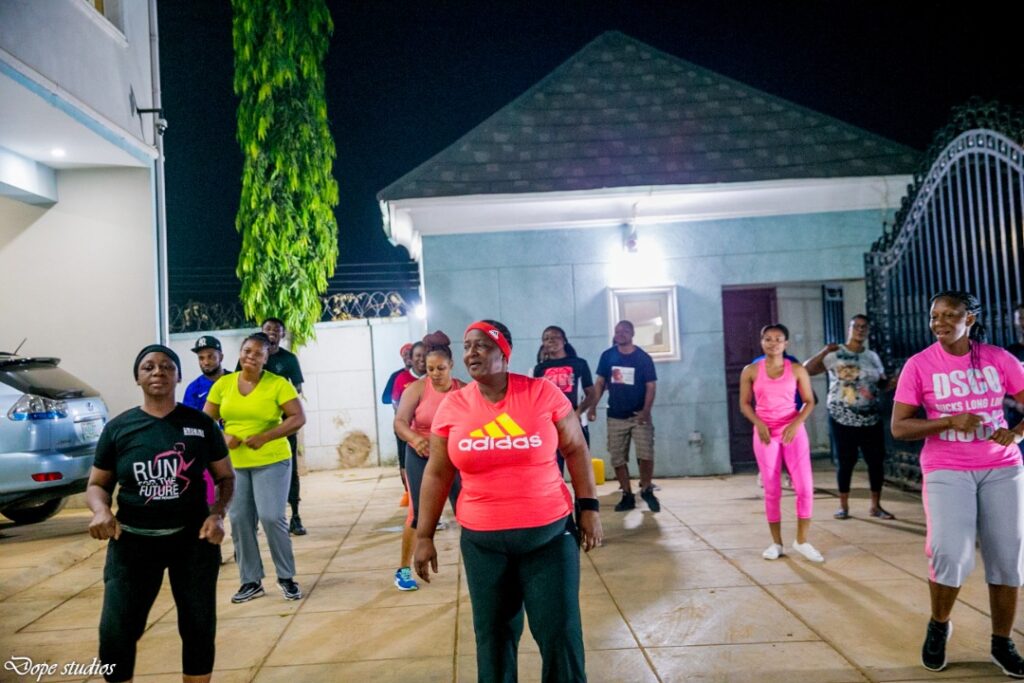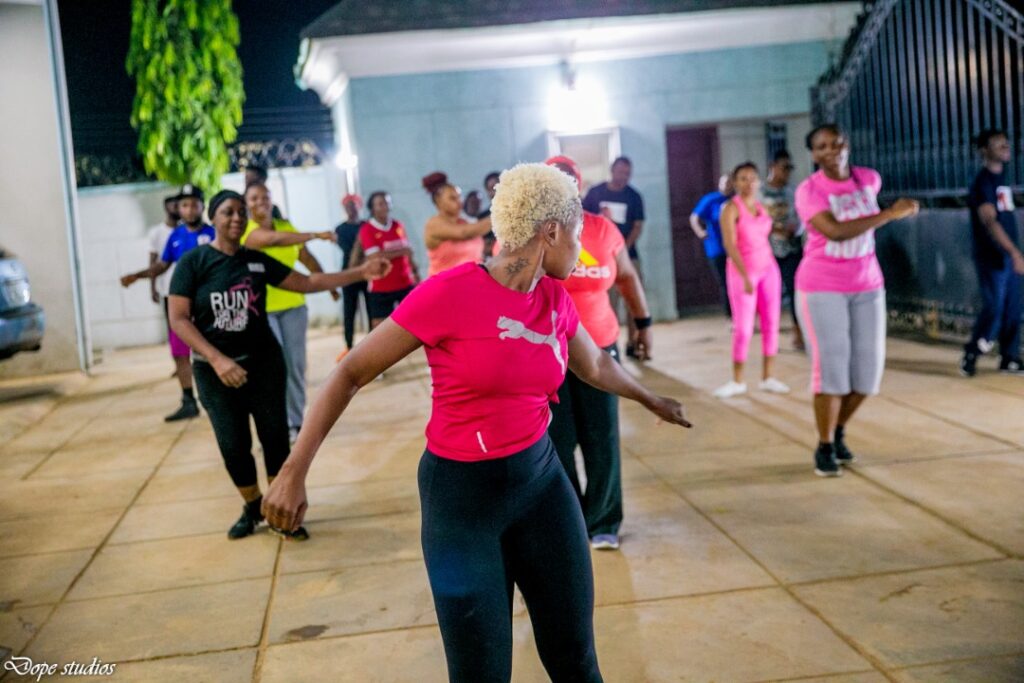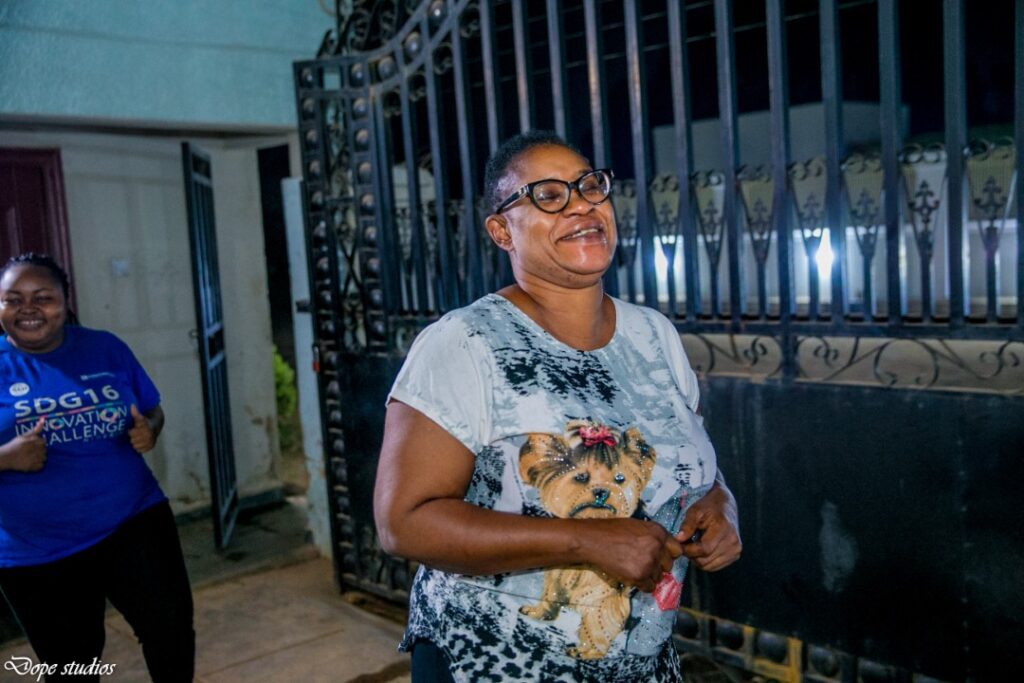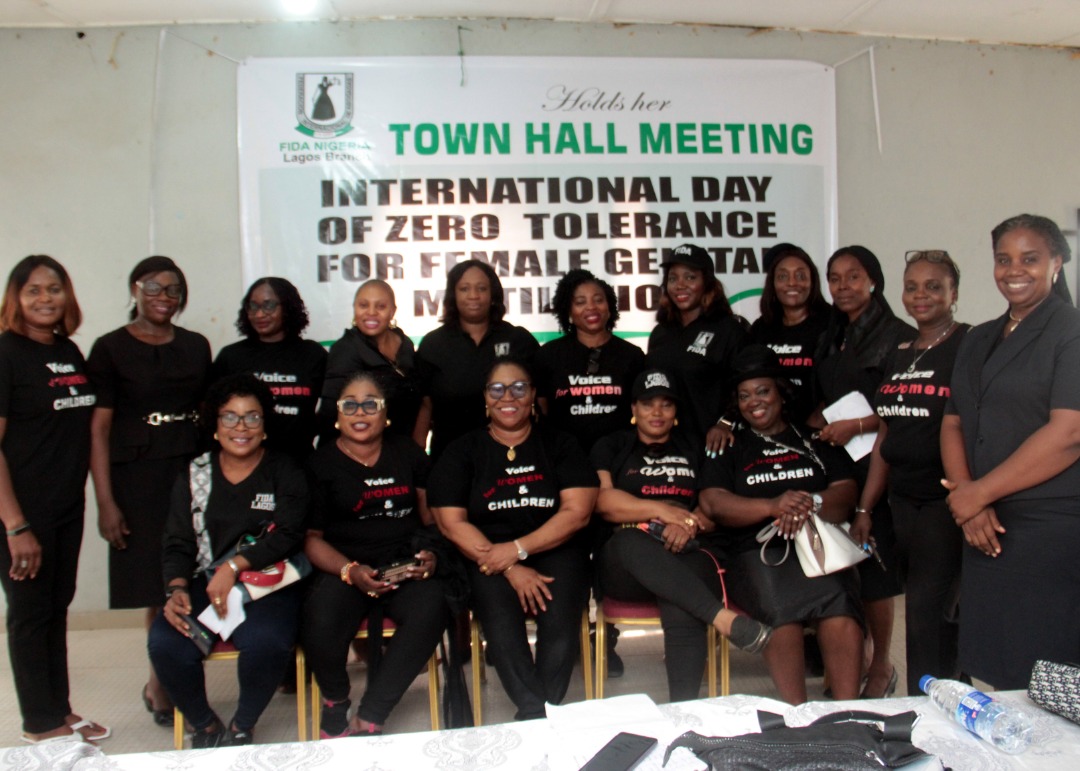
FIDA Lagos Commemorates International Day of Zero Tolerance for Female Genital Mutilation
FIDA Nigeria, Lagos State branch held her Townhall meeting which was a follow-up on the Advocacy/ Courtesy visit to the palace of Osolo of Isolo on Wednesday, 2nd of February 2022.
The town hall meeting was to mark the International Day of Zero tolerance for Female Genital Mutilation (FGM) with the theme “Accelerating investment to end female genital mutilation ”
The Chairperson, Mrs Chinwe Efobi gave a brief introduction of the significance of the day. The meeting was well attended. The Osolo of Isolo and his chiefs – in – council, iyalojas and representatives of different markets, the Youths, NURTW, palace guards etc. were all present.
A paper presentation on this year’s theme by Fidan Ifeyinwa Okpalaku and interpreted in Yoruba language by Ruth Akinwande to the participants. The Oba also spoke in Yoruba language on the harmful effects of the barbaric and harmful traditional practice and admonished his subjects to desist from such practices and also encouraged them to speak out when such is going on.
Fliers were shared to disseminate more information on the purpose of the town hall meeting. It was an interactive, impactful and successful meeting with many members of the International Federation of Women Lawyers (FIDA) Lagos State Branch present.
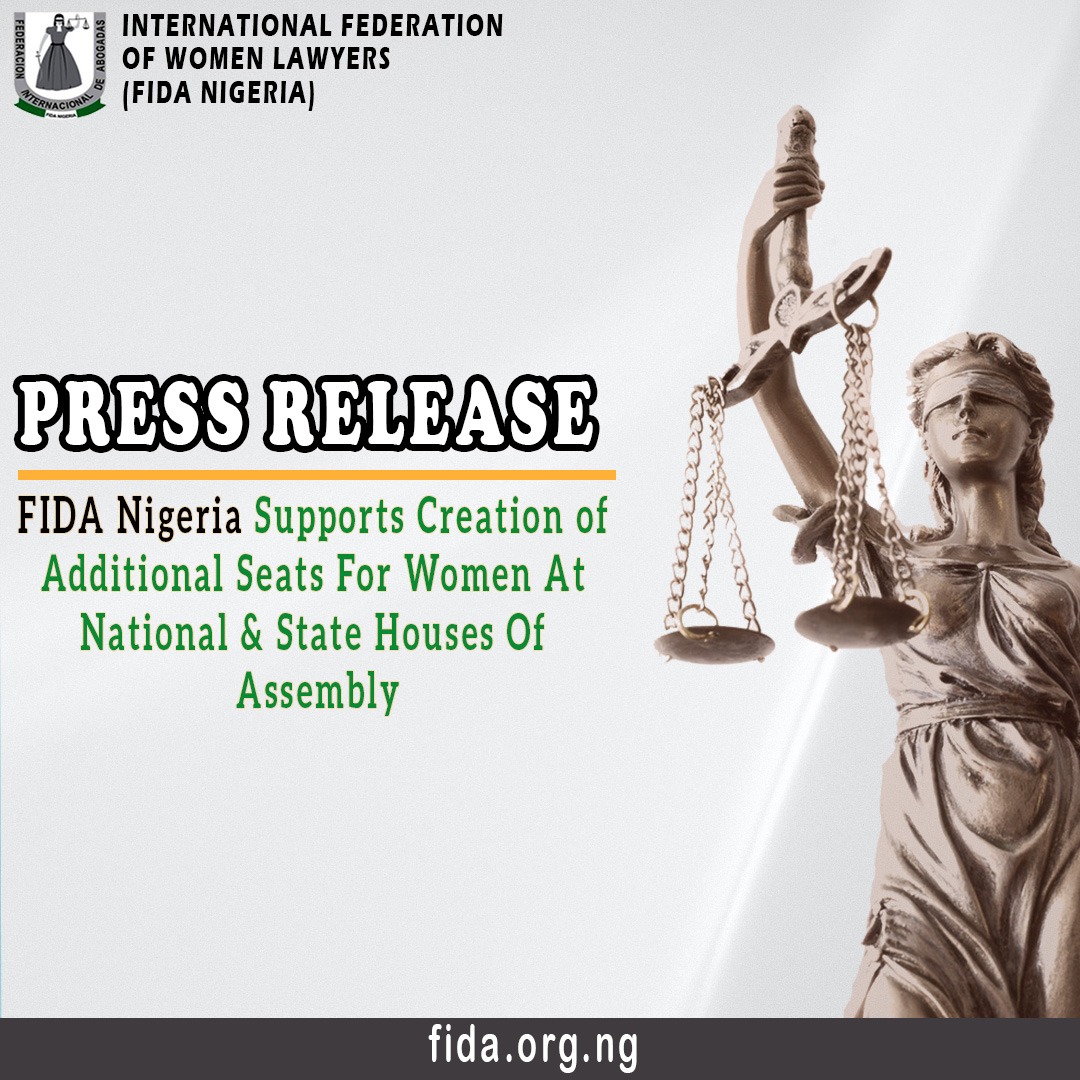
FIDA Nigeria Supports Creation of Additional Seats For Women At National & State Houses Of Assembly
FIDA Nigeria Supports Creation of Additional Seats for Women at National & State Houses of Assembly, Urges Sustained Action by Civil Society Groups on Its Ratification & Assent into Law.
The International Federation of Women Lawyers (FIDA) Nigeria commends the recommendation by the Joint Senate and House Committees on Constitution review to create one hundred & eleven (111) additional legislative seats in the National Assembly and two additional seats per senatorial zone in state Houses of Assembly and the Federal Capital Territory which will be solely occupied by women beginning from the next general election in 2023.
FIDA recognizes these recommendations from the committee as a step in the right direction even though it falls short of the 35% affirmation demand obtainable in major Democracies. We have observed that from the advent of democracy in Nigeria, Women’s participation in elective positions has been minimal which has significant and multi-dimensional implications for the democratic project in Nigeria and her continuing quest for gender equality in Africa’s biggest economy.
We note this recommendation to be a major improvement from the present scenario where only 21 out of 469 seats in the present National Assembly are occupied by women. This has placed the Nation as the worst performer in the West African Region when looking at the representation of women in parliament, and the second-worst after Eritrea in the whole of the African Continent. Furthermore, at the sub-national level, only 45 seats of the 990 seats in all State Houses of Assemblies are occupied by women which constitute about 4.5% of elected representatives.
As the 2023 general elections get closer, we kindly call on the National and State Houses of Assembly to ratify the committee’s recommendation and for the President to grant assent towards improving the inclusivity of vulnerable and marginalized groups including women in the political process & Governance in Nigeria.
FIDA Nigeria was established in 1964 with main objectives to establish friendly international relations on a basis of equality and mutual respect for all peoples, preserve the rights and welfare of women and children, realising that the happiness of the home and the strength of the society is dependent on their wellbeing and proffer advice to Government in all cases of disregard relating to women and children.
God Bless the Federal Republic of Nigeria
Signed:
Mrs. Amina Suzanah Agbaje
Country Vice President/National President
FIDA Nigeria
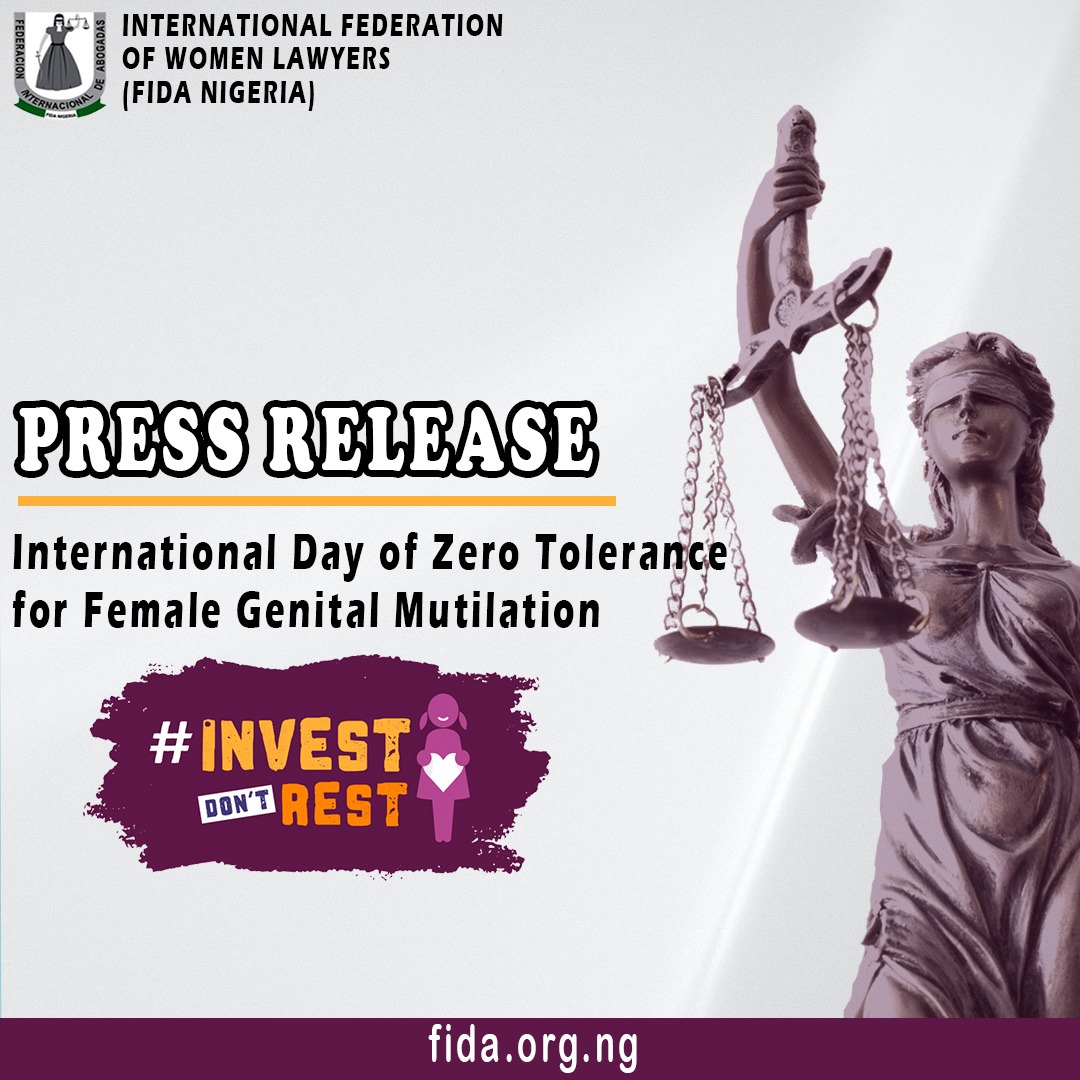
International Day of Zero Tolerance for Female Genital Mutilation
FGM is still widely practiced in different parts of the country because of varied erroneous tribal/ traditional beliefs and practices.
It is practiced based on superstitious beliefs which range from the preservation of chastity and family honor, to ensuring perceived purification and hygiene, or for the protection of virginity and prevention of promiscuity; not to mention enhancing fertility and increasing matrimonial opportunities in women.
Other fears for which its use is said to protect include – to prevent mother and child from dying during childbirth; while in some communities it enables one to inherit property if circumcised
These totally wrong beliefs (though unproven as correct) remain strongly engraved in the minds of the people and are still widely practiced in Nigeria with young girls being coerced and pressured by family members for forced circumcision. This is FGM and it is a GBV!
As the world marks the International Day for Zero Tolerance to Female Genital Mutilation, FIDA Nigeria points out the fact that these practices and beliefs which still persist must be stopped.
FIDA being steadfast in the fight to prevent and end this needless and ugly trend in Nigeria calls on all to work collectively with us to stop these myths and misinformation still very prevalent in the society
In Nigeria, 25 per cent of women and girls, aged 15-49, have undergone some form of FGM (UNFPA). This most unfortunate practice of mutilating the girl child has subjected many to physical, emotional, and psychological trauma.
Note that Section 11 of the Childs Right Act 2013 protects the right to dignity of the child, while Section 6 of the Violence Against Persons prohibition (VAPP) Act 2015, expressly prohibits FGM
With this year’s theme focused on Accelerating Investment to End Female Genital Mutilation, we encourage everyone to join this fight where we also aggressively invest in different programmes to provide support services responding to those at risk and vulnerable to such practices.
We must enforce the applicable laws while fortifying institutional capacity to address and eradicate FGM (female genital mutilation)
Girls must be informed and empowered to act fast protecting themselves; and must also be able to easily access health care and protective service when in urgent need
Additionally other activities lined up in commemoration of this day by FIDA Nigeria across her 43 branches include to carry out Advocacy visits to community leaders and persons of influence in different communities, hold town hall meetings with traditional and faith-based leaders to sensitize them on key issues and the harmful nature and dangers of FGM.
We shall continue to do all within our mandate to fight against Female Genital Mutilation and shall work to ensure that women and children can live freely in society without fear of FGM and GBV
FIDA NIGERIA stands against Female Genital Mutilation; let us Accelerate Investment to End Female Genital Mutilation!
InvestDon’tRest
EndFGM
Signed:
Mrs. Amina Suzanah Agbaje
Country Vice President/National President
FIDA Nigeria
Christiana Oyanvutu Adejumo
National Publicity Secretary
FIDA Nigeria
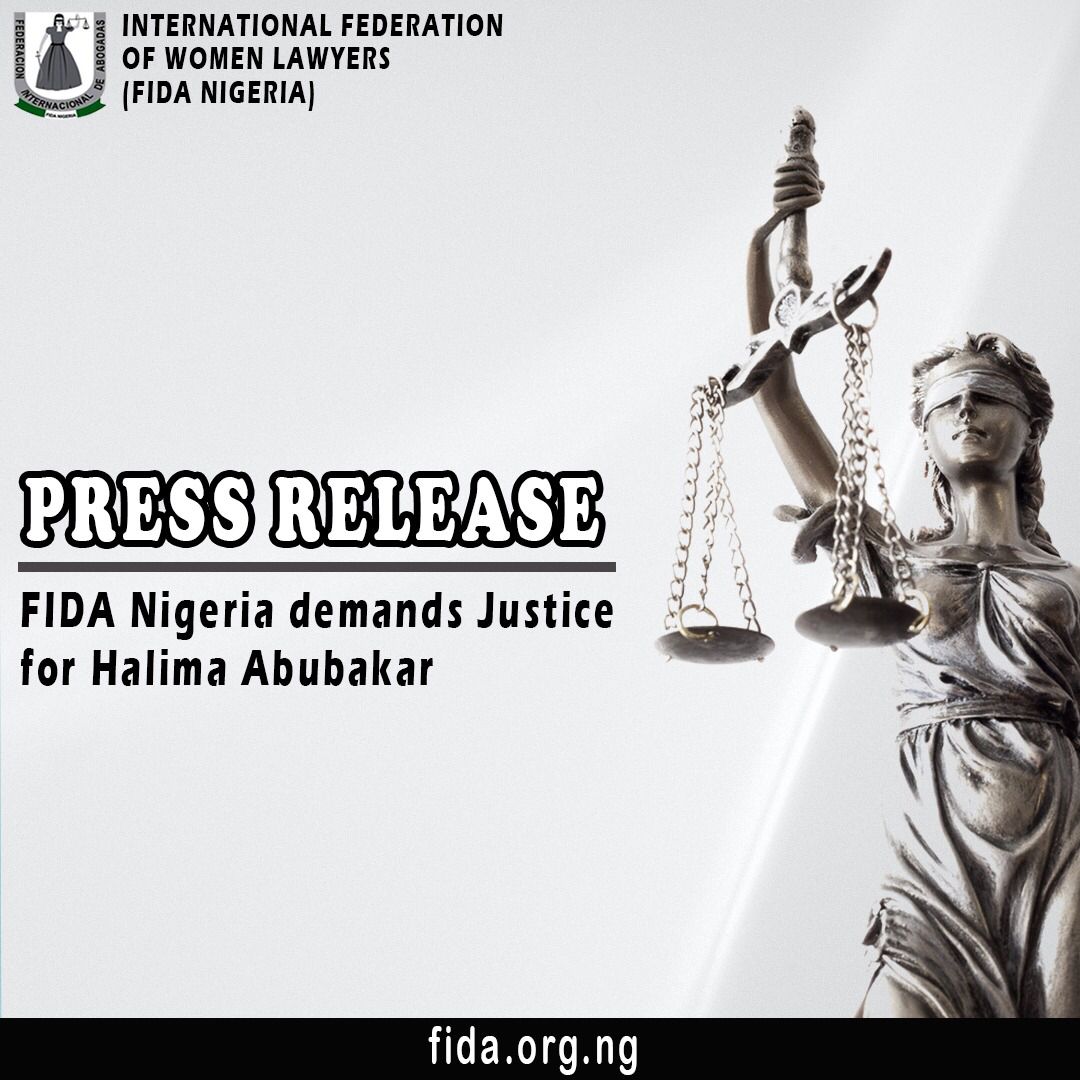
FIDA Nigeria demands justice for Hanifa Abubakar
The International Federation of Women Lawyers (FIDA) Nigeria vehemently condemns the brutal killing of five-year-old Hanifa Abubakar by her teacher and School Proprietor of Noble Kids Nursery and Primary School, Kwanana, Kano state.
Section 33 (1) of the Constitution provides for the Right to Life of everyone including that of Hanifa, and no one shall be deprived intentionally of his life unless in the execution of the sentence of a court of a criminal offence of which he has been found guilty.
Hanifa as a Nigerian child is entitled to have lived a full and beautiful life
FIDA Nigeria demands for justice for Hanifa as the above act also falls into the category of gender-based violence for which FIDA Nigeria stands against, and furthermore to serve as a deterrent to other evil-minded people who are custodians of children left in their care for educational or other purposes.
The Chairperson, FIDA Nigeria Kano State Chapter, Bilkisu Ibrahim Suleiman on Friday led a delegation of Excos to pay a condolence visit to the family of the 5-year-old murdered and mutilated victim, Hanifa Abubakar at Dakata Quarters, Nasarawa LGA, Kano State. The family was assured of FIDA’s support in the pursuit of justice
We call on the relevant Government Ministries to pay closer attention to licensed educational institutions. The increase of violence in Schools has demonstrated the importance and need to incorporate basic laws on Human Rights and the education sector into curriculums for educators for the purpose of training and retraining. There is also a need to address the accepted norm of violence in schools.
FIDA Nigeria has always resolutely stood behind justice against evil in society particularly when perpetrated against women and children.
It is sincerely hoped that with justice done in Hanifa’s case, it will greatly diminish such criminal acts in the society.
In addition, we urge the Government to ensure the passage and adoption of the Child’s Rights Act, the Violence against Person’s (Prohibition) Act (VAPP Act), 2015 and all laws that support and protect children and women in the state.
#JusticeForHanifer
Signed:
Mrs. Amina Suzanah Agbaje
Country Vice President/National President
FIDA Nigeria
Christiana Oyanvutu Adejumo
National Publicity Secretary
FIDA Nigeria
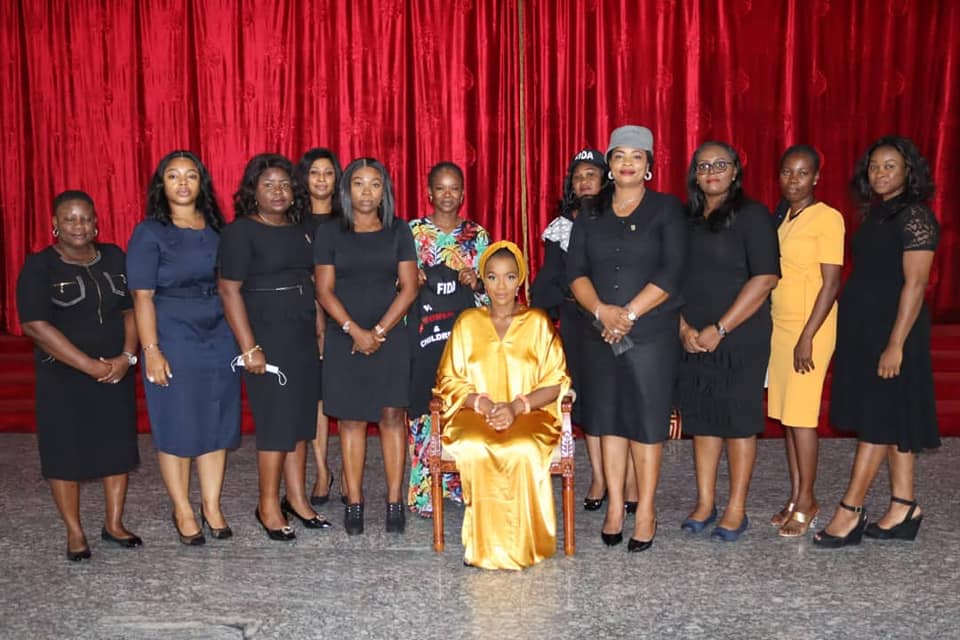
FIDA Warri Branch pays Courtesy Visit to the Olori, Wife of the Olu Of Warri, Ogiame Atuwatse III
On Thursday, 20th January, 2022 FIDA Warri Branch paid a courtesy visit to the Olori, Wife of the Olu Of Warri, Ogiame Atuwatse III. The aim of the visit was centered on advocacy and Membership drive to the Olori, Wife of Ogiame Atuwatse III, the Olu Of Warri.
The chairperson, Megbele Ogechi Jessica who led her executives and members of FIDA, Warri Chapter on the visit to Her Royal Majesty, stated that the visit was to welcome Her Royal Majesty to the kingdom, intimate her, seek collaboration with the Olori in protecting, preserving and promoting the rights of women and children in the Kingdom, as well as programmes and of FIDA aimed at impacting and bringing positive development to Warri Kingdom
The chairperson of FIDA, Warri Branch while addressing Her Royal Majesty prayed for God’s wisdom, peace, continuous protection and guidance throughout the reign of His Royal Majesty, Ogiame Atuwatse III, the Olu Of Warri. Prayers were also offered for God’s strength on Her Royal Majesty as she supports His Royal Majesty.
The Olori in her welcome address, expressed happiness over the visit of the Galant FIDA Warri Chapter ably led by the Chairperson Megbele Ogechi Jessica to her palace. Her Royal Majesty who is a Legal Practitioner also used the opportunity to reiterate and renew her commitment as a member and promised to work with FIDA for legal issues/advice from time to time.
Responding further, Her Royal Majesty, the Olori, expressed appreciation for the visit of the leaders and members of the organization to the Palace, while informing them she was a member of FIDA Lagos and also FIDA Abuja when she moved to Abuja. She further appreciated the team for identifying with her office. She described Lawyers as one of the few profession she is proud to belong to which is noble and unique profession, and proud to be a member of FIDA, a gallant association.
Her Royal Majesty has also promised to pay all her dues and support FIDA Warri, Delta State Chapter. Highlights of the event was a presentation of FIDA customized t-shirts and cap to Her Royal Majesty, the Olori by Megbele Ogechi Jessica, the Chairperson.
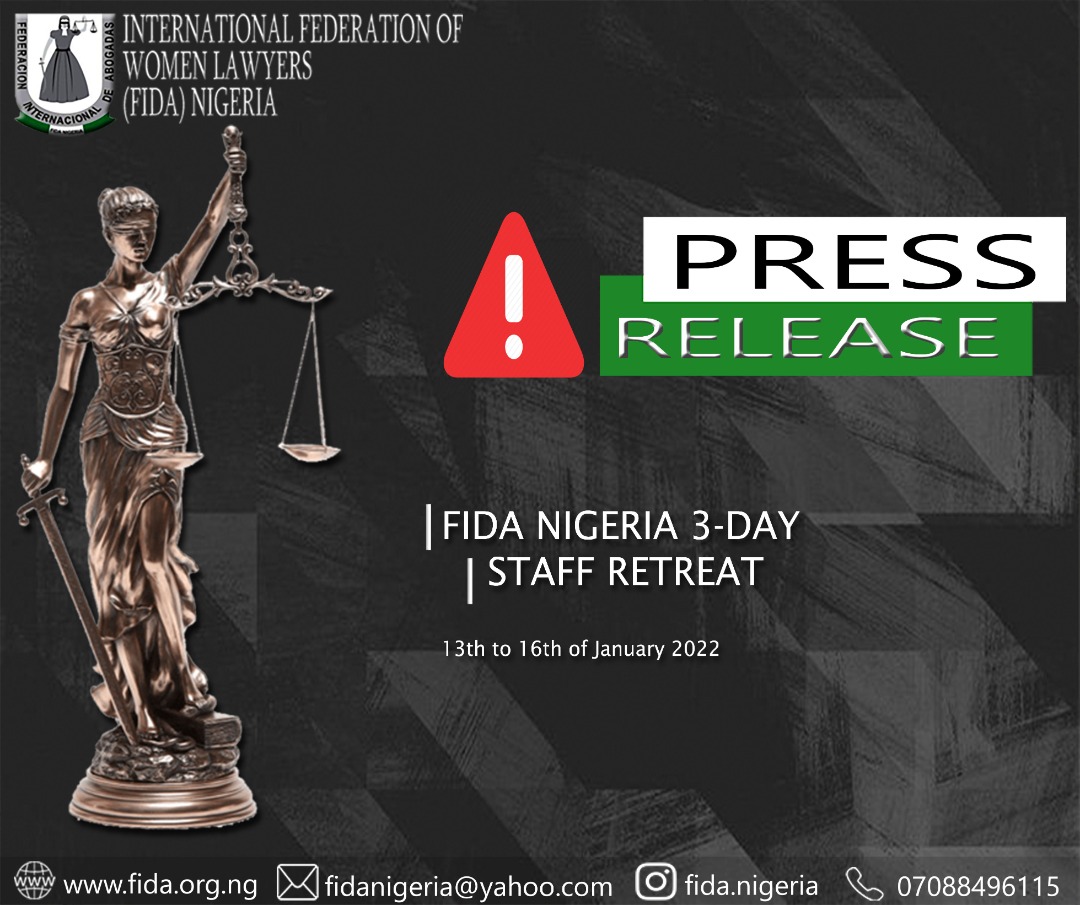
Press Release on The Retreat For National Executive Officers & Staff Of FIDA Nigeria
FIDA Nigeria held a 3-day National Executive Officers & Staff Retreat in Abuja from 13th to 16th of January 2021
The objective was to critically review current operations and performance whilst identifying critical areas requiring refocusing; it also allowed formal interaction by the new National Executive Committee with the new FIDA Nigeria Program Officers both at the national and state levels.
The retreat helped to build the capacity of staff whilst familiarizing them with FIDA Nigeria goals and policies and strengthening their capacity for effective engagement and project implementation. It served as an orientation for the newly recruited staff.
Declaring open the Retreat on Thursday, 13th January 2021, the Country Vice President Mrs. Amina Suzanah Agbaje in her opening remarks welcomed the National Executive Committee and staff, while expressing her immense gratitude for the contributions and continuous efforts made in striving towards promoting FIDA Nigeria’s developmental goals ensuring positive impact across the Nigerian society.
In attendance were the National Executive officers Deputy Country Vice President Evelyn Membere – Asimiea, National Secretary Eliana Martins Assistant National Secretary Beatrice Abongye Awah, National Financial Secretary Olubunmi Niyi-Arajuwa, National Treasurer Chineze Obianyo, National Publicity Secretary/ Editor Mrs. Christiana Oyanvutu Adejumo, National Ex Officio (CVP Emeritus) Rhoda Prevail Tyoden, ably led by the Country Vice President Mrs. Amina Suzanah Agbaje.
Erudite speakers such as Chief Mrs. Victoria Awomolo SAN and Chief Moji Makanjuola MFR, were also in attendance to deliver papers in key areas
The retreat in addition enabled a Strategic Session involving departmental (Program, Litigation, Monitoring & Evaluation, Accounts, Communications/IT and Admin) presentations by various heads of department.
At the end of the retreat the executive committee as well as all departments were effectively equipped with operational plans and approved innovations to further fuel their growth and that of the organization.
The CVP challenged staff to be continuously creative and innovative so to achieve the organizations set goals as stipulated in the FIDA Nigeria Five-Year Strategic Plan
Signed:
Mrs. Amina Suzanah Agbaje
Country Vice President/National President
FIDA Nigeria
Christiana Oyanvutu Adejumo
National Publicity Secretary
FIDA Nigeria
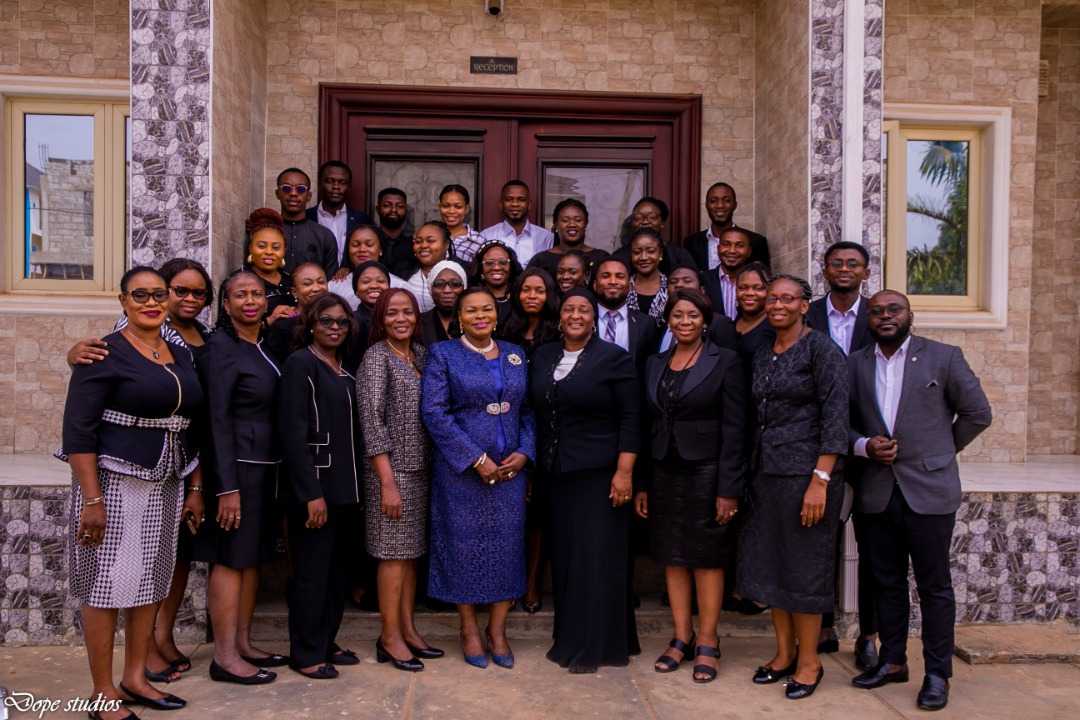
FIDA Nigeria Holds a 3-day National Executive Officers & Staff Retreat
FIDA Nigeria holds a 3-day National Executive Officers & Staff Retreat in Abuja, following the end of tenure of the previous administration and the inauguration of the new National Executive Committee; this affords the officers the opportunity of interacting as well with the new Fida Nigeria Program Officers.
Furthermore, the Retreat was aimed at building the capacity of staff both at the State and National level, to familiarise them with FIDA Nigeria’s goals, policies and her operations including strengthening their capacity for effective engagement and project implementation at State levels.
In attendance were the National Executive ably led by the Country Vice President Mrs. Amina Suzanah Agbaje, Chief Mrs. Victoria Awomolo SAN who delivered an educative paper on Effective Teamwork and Chief Moji Makanjuola MFR, who also delivered an intriguing paper on Effective Communication, Operational Skills and Tools.
The Retreat also enabled a Strategy Session; it involved departmental presentations by various heads, thereafter orientation for the newly elected officers & staff. Day one was indeed educative and engaging.
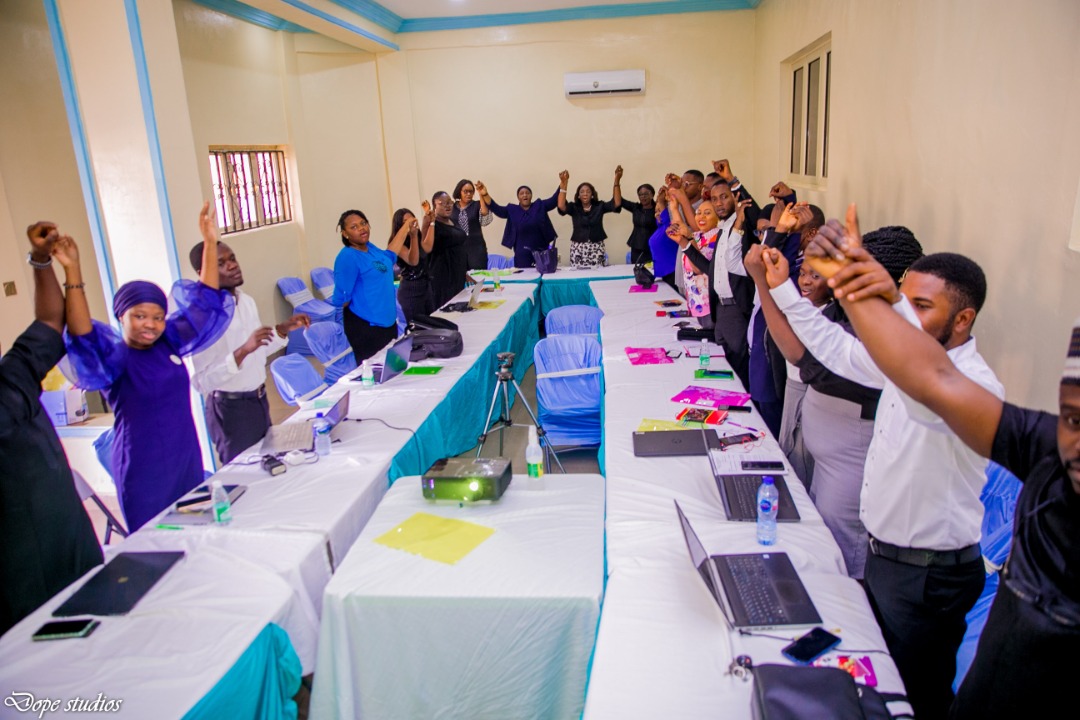
FIDA Nigeria Staff Retreat Day 2
On Saturday, 27th of November 2021; Day 2 of the FIDA Nigeria National Executive/Staff Retreat began with aerobics exercises to impress on and encourage Officers and staff on the need to always keep fit.
Through the day participants engaged in
Sectional Training and the development of an Plan of Action/Strategic Plan
The CVP Emeritus Rhoda Prevail was celebrated as it was also her birthday
The Retreat Program ended most successfully
with a positive appraisal by staff and a commitment to do great things this new year. It was indeed a memorable experience.
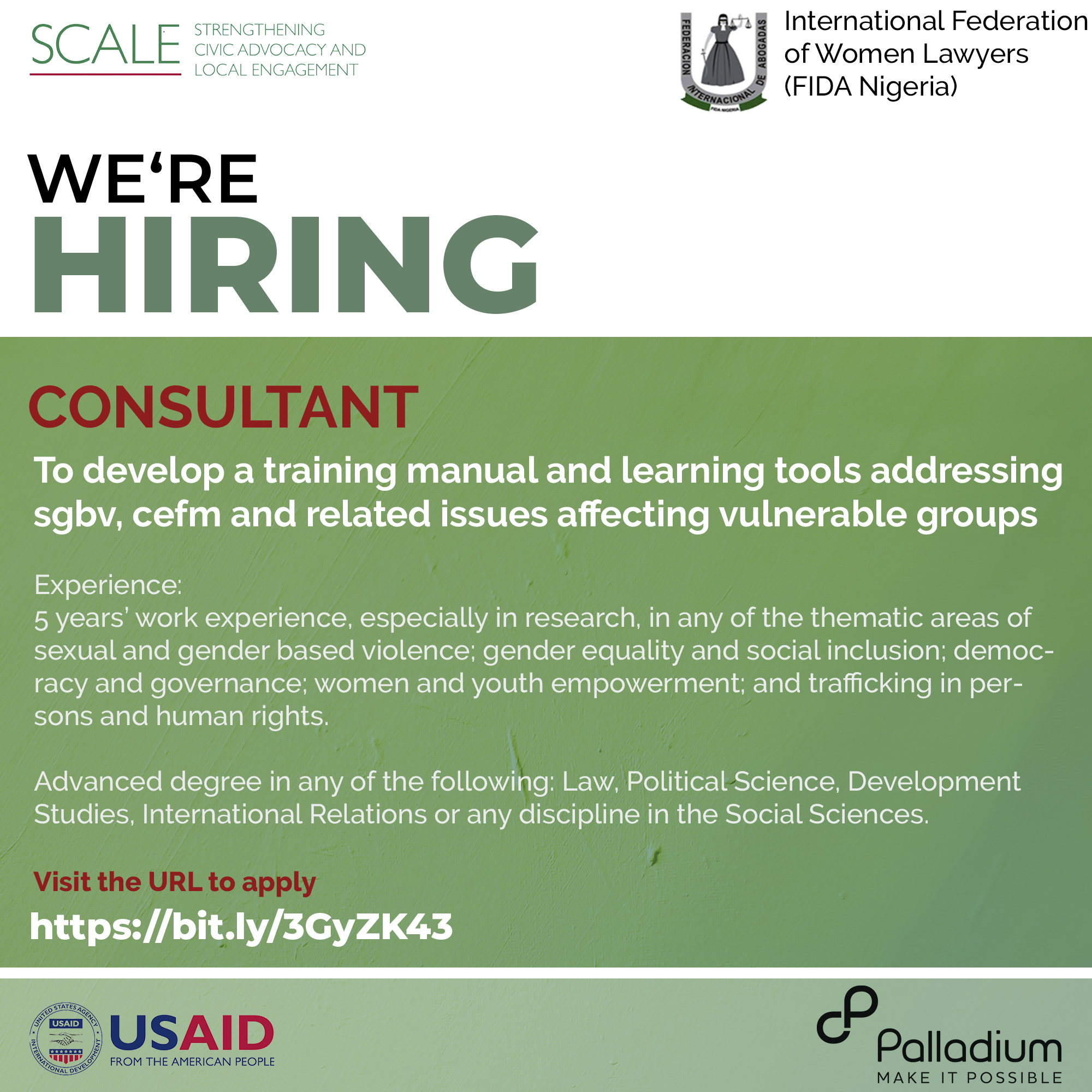
FIDA Nigeria Invites Application for a Consultant
TERMS OF REFERENCE (TOR) FOR A CONSULTANT TO DEVELOP A TRAINING MANUAL AND LEARNING TOOLS ADDRESSING SGBV, CEFM AND RELATED ISSUES AFFECTING VULNERABLE GROUPS
Introduction
The International Federation of Women Lawyers (FIDA) Nigeria is a non-profit, non-political, voluntary association of women called to the practice of law in Nigeria. Established in 1964, FIDA Nigeria’s primary role is to protect, promote and preserve the rights of women and children in Nigeria.
Its main objectives are to establish friendly international relations on a basis of equality and mutual respect for all peoples; promote the study of comparative law; promote the principles and aims of the United Nations in its legal and social aspects; enhance, promote, protect and preserve the rights and welfare of women and children, realising that the happiness of the home and the strength of the society is dependent on their wellbeing; proffer advice to Government in all cases of disregard relating to women and children. FIDA Nigeria actualises its objectives through free legal representation for indigent women, advocacy and policy campaigns, education and training, mediation and counselling services, publishing and information resources.
FIDA Nigeria was selected as a resource partner for the Strengthening Civil Advocacy and Local Engagement (SCALE) project supported by USAID through the Palladium Group. The SCALE Project presents an opportunity for FIDA to work and scale up its operations particularly in advocating for gender and child-centric protection legislations against Sexual and Gender Based Violence (SGBV); Child, Early and Forced Marriage (CEFM); Trafficking in Persons (TIP), as well as building the capacity of community based civil society organisations, and carrying out policy campaigns and sensitization activities across communities on issues affecting women, children and persons with disabilities at the state and federal levels.
In particular, the project will focus on strengthening capacity and working with stakeholders to address social norms that encourage Sexual and Gender Based Violence (SGBV) and Child, Early and Forced Marriage (CEFM) in the community; and empowering (through capacity building) community paralegals to respond to incidences of SGBV, CEFM and trafficking in persons (TIP). In the course of implementation, FIDA will engage relevant stakeholders across the target states to secure their buy-in into programme implementation and sustainable outcomes. FIDA will prioritize the identification of local civil society organisations and community based organisations for the purpose of strengthening their capacity to respond to victims/survivors psychosocial, legal aid drive key prevention interventions aimed at curbing SGBV, CEFM, TIP and related abuses that affect vulnerable groups as well as focus on examining and addressing their attitudes toward gender and GBV that may influence their ability or willingness to provide quality and unbiased services to survivors of GBV.
Situation Analysis
Nigeria ranks 128 out of 153 countries on the Gender Equality Index. The inadequate inclusion of women’s and girls’ perspectives in policy making decisions, resource allocation and implementation in economic and social sectors continues to challenge the advancement of gender equality. Over 70% of women live below the poverty line, with maternal mortality ratios at 576 per 100,000. Of the estimated 3.2 million Nigerians living with HIV, 55% are women. Enrollment of girls in school ranges from one third to one quarter of classroom participants and out of the 10.5 million out-of-school children, two-thirds are girls.
Negative social norms which condone or support violence against women and girls and harmful practices remain pervasive. Gender-based violence is widespread and 30% of women aged 15-49 have reported experiences of sexual abuse, with a marked divide between girls and women in urban (33%) and rural (24%) areas.
Nigeria has the largest number of child brides in Africa and one of the highest prevalence rates in the world: 23 million girls and women were married as children. Currently, 43% of girls are married before age 18, and 17% are married before they turn 15. Once girls in Nigeria are married, very few (1.2% of girls 15-19) use contraception or have their contraception needs met (13.1%). Nigeria accounts for the third highest number of women and girls who have undergone female genital mutilation (FGM), reported at 25% prevalence. Harmful practices occur in a context of limited knowledge and access to sexual and reproductive health and rights (SRHR) information and services, with complications of early childbearing and obstructed labour such as obstetric fistula. An estimated 20,000 new cases of obstetric fistula occur every year.
The Nigerian Government’s response has included efforts to improve its institutional and policy framework, which include the Violence against Person Prohibition (VAPP) Act,
enacted at the national level in 2015, the Child Rights Act 2003, the NAPTIP Act 2015the National Policy on the Elimination of FGM/Cutting, the National Strategy to End Child Marriage, a Road Map and National Priority Actions to End Violence Against Children which have been adopted and are being supported for implementation, the Child Rights Act, as well as several policies and frameworks for a conducive environment for women and girls’ access to quality sexual and reproductive health and rights (SRHR) information and services. As a preventive measure, the Federal Government, through the Federal Ministry of Education in collaboration with civil societies is implementing Family Life HIV Education (FLHE) to empower adolescents and young people develop the skills, knowledge, attitudes, and competences required for making the right life choices to prevent sexual and gender-based violence. Ongoing efforts to increase access to quality accessible and affordable services include the National Health Act, as well as the One Primary Health Care per ward initiative of the Federal Government.
For these initiatives to yield meaning outcomes, it is important to critically approach and understand the social drivers of SGBV, CEFM, and early adolescent pregnancy in the Nigerian context. These social drivers are religion; culture; economic hardship and poverty; war and conflict; limited opportunity for education; inability to access justice; and discriminatory or gender biased laws.
Terms of reference
In line with the capacity strengthening objective of the project, the consultant will develop a training manual and learning tools addressing SGBV, CEFM, TIP and related issues affecting vulnerable groups to guide the delivery of trainings across board. In addition, the modules of the manual will be informed by findings from the baseline, technical needs assessment and design lab with stakeholders which shall be provided to the consultant.
The content of the training manuals should include the following:
i. Capacity building on SGBV, CEFM and TIP for CSO’s (inclusive advocacy clusters) providing victim support services across target states (4 day training activity).
ii. Identification and training of community and faith leaders as SGBV, CEFM & TIP Advocates and paralegals (1 day training).
iii. Specialized CITP training of prosecutors, investigators and judges on countering TIP (5 day training activity).
iv. Training on effective monitoring, evaluation, documentation and learning approaches for CSO’s (inclusive advocacy clusters) (3 day activity).
v. Conduct training on victim centered and trauma informed shelter and case management approaches for 30 CSO’s.
In addition the manual should also contain:
• An outline of key modules relevant to SGBV, CEFM and TIP.
• The objectives for each training session.
• Simple definitions of basic concepts; charts, diagrams, tables, and explanations.
• Some policy frameworks for relevant topics.
• Practical tools and checklists.
• Case studies, simulation and other types of exercises, and role-plays. Some of these contain “Notes for the Facilitator” which are intended to assist trainers in bringing out some of the relevant issues and questions in the exercise, and in stimulating group discussion.
• Facilitation methods and techniques.
• Reference documents which are to be used by participants when doing certain exercises amongst several others.
Qualifications
- Experience:
a. 5 years’ work experience, especially in research, in any of the thematic areas of sexual and gender based violence; gender equality and social inclusion; democracy and governance; women and youth empowerment; and trafficking in persons and human rights. - Education:
Advanced degree in any of the following: Law, Political Science, Development Studies, International Relations or any discipline in the Social Sciences.
Fees
FIDA Nigeria shall pay the consultant a total sum of seven hundred thousand naira (N700,000.00) only inclusive of 5% withholding tax, for this consultancy. 50% of the amount shall be paid upon commencement of the assignment and the remaining 50% upon the submission of approved deliverables.
Qualified candidates should send curriculum vitae and cover letter addressed to the Country Vice-President/National President to hr@fida.org.ng
Subject of e-mail should be “Application for Consultant- SGBV, CEFM, TIP and related issues”.
Deadline: February 1, 2022.
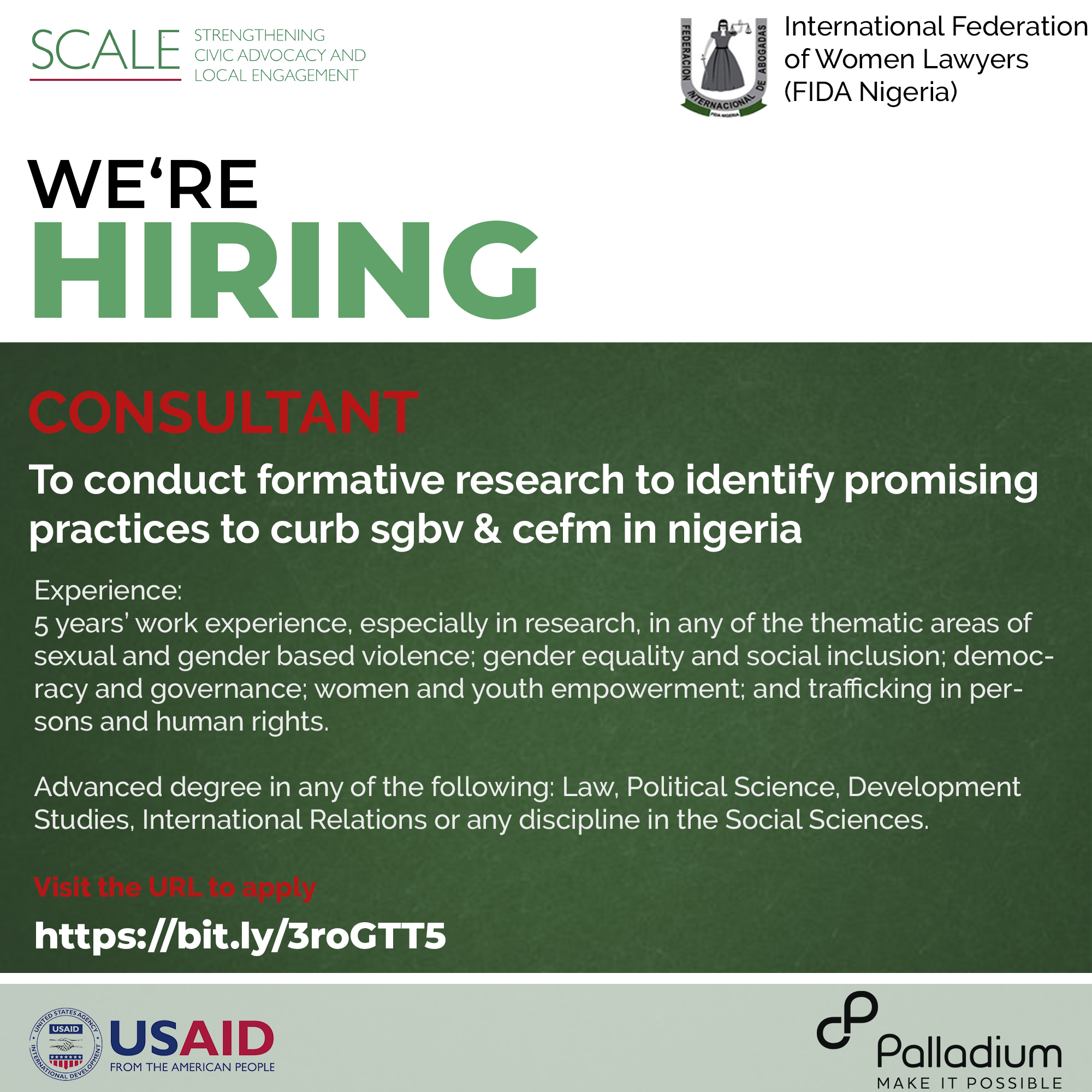
FIDA Nigeria Invites Application for a Consultant
TERMS OF REFERENCE (TOR) FOR A CONSULTANT TO CONDUCT FORMATIVE RESEARCH TO IDENTIFY PROMISING PRACTICES TO CURB SGBV & CEFM IN NIGERIA
Introduction
The International Federation of Women Lawyers (FIDA) Nigeria is a non-profit, non-political, voluntary association of women called to the practice of law in Nigeria. Established in 1964, FIDA Nigeria’s primary role is to protect, promote and preserve the rights of women and children in Nigeria.
Its main objectives are to establish friendly international relations on a basis of equality and mutual respect for all peoples; promote the study of comparative law; promote the principles and aims of the United Nations in its legal and social aspects; enhance, promote, protect and preserve the rights and welfare of women and children, realising that the happiness of the home and the strength of the society is dependent on their wellbeing; proffer advice to Government in all cases of disregard relating to women and children. FIDA Nigeria actualises its objectives through free legal representation for indigent women, advocacy and policy campaigns, education and training, mediation and counselling services, publishing and information resources.
FIDA Nigeria was selected as a resource partner for the Strengthening Civil Advocacy and Local Engagement (SCALE) project supported by USAID through the Palladium Group. The SCALE Project presents an opportunity for FIDA to work and scale up its operations particularly in advocating for gender and child-centric protection legislations against Sexual and Gender Based Violence (SGBV); Child, Early and Forced Marriage (CEFM); Trafficking in Persons, as well as building the capacity of community based civil society organisations, and carrying out policy campaigns and sensitization activities across communities on issues affecting women, children and persons with disabilities at the state and federal levels.
In particular, the project will focus on strengthening capacity and working with stakeholders to address social norms that encourage Sexual and Gender Based Violence (SGBV) and Child, Early and Forced Marriage (CEFM) in the community; and empowering (through capacity building) community paralegals to respond to incidences of SGBV, CEFM and trafficking in persons (TIP). In the course of implementation, FIDA will engage relevant stakeholders across the target states to secure their buy-in into programme implementation and sustainable outcomes. FIDA will prioritize the identification of local civil society organisations and community based organisations for the purpose of strengthening their capacity to respond to victims/survivors psychosocial, legal aid drive key prevention interventions aimed at curbing SGBV, CEFM, TIP and related abuses that affect vulnerable groups as well as focus on examining and addressing their attitudes toward gender and GBV that may influence their ability or willingness to provide quality and unbiased services to survivors of GBV.
Situation Analysis
Nigeria ranks 128 out of 153 countries on the Gender Equality Index. The inadequate inclusion of women’s and girls’ perspectives in policy making decisions, resource allocation and implementation in economic and social sectors continues to challenge the advancement of gender equality. Over 70% of women live below the poverty line, with maternal mortality ratios at 576 per 100,000. Of the estimated 3.2 million Nigerians living with HIV, 55% are women. Enrollment of girls in school ranges from one third to one quarter of classroom participants and out of the 10.5 million out-of-school children, two-thirds are girls.
Negative social norms which condone or support violence against women and girls and harmful practices remain pervasive. Gender-based violence is widespread and 30% of women aged 15-49 have reported experiences of sexual abuse, with a marked divide between girls and women in urban (33%) and rural (24%) areas.
Nigeria has the largest number of child brides in Africa and one of the highest prevalence rates in the world: 23 million girls and women were married as children. Currently, 43% of girls are married before age 18, and 17% are married before they turn 15. Once girls in Nigeria are married, very few (1.2% of girls 15-19) use contraception or have their contraception needs met (13.1%). Nigeria accounts for the third highest number of women and girls who have undergone female genital mutilation (FGM), reported at 25% prevalence. Harmful practices occur in a context of limited knowledge and access to sexual and reproductive health and rights (SRHR) information and services, with complications of early childbearing and obstructed labour such as obstetric fistula. An estimated 20,000 new cases of obstetric fistula occur every year.
The Nigerian Government’s response has included efforts to improve its institutional and policy framework, which include the Violence against Person Prohibition (VAPP) Act,
enacted at the national level in 2015, the National Policy on the Elimination of FGM/Cutting, the National Strategy to End Child Marriage, a Road Map and National Priority Actions to End Violence Against Children which have been adopted and are being supported for implementation, the Child Rights Act, as well as several policies and frameworks for a conducive environment for women and girls’ access to quality sexual and reproductive health and rights (SRHR) information and services. As a preventive measure, the Federal Government, through the Federal Ministry of Education in collaboration with civil societies is implementing Family Life HIV Education (FLHE) to empower adolescents and young people develop the skills, knowledge, attitudes, and competences required for making the right life choices to prevent sexual and gender-based violence. Ongoing efforts to increase access to quality accessible and affordable services include the National Health Act, as well as the One Primary Health Care per ward initiative of the Federal Government.
For these initiatives to yield meaning outcomes, it is important to critically approach and understand the social drivers of SGBV, CEFM, and early adolescent pregnancy in the Nigerian context. These social drivers are religion; culture; economic hardship and poverty; war and conflict; limited opportunity for education; inability to access justice; and discriminatory or gender biased laws.
Terms of reference
Addressing the complex and deep-rooted drivers of SGBV and CEFM in Nigeria requires a holistic and integrative approach that is built on evidence of what works not mere assumptions. To this end, the consultant will carry out a formative research that will result in the following outcomes:
• Understanding of the current sector issues and contribute to the design of effective programs curbing SGBV and CEFM
• Identify promising practices to shift cultural and social norms that drive SGBV and CEFM, focusing on how strategies can mobilize vulnerable populations, communities, and government actors to work together to address gender equality and social inclusion (GESI) issues at community, state, and federal levels
The outcomes of the research will be shared with critical stakeholders especially SCALE resource partners and CSOs clusters working on SGBV, CEFM and vulnerable populations to provide necessary evidence for designing effective interventions and advocating for relevant policy reforms.
Qualifications
- Experience:
a. 5 years’ work experience, especially in research, in any of the thematic areas of sexual and gender based violence; gender equality and social inclusion; democracy and governance; women and youth empowerment; and trafficking in persons and human rights. - Education:
Advanced degree in any of the following: Law, Political Science, Development Studies, International Relations or any discipline in the Social Sciences.
Qualified candidates should send curriculum vitae and cover letter addressed to the Country Vice-President/National President to fidanigeria@yahoo.com.
Subject of e-mail should be “Application for Formative Research Consultant”.
Deadline: January 21, 2022.


